LIFETIME ROOF APPOINTMENTS AVAILABLE ANYTIME IN 2024! CLICK HERE TO CONTACT US

- Photos & Videos
- Upcoming Events


Welcome to PRO-TEK RV Service
The Highest Quality RV Parts and Services around!
Helpful Documents
AM&I Report (pdf)
LTR Compatability (pdf)
Pro-Tek Parts Return Policy (pdf)
Bedcovers We Offer (pdf)
Pro-Tek Brochure (pdf)
Homemade Gifts AT Pro-Tek (pdf)
Camper Winterization Information can be found under Q&A section. There is also a link to our how to winterize video!
Knowledgable staff, we have you covered.
The staff at our shop has many years of RV and coating experience. We are certified and going through continuous training to keep up with the ever changing technology enhancements. We are dedicated to finding high-quality replacement parts for each of our customers.
Whether you're coming in for a Lifetime RV Roof, repair work, extended warranty work, or just parts and accessories. We promise that you will be completely satisfied, with our products and service to ensure your peace of mind. Our parts are name brand and quality parts only.
Our Quality Promise
We're committed to providing a stress-free experience to both new and returning customers. Our shop only sources parts from reputable brands to ensure that your RV is always ready to go.
A Place You Can Trust
We know that the auto industry has a reputation of overcharging and up-selling unneeded parts and services. To ensure we're a place you can trust, we operate with complete transparency. All of our prices are listed with the price we paid for the parts and all our services are broken down by action so you know where your money is going. Ou
We know that the auto industry has a reputation of overcharging and up-selling unneeded parts and services. To ensure we're a place you can trust, we operate with complete transparency. All of our prices are listed with the price we paid for the parts and all our services are broken down by action so you know where your money is going. Our goal is to build a relationship spanning the life of your camper or vehicle.
Our techs work at their best to care for your camper, and to make it look better than when it came in. They also have continuing education to keep up with the new styles and changing parts. Knowledge is necessary to delivery quality customer service.
Fast Shipping
We know when you order a part for your car, you need it fast! Our camper parts can typically be here in a day or two! Need any truck accessories like hitches or bedcovers? We get deliveries on Tuesdays and Thursdays.
Leave a review!
Facebook page: protek service.
Leave us a review of what you thought about our work and customer service! We try to do our best to help ever customer in the best and easiest way possible. We love seeing happy campers!
Also, check out our video on Camper Winterization! We do our best to post helpful videos like tips and tricks.
Testimonials
"We are a small group that came down to Houma to haul equipment for Hurricane Ida cleanup. We needed fresh water for our camper and calling locally most RV services were closed. Pro-Tek went above and beyond by making a special trip over and filling up a couple of our units with fresh water. That night we had showers!! Needed another par
"We are a small group that came down to Houma to haul equipment for Hurricane Ida cleanup. We needed fresh water for our camper and calling locally most RV services were closed. Pro-Tek went above and beyond by making a special trip over and filling up a couple of our units with fresh water. That night we had showers!! Needed another part for our water heater and on a Saturday afternoon the owner came by with the part and still hasn't asked for payment. Great people! They are helping us because we are helping them. Much Love and Respect....
Hannon Hauling LLC"
"I had a roof issue with the factory roof on my travel trailer. I brought my travel trailer into protek. I had the life time spray on roof done on my unit. The roof looks great now!! Worry free, life time warranty!! I had the roof done light gray and the vents and ac cover sprayed black it looks Awesome. Very thick and durable 110% impressed!"
"The best around and they treat their customers right! Pro-Tek is the only company I send my friends to! "
"Called to get a hitch for my truck and a bed liner, had the bed liner and hitch in within the same week of calling and they kept me informed of when it would be done. Bed liner has a nice finish and is thick enough to not worry about throwing anything in the bed. Great service, great price."
PRO-TEK, LLC
3274 West Main St. Gray, LA 70359 US
(985) 262-8757
Copyright © 2024 PRO-TEK, LLC - All Rights Reserved.
Powered by GoDaddy

RV Extended Warranties. Are They Worth it? 2024 Update
- by Marc Bennett
- Updated: February 1, 2024
- 90 Comments
This post may contain affiliate links .
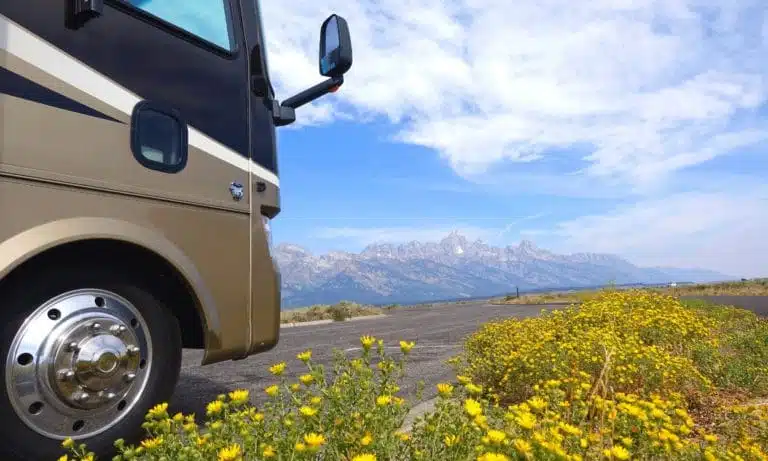
Are RV Extended Warranties worth it? If there is one thing more stressful than having something break on your RV, it’s worrying about how much the repair is going to cost you! Especially if you don’t have a stash of cash sitting around and waiting for your RV rainy day. Breakdowns, mechanical failures, and appliances that quit working are all part of the RV “adventure.”
We have certainly had our fair share of ‘adventures’ regarding RV repairs and breakdowns! Both with and without an RV extended warranty. We cover these in our in-depth expense report on the real cost of RV ownership after six years of full-time RVing and two motorhomes. And also our Full-time versus Part-time RV Ownership comparison report .
RV repairs can get expensive, stressful, and take some of the fun out of your RV lifestyle. That’s where an RV Extended Warranty may be worth considering – as a way of protecting you against these kinds of unknowns and hefty repair bills. But they aren’t exactly cheap. This brings us to the million-dollar question. Are they worth it?
The short answer is YES. But to learn more about why we think this, based on personal experience, please continue reading and jump to a section below in the table of contents.
Quick links to sections of this article:
- What is an RV Extended Warranty?
- What risks are involved traveling with or without an RV extended warranty?
- Our personal experience
- How to choose an RV Extended Warranty
- The RV Extended Warranty we recommend
- Get an obligation free quote on an RV extended warranty
- APRIL SPECIAL OFFER: Get a free 1 year Roadside Assistance Membership
RV Extended Warranty, RV Warranty, RV Extended Service Contract, and RV Extended Service Plan. These are all names for the same thing. We’ll mainly use the term most commonly used – RV Extended Warranty – throughout this article.
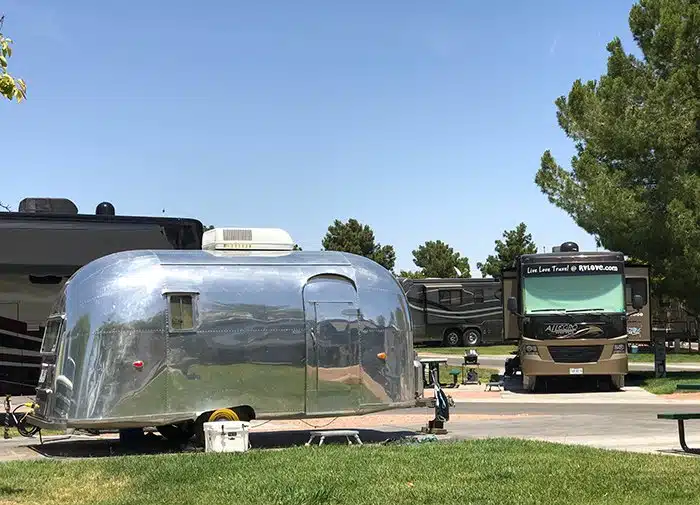
What does an RV Extended Warranty cover?
An RV Extended Warranty is designed to cover mechanical and electrical breakdowns and repairs on your RV. Things like the repair costs of slide-outs, furnaces, air conditioners, water heaters, appliances, engines, etc.
An exclusionary policy will cover everything (non-maintenance) related that is not specifically listed on your policy as not being included. An Inclusionary (or Listed Components) policy will only cover what is specified in the contract.
Buying the right TYPE of RV warranty is very important. Many of the complaints and bad reports you may read about RV warranties most likely come from people who did not understand their policy or bought the wrong kind of coverage.
Exclusionary vs. Inclusionary RV Warranties
An EXCLUSIONARY policy is the best type of RV warranty. It offers the highest level of coverage you can get on your RV . It covers EVERY mechanical component on your RV, except for what is specifically listed under your policy’s “What is Not Covered” or “Exclusions” section. An Exclusionary RV warranty is the most comprehensive coverage available for your RV.
An Inclusionary Policy is also known as a “Listed Component” RV warranty. They offer lower (limited) coverage. These policies will list exactly which items ARE covered under the contract. If the item that fails is NOT on this list, it won’t be covered. That’s why it is considered a lower level of coverage than the “exclusionary” policy mentioned above. And are therefore less expensive.
Wherever possible, you want to get an Exclusionary RV Extended Warranty.
What does an RV Warranty NOT cover?
An RV warranty is NOT an insurance policy in that it excludes all collision-related and physical damages to your RV. It does not cover regular RV servicing and maintenance. So you will still have to cover the cost of oil changes, tires, rotations, etc.
RV warranties also exclude damage to your windows, flooring, furniture, upholstery, and awning materials. It definitely pays to take good care of your RV, service it according to your manufacturer’s recommendations, and also keep a log of all maintenance.
As always, read the contract and the terms and conditions of coverage carefully before signing! Know what you are – and are not – getting! And make sure you understand the process for filing a claim in case of a breakdown.
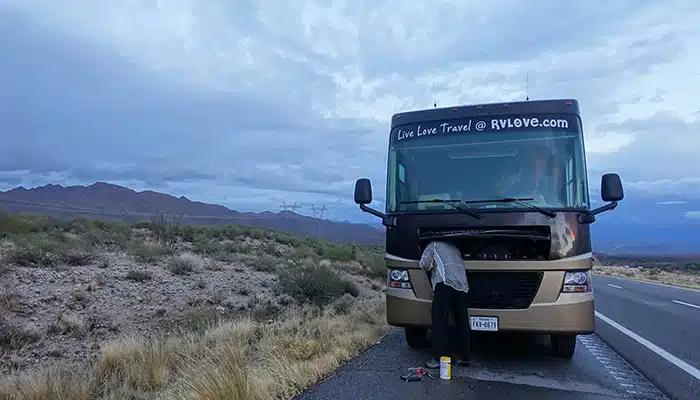
Is It Risky to Travel Without an RV Warranty? How much are repairs?
It is an rv. what could possibly go wrong.
An RV – no matter the type, brand, or price point – is a moving vehicle with countless moving parts traveling down the road like a rolling earthquake. Things will shake, rattle, and roll. Eventually, something is going to break. Possibly many things over time, and sometimes many things all at once!
No two RVs are the same. They won’t necessarily have the same issues, even if they are the same make, model, and year! Many variables play a part in an RV’s reliability. How you take care of the RV and how well it was built. How you drive it, and how much you use it.
The road and weather conditions it is exposed to. And honestly… luck plays a part too! Sometimes you can do everything right, and something STILL goes wrong. Go figure. Welcome to RVing 🙂
But you CAN minimize the likelihood of things going wrong. And minimize the financial impact if it does by taking good care of your RV and being protected by an RV extended warranty.
What are the odds your RV will need major repairs?
According to RV warranty claims records, at least three out of ten RVs will require a major repair in their second year on the road. By the 5th year, that leaps up to eight out of ten. And within eight years, virtually ALL RVs will need a major repair.
These days, with the increasing complexity, new technologies, and more appliances being added to RVs, we would not be surprised if those numbers are much higher in the years to come. Again, we feel the overall lower quality of recreational vehicles built in recent years may also increase the likelihood of that.
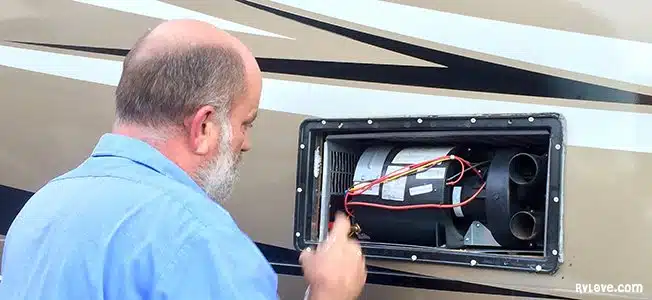
What do RV repairs cost?
Of course, that depends on the nature and complexity of the repair needed. Motorhomes – especially bigger Class A’s and Super C’s – tend to be more complex and expensive than smaller Class B’s, Class C’s, travel trailers, and fifth wheels.
RVs are becoming increasingly complicated with more technology, electrical, and mechanical systems. This means more things can also go wrong! We have seen RV repair facility hourly labor rates range between $85 and $150 an hour. The average tends to be around $120 – $130 an hour. But these can also creep up to $200 an hour on more expensive rigs.
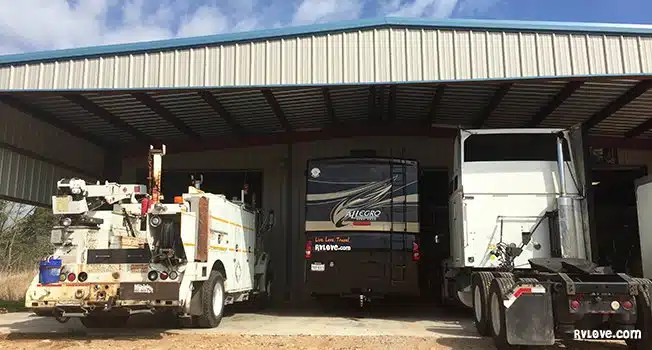
What are the most common RV repairs?
According to Wholesale Warranties , the top five repairs for both motorhomes and towable RVs are air conditioners, slide-outs, leveling jacks, generators, and inverters.
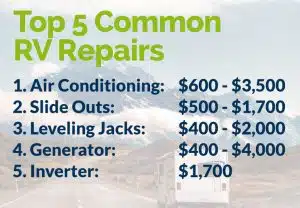
Of course, there are many more things that can fail and need repair. We have personally experienced a failure of ALL five items listed above. Not all in one RV, but spread out among our RVs. And quite a few other repairs as well.
Let’s talk a bit about some of the RV repairs we have made over the years. And what was covered (or would have been covered) by an RV extended warranty.
A few important notes
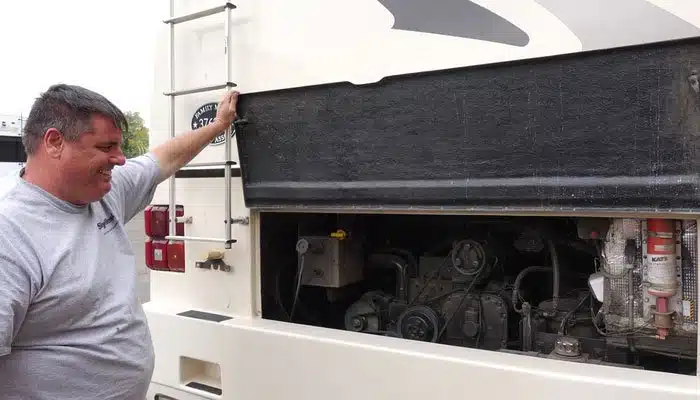
Almost anything can go wrong. And it will.

Our Experience Traveling with RV Extended Warranties
Our first rv’s extended warranty, a bit more history on our first rv.
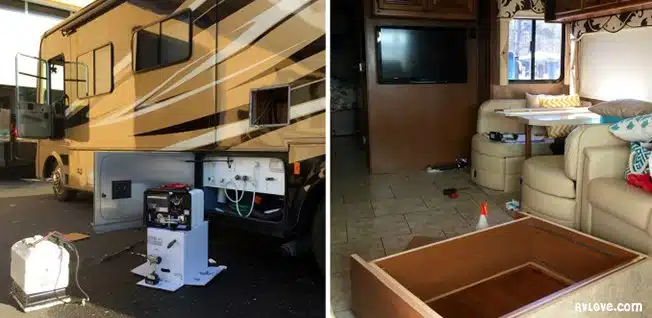
What was covered by our RV extended warranty?
It’s worth noting that we owned the coach for 46 months out of the entire 60-month policy. Here’s a summary of what we had fixed during that time.
- 2014: The furnace and hose in the front area of the coach. Faulty ceiling light wiring.
- In 2015: Water heater. Driver-side electric window switch.
- 2016: New leveling jack springs. Track bar bolt and nut (suspension). Wheel Alignment. King Pins. Hotel accommodation and meals (twice)
- 2017: Jacks Controller for Leveling Jacks. Driver-side electric window switch. Fresh Tank Water Valve.
Our RV extended warranty covered parts and labor. Each time we took the RV in for a repair visit, we paid a $500 deductible. That is per visit (not per item), plus tax, freight for parts, shop supplies, and other items.
How much did it cost for our warranty?
- The total of these RV Repair bills and ‘out of crib’ expenses came in at around $8,683
- We paid $2,696 in deductibles, tax, freight for parts, shop supplies etc
- Our RV extended warranty covered $5,987
Policy cost and prior claims
The previous owner owned the coach and policy for 14 months. During that time (from his recollection), he claimed a faulty roof heat pump, which was covered by the policy.
He recalls paying around $4,000 for the five-year exclusionary policy at the time of purchase from an RV dealer. It had the highest available deductible, $500 per visit.
Details on our other RVs with / without warranties below.

Our Experience Without An RV Extended Warranty
Ultimately, it’s all about risk management.
While RV shopping for our second RV, we mostly looked at RVs in the 3-10-year-old range. We did get some quotes from Wholesale Warranties on a few RVs that we got serious about. This helped us plan and budget for the overall cost of a potential purchase. But at the end of the day, we decided to roll the dice and bought our cheap, older motorhome.
This means we paid for our own repairs and labor. So essentially, we were now self-insured. How did that work out for us? Let’s take a look.

Repairs we made on our second RV
We published this article on the real cost of RVing after six years of full timing. In that post, we detail the RV repairs to our Country Coach from March 2018 – June 2020. In a nutshell, we spent $23,268 in repairs and maintenance on our 1999 Country Coach motorhome.
Almost a third of that related to a single major repair – replacing the diesel fuel pump. We did not have an RV extended warranty. So we had to pay for this out of pocket (around $8K).
Our Next Two RVs RV Warranty Experiences
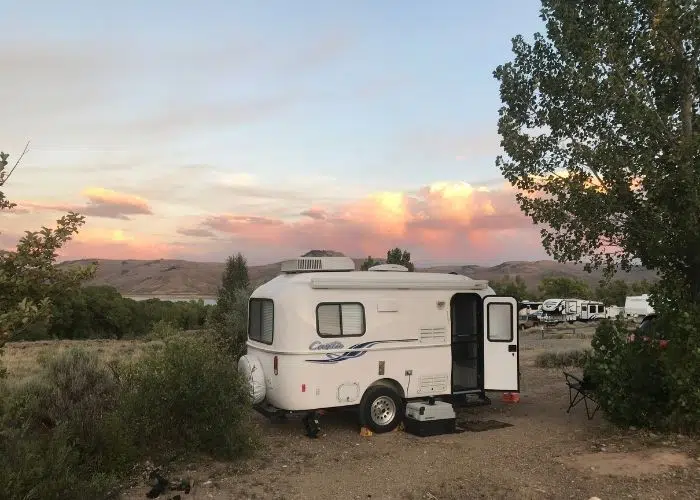
2019 Casita Camper RV Warranty
Our Casita camper trailer was a much simpler RV than our previous two motorhomes. After our previous experiences, we definitely wanted an RV extended warranty. Since it was such a simple RV, the warranty was inexpensive compared to motorhome warranties.
It was only a bit over $2,000 for a six-year warranty. After getting hit with a nearly $10,000 repair on our Country Coach earlier in the year, we wanted the peace of mind of knowing that if something goes wrong, the cost will be capped.
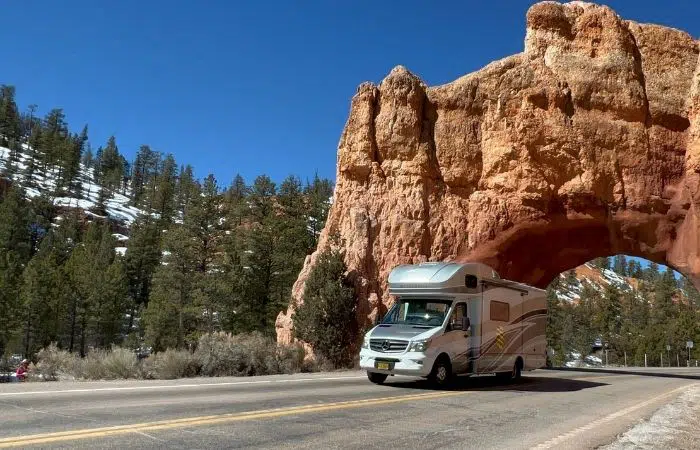
2017 Winnebago Navion RV Warranty
I f you have been following our blog, you will know that we did an RV trip to Florida in an RV that we rented from a friend. Well, at the end of that trip, the original owner decided he was going to sell the RV, so we decided to buy it .
Repairs the original owner has had to do in the first few years included:
- There was a major water issue in the overhead cab. This was due in part to improperly sealed clearance lights. The repair was estimated to cost $15,000. This was discovered just before the factory warranty expired and was therefore covered by the original manufacturer. But the RV extended warranty company guaranteed that they would cover it if the manufacturer didn’t.
- 2020: $855.71 Bathroom door latch, replace max air fan, and replace propane regulator.
- So, the various warranties covered over double the cost of the RV extended warranty. And we still have more than a year left on the warranty.
Repairs while we have owned it
In the first few months, we used the RV extended warranty for two additional claims. The first claim was to repair the Cummins diesel generator. That was a $906.15 repair. The warranty reimbursed us $746.32 of that.
We also needed to repair tie rods for $588, which is listed as a covered item. But we forgot to tell our repair shop we had an extended warranty! We didn’t get advance authorization, so we did not receive reimbursement for that item.
There were quite a few other repairs that needed to be done in the first year. But most were maintenance issues or other small repairs that were either ineligible for RV extended warranty coverage or small enough that it was just easier to do ourselves than to take it into a shop.
In early 2023, we also needed to replace the overhead light console in the cab. This cost $862. Unfortunately, it was not covered by the warranty because it was caused by water intrusion (which we have since fixed ourselves).
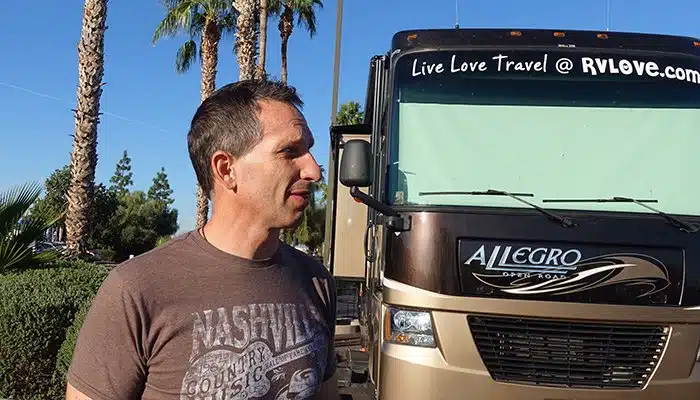
Should You Consider an RV Extended Warranty?
Do you need an extended warranty on a new rv.
Technically, if you have a brand new RV, then you don’t need an RV extended warranty… YET. Most of your repairs should be covered by your RV manufacturer’s factory warranty. These usually last for one year, and some may last 2-3 years.
Additional considerations
Also, when new, a model doesn’t yet have a history of repairs. Some RV models may develop a higher-than-average reputation for repairs. Those models will then end up with higher-priced policies as the years go on since they are now known to be more troublesome. Buying the policy when the RV is new shields you from the risk of a higher-priced policy while, of course, also paying for the repairs in the meantime.
If you plan on owning your RV for more than a year, it’s probably a good idea to buy the RV extended warranty at the time of buying your RV. This gets you the best price possible. Some companies offer a payment plan if you aren’t in a position to pay for it upfront.
But try to avoid rolling it into your RV financing! If you roll it into financing, you could pay much more for it in the long run due to the interest charges.
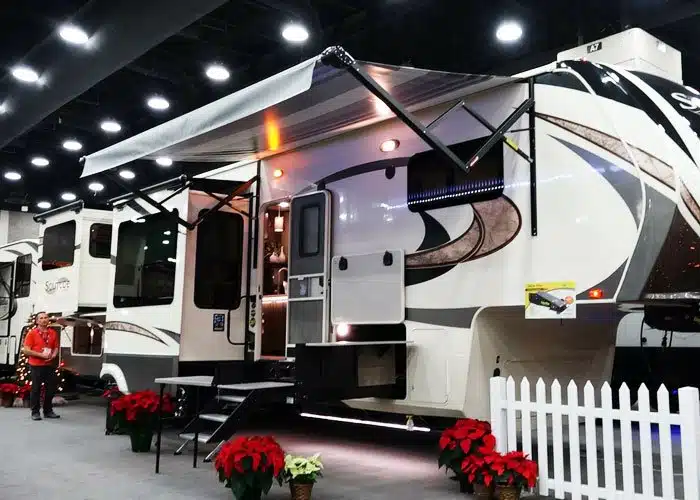
Considering an RV Warranty for a Used RV?
Should you buy an rv warranty from the dealer.
Probably NOT. Why? Well, there are multiple ways an RV dealer will try to make money from you when you are buying your RV. The RV itself, financing, non-essentials (e.g., paint protection), and an RV extended warranty, to name a few.
The dealer almost always marks up the RV’s extended warranty. This means you will likely pay more than if you bought a policy directly . AND the dealer will also try to convince you to roll the warranty into the financing.
Typically RV loans can be 10, 15, or even 20 years. And you’ll be paying interest on that. So you will pay WAY more than you should for the RV extended warranty there too. That means they get you on two counts – a marked-up policy AND financing costs.
It definitely pays to do your homework and get a quote in advance. At least then, you will be informed and know what to compare their policy and price to. So you can determine if it’s a good deal or not. Of course, you also want to compare “apples with apples” when looking at what you get. That’s price, coverage, terms, company reputation, and after-sales support when it comes time to make a claim.
Knowledge is power
It can be stressful and overwhelming enough to buy an RV. Being pressured into buying an RV warranty on the spot when it is time to close the deal – especially when you don’t know enough about them – can be an expensive mistake.
That is why we strongly recommend buying an RV extended warranty from an unbiased, reputable, independent provider. And getting a quote before buying your RV, so you can budget accordingly. Be prepared!
Buying your RV extended warranty directly from a company that deals directly with the end consumer – and when the RV is new – is always the most cost-effective way to purchase a policy.
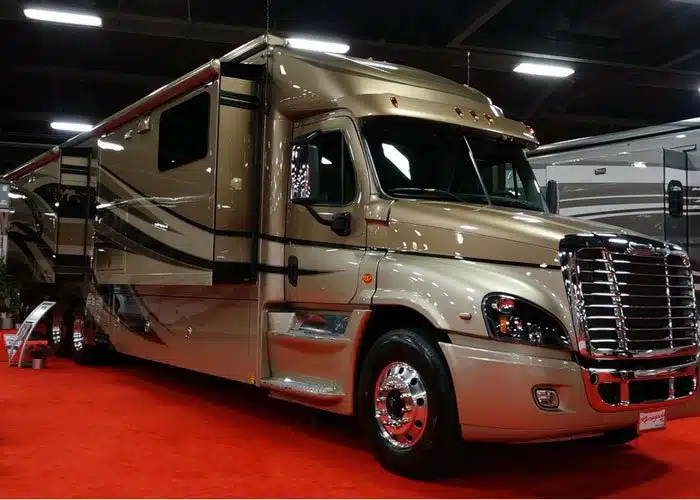
Should you ‘self-insure’ instead?
But the gamble goes both ways. If you have a reliable RV and don’t experience any major or expensive issues, you could break even or come out financially ahead. But you won’t have the peace of mind that an RV extended warranty may bring. Only you can put a price on what that is worth to you.
Extra potential risk
One potential risk we see with self-insuring can occur if you are not disciplined – or don’t have the financial means – to take care of large and important repairs when they arise.
There may be a temptation to “put off” RV repairs because you don’t have (or want) to spend the money. Having an RV extended warranty may motivate you to make RV repairs promptly, knowing your policy covers it. This reduces the risk of a smaller issue becoming a bigger and more expensive one down the track.
We ‘self-insured’ our second RV. You can see what those repairs (among other expenses) cost us in this in-depth expense report.
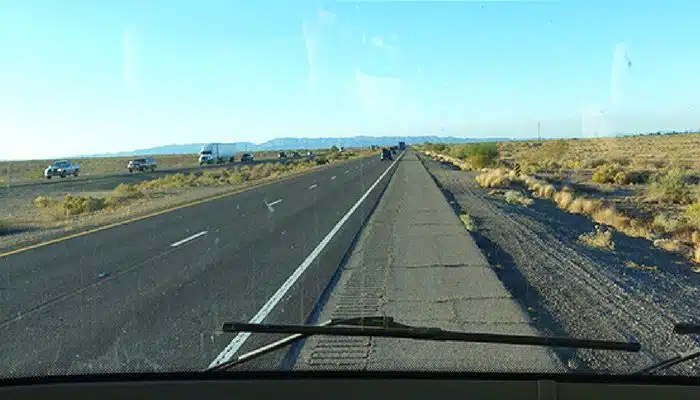
What does an RV Extended Warranty cost?
Every RV extended warranty is different. The type of RV, mileage, year, purchase price/ value, engine type, make, and model all help determine the cost of an RV Warranty policy. It also depends on what type of coverage you want, or qualify for, at the time.
Typically, RV extended warranties are less expensive on towable RVs like truck campers, travel trailers, and fifth wheels. This is because there is no drivetrain as found in motorized RVs (Class A, Class B, and Class C).
The price will also vary depending on the deductible. You get to choose what level of deductible you’re most comfortable with. And, much like your insurance policy, a less expensive RV extended warranty policy will mean you pay a higher deductible. Choosing a lower deductible will mean a more expensive policy. We have seen deductibles range anywhere from $50 – $500 per repair visit (not per item).
Something to keep in mind. If you sell the RV before the contract expires, you can cancel the contract and get a pro-rated refund based on the unused time or mileage remaining on your RV Warranty term.
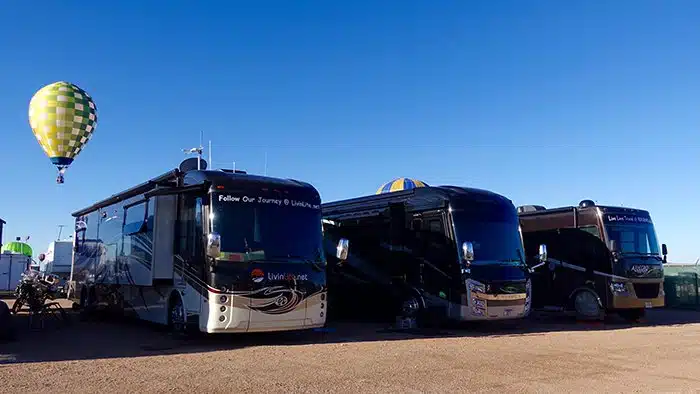
When is the best time to buy an RV Warranty?
Related Articles:
When is the Best Time to Buy an RV Warranty? How to Beat Price Rises?
The Real Cost of RV Ownership: Repairs, Maintenance, Depreciation, Finance, etc
Cost of RVing: Full Time vs Part Time
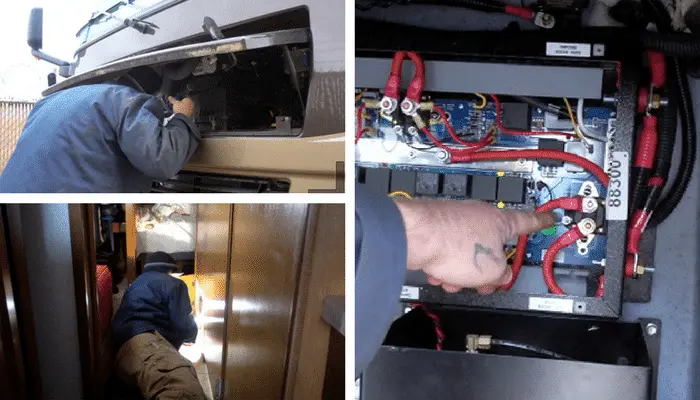
Pros of an RV Extended Warranty
- Allows you to manage financial risk with increased control of your RV-related expenses.
- An RV warranty company (administrator) will ensure RV service centers are not overcharging for repairs.
- You can include the warranty when selling the RV privately. This is an advantage for the buyer while making it easier for you to sell.
- A good policy will give you peace of mind, knowing you’re covered for major RV repairs.
- The policy may also include roadside assistance and towing benefits.
Cons of an RV Extended Warranty
- Usually, a sizable investment. And you may not get the full value out if your RV doesn’t need any major repairs.
- It may be cost-prohibitive. Or your RV may be ineligible if older (16–20+ years), or that have high mileage.
What to look for in an RV Warranty Company
There are many things you should look for when selecting an RV Extended Warranty company. Focusing on price alone is very short-sighted. You will want to consider these important points:
1. Confidence in a reputable company with a proven history?
You may have heard horror stories of people being left high and dry by companies that went out of business, rendering their RV extended warranty useless. Be sure to buy your RV extended warranty from a company with policies backed by “A” Rated Insurance Carriers with proven financial stability and staying power.
Avoid any RV Warranty programs offered through “Risk Retention Groups” (RRGs). If you want to read more about those and the risks, click here . But really, avoid them.
2. Knowing where you can get repair work done
Find out your options for using RV repair centers all around North America. You don’t want to be limited to using certain RV shops, networks, or facilities. When traveling around the country, you will want convenience and flexibility in where you get service.
3. Option to transfer or cancel your plan
You should get a transferable plan in the event you sell your RV. It may make your RV more attractive to a buyer. Or you may choose to cancel the policy for a pro-rated refund. Check the refund policy and find out if there is a ‘probation period.’ Admin fees may apply.

RV Extended Warranty Companies / Policies
Xtra ride (through protective asset protection).
- Our first RV extended warranty (that we inherited with our Tiffin) was an Xtra Ride policy through Protective Asset Protection . While they were mostly good to deal with regarding having our claims paid, they have also changed some of their business practices in recent years.
- They do not deal directly with the public. And you can only buy a policy through an RV dealership at the time of an RV purchase. So, you cannot buy a policy a month or a year or two after your RV purchase.
- You also cannot buy a policy from them on a pre-owned RV that you purchase from a private party. And, because you can only buy the policy through a dealer, it also means the price is more likely to be marked up. Therefore, it is more expensive.
- It may not be as easy to get an advance quote from Xtra Ride or the dealer before purchasing your RV, which makes it difficult to compare prices or accurately budget for your total purchase costs.
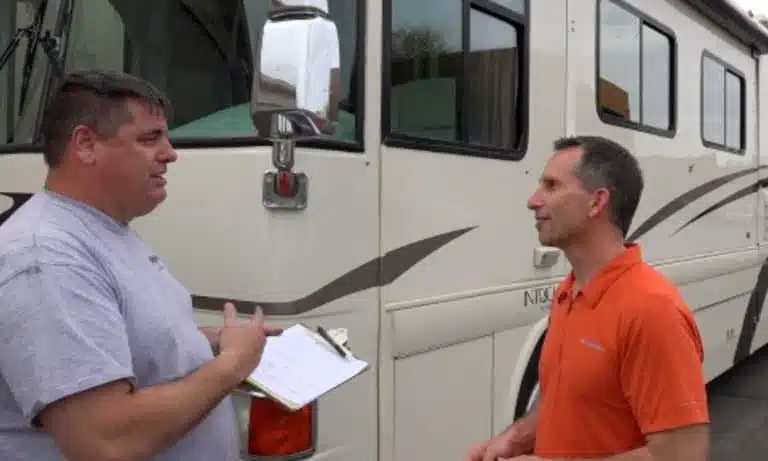
Good Sam Extended Service Plan (through Good Sam)
- Camping World Holdings own Good Sam. While we have not had an RV extended warranty – known as an extended service plan (XSP) – through them, we did have Good Sam Roadside Assistance – for just one year. We changed to another provider after a few poor experiences with Godd Sam.
- Based on our research of Good Sam extended service plan policies, we found reviews at both ends of the spectrum. Some good. Some bad. We have been alerted to some recent concerning news stories about Camping World’s financial stability. We do not know firsthand the current financial state of Camping World, nor do we wish to speculate. But as with all big purchases, we encourage you to do your homework before signing any contracts. And stay aware of potential risks.
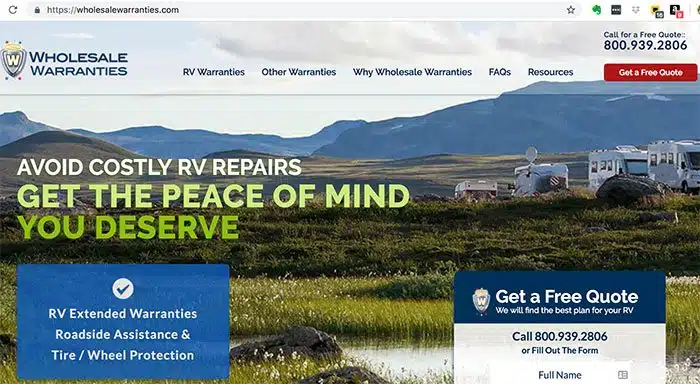
Wholesale Warranties (Viking Protection Plan)
- Wholesale Warranties is an independent brokerage company that deals directly with the consumer. They can offer RV extended warranties at “wholesale” prices, as they are not marked up by a dealer. Wholesale Warranties have access to several warranty providers. So they are not biased toward just one. They will recommend the RV Warranty program that best suits your specific needs.
- The Wholesale Warranties Viking Protection Plan is their exclusive, white-label plan. It also covers consequential damage or commercial use, including renting out the RV. We like that Wholesale Warranties strongly focuses on customer service and education. And they provide guaranteed coverage, positive customer service, and competitive, fair pricing.
- Their team is the middle person between you and the RV Warranty company. This makes it easier to navigate the claims process and act on your behalf as needed. Wholesale Warranties also offers contracts to Canadian customers. In our research, we found they have an A+ rating on BBB and a 5-star rating on CustomerLobby.
- We have obtained several quotes from them while RV shopping and always found them to be extremely competitive, knowledgeable, and helpful. Our most recent RV extended service contract through Wholesale Warranties was in 2020 for our 2019 Casita camper .

So Who Do We Recommend?
It is for all of these reasons that we personally recommend Wholesale Warranties . We have consistently found them to offer the best service, the most competitive prices, and the best options for customers – while getting consistently high ratings.
Over the years, several of our RVing friends, the RVLove community, and students of our RV Success School have purchased an RV extended warranty through Wholesale Warranties. We have received many positive reports and feedback about Wholesale Warranties so far. You can also Google some of their 100+ reviews, with an average rating of 4.9 out of 5.
We contacted Wholesale Warranties to get quotes during our RV shopping process in 2018 when preparing to switch our motorhome. And they are who we choose to buy a policy from for the Casita RV purchase. Our 2017 Winnebago Navion had an RV warranty which was transferred to us by the original owner.
We have a warranty from Wholesale Warranties on our current fifth-wheel trailer.
You can click here or call 800-939-2806 to get an obligation-free quote .
In summary, we recommend you get at least two quote comparisons. Crunch the numbers. Consider your own risk tolerance, and weigh up whether or not an RV extended warranty is worth it for you.
Well, we hope this article has been helpful. We would love to hear your experiences, questions, and comments below.
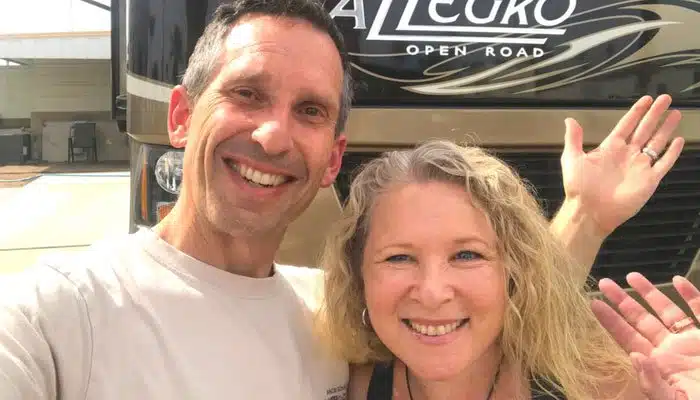
Quick links back up to sections of this article:
Related content.
Want to read or watch more related content to RV repairs, warranties and the cost of RVing? Hover over the images below to see the title and click to read it.
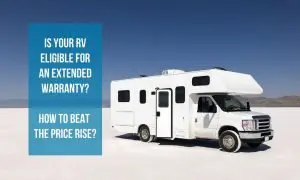
When to Buy an RV Warranty For Best Value
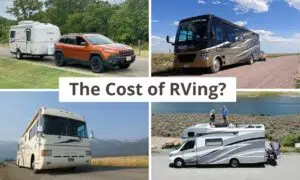
Cost of RVing – Full Time vs Part Time?

We Bought Another RV. What Did We Get and Why?
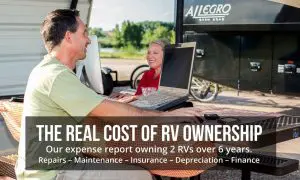
The Real Cost of RV Ownership. Here’s What We Spent.
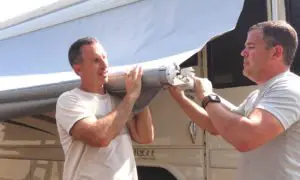
New RV Awning Replacement Fabric and Slide Topper

11 More RV Repairs, Mods and Upgrades To Our Motorhome

Getting a Professional RV Inspection Before Buying

Lessons Learned from 14 RV Factory Tours in the RV Capital of the World
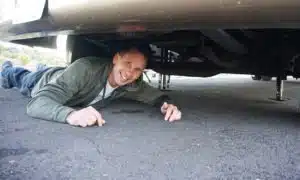
RV Breakdowns: Q&A + 10 Tips for How to Deal with Them

Part 2: 3 RV Breakdowns in a Month
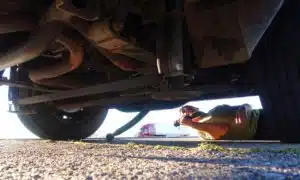
Part 1: 3 RV Breakdowns in a Month
Got comments or questions.
We would love to hear from you. Drop us a note in the comments section below.
90 thoughts on “RV Extended Warranties. Are They Worth it? 2024 Update”
I have had Good Sam for two years. The issue is they nit pick to avoid paying for items. I and the service rep have spent hours dealing with them. An example is they only cover electrical components. If the item is inside a sealed component they won’t cover the item and outright denied the repair.
It’s just to difficult to deal with them and I am going to cancel. People don’t want to accept the coverage for this very reason.
Hi Charlie, Sorry to hear your experience with Good (‘bad’) Sam insurnace. I have heard that about a few carriers, and many times about good sam. That is part of why we like Wholesale Warranties, because they can help negotiate on your behalf. -M
Thank you. We love to hear that our content is helpful to others. Glad to help.
Get answers about 1. Review limits, at what amount of repair cost does the claim go to someone else to review coverage. 2. Tie back is this agreement restricted by distance. ALOT of them do have up to a 100 MILE tie back to selling dealer or sister store locations. 3. If it is a exlusionary (or sometimes called Comprehensive) what does it NOT cover? 4. IF you buy a lower level option and get a stated level agreement, what would happen if something broke and you needed to upgrade to a higher level plan? 5. Is there EVER a chance of goodwill on a non covered part
I could go on for days, but then I would confuse you and just do information overload
Thanks for your input. Agreed, those are good specific detailed questions to get answers on when shopping warranties. -M
Has anybody had experience good or bad dealing with americas rv warranty, will .ook into wholesale warranties also,arw is connected with fortegra in. Co. And seems to cut one of middleman out,thanks
Sorry we have no experience with America’s RV Warranty to share. We always recommend getting at least 2 quotes and compare apples with apples! We like that Wholesale Warranties is a broker that represents several policies and can recommend the best one for you, cutting out the middle man as you say (and markup). Good luck!
I bought a warranty and GAP from RV Country with the idea I could cancel it with a full refund in 45 days. I found the same coverage online for $1400 less than what I paid at RV Country. Preserve was the extended warranty company.
I canceled it and it’s 100 days and no refund. I’m out over $5,000 and no one will account for where the money is or when I can get it.
I’ve also waited 100 days for any parts to come in to fix my new toy hauler. Forest River makes a heck of a yard ornament.
Wow that sounds like a rough situation! We aren’t familiar with that warranty or company – but RV extended warranty companies are notoriously SLOW in processing things. I would keep on them – in writing so you have a ‘trail’ whether that is by email or registered mail. Email easier. You should have a copy of your contract specifying cancellation policy – attach a copy of that, along with your cancellation (hopefully you provided this in writing) and send to the warranty company / RV dealer – to the TOP. If you still get no joy, submit a claim to your credit card company (if that’s how you paid for it) with all of your written evidence. And yes, the last couple of years have been challenging getting parts with the supply chain issues – So frustrating! Really hope it all works out for you soon. Good luck!
Boy do I wish I read this article before we bought our Extended Warranty from the dealer BYoung RV now LazyDays! Total ripoff! DO NOT BUY AN EXTENDED WARRANTY THRU ASSURANT!! We drove around the country for 4 months without a working refrigerator due to service appointments behind so backed up. ASSURANT will only pay for repairs that are pre authorized at a authorized repair facility. Repair facilities will not make an appointment just to obtain a pre- authorization. I have wasted at least 20 hours and now $10,000 on this scam trying to get any of our claim covered
Oh dear – so sorry to hear of your experience! That sounds frustrating. Had not heard of Assurant but will keep this in mind. Hope you get it resolved soon!
I am an RV mobile service tech business. I have to say there are warranty services that are horrible to deal with. My policy is NO to a warranty that is not above a certain dollar amount. Why? It takes minimum 1 hr of phone time working with your warranty company. Often I am on the phone for 2 hours or more. I don’t get paid for that. Your $200 deductible on a $500 job with $300 in parts is not worth the extra time it takes dealing with them. One warranty company, just today, tried to get me to box up a failed 2007 inverter and send it to their repair facility. (what business are they in? Maybe they should BE an RV repair facility???) And they want me/you to pay for boxing & shipping it both ways. The Agent insisted the inverter was “field repairable” even though I would have to drill out 18 rivets just to get the cover off to attempt to repair an inverter that was end of life according to the manufacturer. Often these extended warranty companies want to dictate how long a repair should take by the book not taking into account the way the coach was built/ what else must be done to affect the repair. These costs I have to pass onto you. And you say to me: “But I have a $200 deductible!”. I am a mobile business with no shop. I am a 1 person operation. 3 warranties a week would kill my effectiveness. Few extended warranty company lets me hand you a bill, you pay me and they reimburse you. I must call them and over the phone itemize, haggle and negotiate your warranty. NOT WORTH IT! Some warranty companies are great to work with. The difference between a Bronze and a Gold plan can change everything! If your warranty costs $9,000, personally I recommend keeping that in the bank ang forgoing extended warranty. I am the guy on the other side, this is my perspective. But I have seen disappointed faces too many times! II doubt they will publish my comment, if they do, take note. I have my own rating system for extended warranty companies. Some I will never do business with again! So when you bring out your policy and see a sour look on my face… try to see it from my point of view. I do not have time to list all of the problems I have had with extended warranty companies. And I fear their lawyers so I won’t list names. Do your homework. They salesman makes kickbacks selling you. And the first thing to know about buying and RV?: The biggest lie is “We checked out EVERYTHING!”.
Hi Chad, thanks for sharing your experience from the perspective as a mobile tech! There are definitely some warranty companies and policies that are better than others for sure. And understand why you don’t want to share names. Also agree the better (often ore expensive policies) may be the best way to go… and it all depends on the rig. We have owned a couple of Class A motorhomes and those repairs can get expensive, especially on the diesels. For some, it may make sense to self insure and just pay out of pocket, but like anything, it’s all about risk tolerance. Personally, we find RV breakdowns stressful enough as it is, wondering what is the issue, and how long will it take to fix it… without having to ALSO stress about what it might cost! Our exclusionary policy turned out to be worthwhile on our first coach… our 2nd motorhome had too many miles to qualify for a policy, but if it had, we would have definitely come out ahead. We only ever once called a mobile repair tech – on our first coach. We never called/used on our second coach. But the good thing for you is, there is plenty of business out there right now, so we hope you’re able to get by and thrive, with non-warranty work, as it sounds like it might be too much hassle for you with certain jobs. As you said “Do your homework” is the best advice you can give any RV buyer.. take your time and explore all your options, budget for everything… and make the choice that is right for you. All the best!
Would love to know the names of the reputable warranty companies you have worked with.
Wow thanks for sharing!
Very helpful article. We’re in the process of purchasing a used Class C RV. Unfortunately, I was disappointed to learn that Wholesale Warranties will not cover used RVs that are rented. They will only provide coverage on rental RVs that are new and you must add the coverage at the time of purchase.
Do you have any recommendations of companies that will provide extended service contracts for Used RVs that are rented? Thanks!
We didn’t know that! So if you own a used RV and want to rent it out, it’s not covered? Good to know this. Sorry we don’t know of any other companies that can help with providing extended warranty coverage on used, rented RVs… but will keep our eyes and ears open!
Thanks for the note with the update! Will make those changes to the blog post. Look forward to another trip down to the Keys sometime in the future! Cheers
Greet article. I was only reading it because I am having issues with a good sams extended warranty. We paid $3000 for the warranty and it has been a night mare. They always have an out. Do not waste your money on it.
Yes, sadly, we have heard too many similar stories, hence we don’t recommend GS… it. may be worth looking into your options canceling and getting a partial refund and getting a better policy from Wholesale Warranties which will likely also be cheaper – just make your you are comparing apples with apples! (eg. if say an exclusionary policy)
This is a very comprehensive article that was well researched. I would like to know which company you (or the audience) would recommend to cover a 2008-2011 Newmar with e-plex.
Hi Michael – glad you found the article helpful! We recommend getting a warranty quote from Wholesale Warranties – https://rvlove.com/warrantyquote – they can cover a motorhome in that era you mentioned.
We have always purchased extended warranties on our cars, and have had very good luck with the few claims that we have made. So when we bought our 2017 Class C with 17000 miles on it, we thought it prudent to purchase one. We bought the Good Sam extended warranty as well as the Good Sam vehicle insurance. WHAT A MISTAKE!!! I would not give this company another penny. We had heard that Goos Sam had changed and now denies every claim and that has been our experience. We had an issue with our water system after several months and several more thousand miles of operation so called Good Sam and took our RV to a repair shop that they recommended. The shop performed the repairs and let us know that there was some breakage that should be covered. Sure enough Good Sam has denied all claims as “pre-existing conditions”. Pre-existing? After 4 years and over 20000 miles? BUYER BEWARE! This company is not honoring its obligations with us, and per our mechanic, many others. We are appealing and have asked Camping World for assistance. I am also trying to find out if our state’s insurance commission licenses extended warranties, since this type of “bait and switch” should not be tolerated. If anyone has information as to how to action a bad faith extended warranty denial, it would be much appreciated. Until then we are simply sharing our experience. Thanks for this forum.
Hi there Nancy – we are so sorry to hear of your experience with Good Sam! Honestly, we have heard both good and bad reports on the Good Sam policies – we have never owned one from GS ourselves, and would not buy one. So thank you for sharing your experience, for the benefit of others who are reading this post and the comments. This is also the reason we recommend Wholesale Warranties, as we are confident in the service they offer. You might want to reach out to Alan Warren of the RV Show USA – I know he has covered some of this topic on his show, and warned folks to cancel and cash in their policies. He may have some suggestions for you on who to contact to help with your situation. I am assuming when you purchased the policy, they did not insist on an RV inspection so any “pre-existing conditions” could be noted on the policy? We just got an inspection done on our warranty for our Casita, for the Wholesale Warranties policy, the inspector was VERY thorough, and it came out with a clean bill of RV health. Phew! Anyway, hope those suggestions help. All the best!
Wow, this article had loads of information, suggestions, and tips. Thanks for the time and effort you put in to post the extensive article. I’m not yet an RV motorhome owner (first time) but if things work out for me I plan on a purchase of a 2 – 3 year old Motorhome. I appreciate your story and tips. I’m 78 years old and still pretty active and fairly mechanically minded so I can repair and fix many things but not sure about motorhome things. I’m not wealthy but believe I can pay cash for the motorhome (several in mind) I have spotted, and still, have enough savings to cover modest park fees, insurance, etc. But had not considered extended warranties to cover major repairs and roadside assistance fees. This is starting to scare me a little as I’m by myself and not rich so I may have to rethink my life going forward. I don’t plan to be on the road a lot but several trips a year. I do want to know what most motorhome parks (not fancy) charge for 50 amp full hookups for a 37ft motorhome.
Hi Jimmy, so glad you found the article helpful! Yes, it can be a lot to wrap your head around. That is definitely great you are a handy guy and can DIY a lot of RV fixes yourself. It will save you a lot of money and hassle when it comes to RV repairs. Now to your question… extended warranties are a personal decision and everyone has to weigh up what’s right for them in terms of budget, risk tolerance etc, but you definitely want to ensure you have some kind of slush fund for RV repairs if you don’t take out a warranty… there is no one RV brand that is trouble free, and motorhomes have a lot more complexity than trailers. It would be really helpful for you to read our recent article on the Real Cost of Ownership – based on us owning 2 motorhomes – a newer Class A gas and an older Class A diesel – over the past 6 years. Ohttps://rvlove.com/2020/10/21/the-real-cost-of-rv-ownership-after-6-years-and-2-rvs-heres-what-we-spent-on-rv-repairs-maintenance-and-depreciation
Of course, every RV / person / situation is different… but personally we don’t like expensive RV repair surprises as those are rarely budgeted for! We had to replace the diesel fuel pump in our coach earlier in 2020, and nearly fell over when we learned the repair would cost $8,500! We had no choice but to fix it – ouch! Keep in mind, it was a 20yo motorhome with 250K miles, so that is a huge factor! It’s unlikely that would happen on a newer MH, but there are certainly plenty of things that can still go wrong. A friend who has a 2016 Monaco Diplomat and owned since new (5 years of full timing so far) purchased an extended warranty through Wholesale Warranties just as his one year factory warranty was about to expire and he has already gotten his money’s worth out of it in covered repairs. Example: He had slide wall issues and the manufacturer claimed that was not part of the structure of the RV (!?) and so wouldn’t cover the repair – his extended warranty did, however, saving him quite a few thousand. He still has a year or two to go on his warranty and he’s at break even already, plus he has peace of mind should anything else occur in the future. Another friend owns a 2017 Class C Winnebago with an extended warranty that has also already paid for itself in repairs against the purchase price. We just bought a little Casita trailer a few months ago and while it’s a much simpler, less expensive RV, we still took a warranty out on it as it only worked out to be a few hundred per year, and it was worth it to us not to have to worry if anything more extensive were in need of repair. I guess we just like the peace of mind of warranties. Personally, we would buy an extended warranty if/when we buy another motorhome… experience has shown us how many things can happen! We don’t share this to scare you, but to ensure you are well prepared before making such a big decision. As you know, RVs depreciate, and RV repairs cost money, but the fact you’re in a position to buy a 2-3 yo motorhome and pay cash for it puts you ahead of most. We would recommend – as part of your shopping and research on particular units – do get a quote for an extended warranty on short listed RVs as part of your due diligence / total expected purchase price. It costs nothing to get a quote, but what it will cost to purchase can tell you a LOT about how reliable that particular RV can be and help you budget. Also if you decide to sell the RV in a few years, it can be easier to do so with a warranty, to give the next buyer peace of mind (as was the case when we bought our first RV).
Again, after reading our 6 Real Costs of RV Ownership post we think you will get a much better sense of what to budget for with a motorhome: https://rvlove.com/2020/10/21/the-real-cost-of-rv-ownership-after-6-years-and-2-rvs-heres-what-we-spent-on-rv-repairs-maintenance-and-depreciation/
To answer your question about the cost of motorhome parks for 50A full hookup sites – that will really depend on where you travel, but budget for $40-60 a night on average. You can certainly find less expensive – and more expensive – and camping memberships can help you save on camping fees. Also by staying weekly, or monthly, you will get much better rates – if you travel at a slower pace, it will be less stressful, more relaxing, and also cheaper in fuel and campgrounds! You can often find more reasonably priced campgrounds 5-50 miles away from the most popular places like national parks and major tourist attractions. State parks and county parks are also in the $20-$40 range, and we are seeing more and more upgrade to 50A service. National parks don’t always have hookups and can be hard to get reservations, especially with a 37′ rig, but there are still a few – Crater Lake in Oregon is one example that can accommodate big rigs.
We also wrote these 6 year summary articles on RV camping expenses over the years…which will give you a good idea of camping expenses and ways you can save: What has RV Camping Cost us over 6 Years – https://rvlove.com/2020/09/20/what-has-rv-camping-cost-us-over-6-years-of-full-time-rving Thousand Trails – is it Worth it? – Our Comprehensive Review after 6 Years – https://rvlove.com/2020/08/06/is-thousand-trails-worth-it-our-comprehensive-review-after-6-years-823-nights-of-tt-camping-2020
Hope this helps! Wishing you every success in your plans to hit the road! It really is a great lifestyle and looks like you are doing your homework, which will definitely pay off! Don’t let all this scare you – just be prepared. Life is short and meant to be lived! And there is no better way to explore North American than by RV. It’s a beautiful country with SO much to see and do! So go for it! And et us know if you have more questions on these other articles as well.
Best of LIFE – Julie & Marc
Hi Marc and Julie, We follow your Vlog and read this article and the comments thoroughly. We are upgrading our trailer and buying a brand new one that is much larger. Your article was so helpful and well written. It clarified what we thought we knew but didn’t. I love your content and humor in your articles and videos. Thanks for all the work. We for two… really appreciate it. Jim and Lauri Amandus
Thank you so much for your lovely comment about our content. So glad to hear that you have found them so valuable and informative. Thank you again -M
Fantastic article for a 75 yr. old widow woman who just bought a 2021 Winnebago Micro Minnie. The quotes from the dealership were outrageous. I was going to purchase Good Sam and just pay for the entire 6 years in one shot. Now i am going to contact Wholesale Warranties and get a quote. So does the the company who sells me the warranty coverage – do they pay for repairs? Thanks again.
Hi Pam, WOW good for YOU buying your Winnebago Micro Minnie! We are so excited for you and your new adventures. So glad the article was helpful. And thank you for sharing your experience with the dealer quotes – we have heard reports of some policies being marked up 2-3x! When you get a policy through Wholesale Warranties, yes they should pay for the repairs HOWEVER we have had an experience where we paid for a repair and had it subsequently reimbursed by the warranty company. It may depends on the situation / repair. But DO ask this question of the person you speak to at Wholesale Warranties. Having warranty coverage will give you peace of mind, especially being a solo widow woman traveler without a handy hubby to fix things as you travel. You are very welcome. We wish you all the best for safe and happy travels!
Marc, I have owned five different RV’s and the first thing I do when I buy one is enroll it on Good Sam’s Club Extended Service Plan. You briefly mentioned Good Sam’s plan but did not go into much detail. The extremely important difference between Good Sam’s plan and an Extended Warranty Plan is that Good Sam’s Plan comes is like an insurance policy under jurisdiction of insurance plans in the state of Colorado. With an Extended Warranty plan you are at the mercy of the using company in it being administered . The other dramatic difference is the cost. With an Extended Warranty Plan you have to pay for the total cost, depending on how many years you purchase, at inception, typical thousands of dollars. With Good Sam’s Club Extended Service you only pay at inception a monthly payment based on deductible. Taking the $500 deductible my monthly payment has been less than $100 per month. The policy is transferable and cancelled at any time without any penalty. Another trick I use when first buy my RV is to take the lowest deductible for the first months until have eliminated major problems then later raise deductible to lower payment. Another important feature, which I have used successfully, if they balk on a claim is to complain the the State Insurance Commissioner. Mike Florida
Hi Mike, thanks so much for sharing your experience. No we did not go into detail on the Good Sam policy, as based on our research and knowledge, did not feel comfortable recommending that as an option. Partly due to concerns around the company, as covered in the post. We don’t know about all Extended Warranty companies, but we do know that Wholesale Warranties does offer a monthly payment plan for a period of time, and the policy can be cancelled for a pro-rata refund, should the RV owner decide to sell the RV and no longer need the policy. Also a good tip about filing a complaint with the State Insurance Commissioner if you have any issues with claims. And starting with a lower deductible then dropping it later. As always, we recommend people do their own research and compare apples with apples, when it comes to deciding on RV extended warranties – and whether or not it is right for them. Definitely important to only buy from a reputable company with sound administration and that honors valid claims. We see the decision to buy an Extended Warranty as the price one is willing to pay for peace of mind and limiting financial impact of expensive repairs. And it’s always smart to get a few quotes when shopping around. Thanks again for sharing your experience – wishing you safe travels!
Warranties will not cover maintenance related leaks, so why not give your RV roof enduring protection with RV Roof Magic. RV Roof Magic is a multipurpose roof sealant that not only seals the roof, but also protects it from harsh weather conditions.
Yes it’s important to maintain one’s RV roof – we used Dicor products to do an RV clean and prep https://amzn.to/37vHIkO and then resealed the roof https://amzn.to/3o8TBTz . Good to know you also have products, will take a look. Cheers
Hi! Thanks for the article. We purchased a Portfolio Protection ESP from the dealer only because we were told we can cancel for 100% refund within 60 days – which we will do. We found a comparable, and probably better, plan from Protective Asset Protection for about 40% cheaper. I don’t know if they have changed, but we did not have to get this policy through the dealer – they are selling direct to us. Also, in the interest of transparency, do you receive anything from Wholesale Warranties? I have seen a couple of people inquire, but you never did answer.
Hi Sharon, That is good to know! We did not realize PAP now sells direct – so we will need to look into that. I wonder if it is because you purchased new from a dealer and it falls within that qualification? As you have seen – the dealer marked up the price of the policy substantially! So glad the article was helpful in terms of saving you some money! Yes, we are affiliate partners of Wholesale Warranties – we do not recall seeing any other questions about this that we missed or were unanswered…? Was that here on the blog? We are clear in our disclosure in the first para of the article (as you will see in all of our blog posts) that some links may be affiliates. We never recommend anything that we do not fully believe in. We regularly recommend companies and services that offer NO affiliate commissions whatsoever – that is never the reason we would recommend someone. It is ALWAYS based on the quality of the product and service, and our genuine belief that it would benefit our community, and that we can feel confident in sharing with our audience. And also based on our experience. Our opinions are not – and never have been – for sale. That is why our community trusts our recommendations. That said, we totally understand your reason for asking. Hope that helps!
My experience with extended warranties include Good Sam and it has not been good. They will simply tell you it was a pre-existing condition and deny your claim. I had a catastrophic failure of the wheel bearing spindle and hub which cannot be pre-existing under any circumstance. $2,200 in repairs in my claim is denied it’s 17 minutes. Be cautious if you have a new RV stick with the factory and extended warranties offered by a dealer stay away from Good Sam those guys are Crooks.
Sadly we have heard many unfavorable reports about Good Sam. We are sorry to hear of your experience. We also caution people to look further than the extended warranties offered by the dealers, as we know several people have found they were over charged by several thousand dollars more than they needed to pay, as it was marked up substantially for the same kind of policy one could by wholesale (not retail. We consistently get positive feedback about Wholesale Warranties from our RV Love community, which is why we are confident in recommending them and always personally obtain quotes on policies when shopping for RVs so we know what to expect.
Good Sam is way over priced, Americas warranty is much less and they do an outstanding job with customer service, Wholesale Warranties is also a very good company, I have had both I am going with my new 40 Ft. DP with Americas warranty
Thanks for sharing. It definitely pays to do research, to make sure you are comparing equal warranties, coverage and reputation. -M
I had a break line rupture and they denied my claim it was @ 1400 dollars.
Sorry to hear that your claim was denied.
Which company were you with?
VERY thoughtful, well-researched and presented article. THANK YOU.
You’re welcome! Glad it was helpful.
Thanx! Great insight. We are purchasing our first RV, a 2017 Winnebago Journey 40R, from a very conscientious, long-time RV’r. He has 4 years left on their Coach-Net Extended Service Agreement, which he said was transferable to us. Not 100% sure this is as easy as it sounds. The Plan Administrator decides “if” the plan can transfer from the seller to us, the buyers. Even if transferred, it may take up to 30 days after approval to begin coverage. A new Coach-Net policy would be 300% higher than the transfer costs! Will check out Wholesale Warranties, apples to apples! Keep up the great Blogs and Emails!
HI Robert, Glad you found the article helpful. Our first RV warranty was transferred via the original owner and only cost us $75 (back in 2014) and from memory happened pretty quickly – it was an Xtra Ride policy (which you can only buy new from dealers at time of RV purchase). Definitely worth getting a comparison quote from Wholesale warranties and check the inclusions, terms, coverage and price against the Coach-net option. We aren’t as familiar with the Coach-net policy. But definitely always worth getting other quotes to compare against before making a big, costly decision or purchase. Great to buy a used one from a conscientious, long time RVer – it will likely be much better than buying a new one and having to work out all the bugs! Glad you enjoy the content – more to come! All the best to you and enjoy your new coach and travels!
We are a couple of seniors who owned a pop up camper for many years. We sold that and have not camped in about 10 years. We decided if we were to ever camp again it would need to be a small travel trailer. After much searching we decided on a Kodiak Ultra Lite 201QB as that is large enough to fit our needs. After reading all of the comments on this page, I now wonder if we have done the right thing. What I understand is this: An Extended Warranty purchased from company other than dealer would be the best option for us and also purchase a separate contract for Towing. I found your article very helpful and thought provoking. Thanks.
Glad you found it helpful Linda. You may get a decent price and extended warranty from a dealer – what we are saying is to do your homework and get a quote from a company like Wholesale Warranties, which can provide quotes on various policies from different companies – and compare apples with apples. Dealers often mark the extended warranty prices up – AND also encourage buyers to roll into the financing (which we don’t recommend). The main thing is you get some quotes, make sure it’s an exclusionary policy, compare the contracts carefully, and ensure the company behind it is reputable and not likely to go out of business so you are not left high and dry. Hope that helps!
Use AAA RV Coverage for towing.
Thanks very interesting blog!
What company did you switch to for roadside service?
We switched to the program through FMCA, and have been very pleased with the service through them. Though we might be switching again to CoachNet. We have heard a lot of good feedback about CoachNet.
We purchased an extended warranty with our gently used 06 Southwind. The cost was about $4100, and to date has paid out $1300 for a slide out motor replacement. We are nearing the end of our 5 year contract and contemplating purchasing another, edging towards not doing it (didn’t make $$ sense based on our previous history).
And that all changed a few days ago. Our Norcold 1200 fridge died. It developed the dreaded ammonia leak and the cooling unit is shot. Luckily we installed an ARP control and it shut the fridge down and averted disaster (the 1200 is notorious for causing fires). Our fridge repair (cooling unit) replacement was just approved, so we are closer to breaking even on our initial extended warranty investment.
Thanks for a detailed article, I will use some of this info to help decide if we purchase another warranty or not.
Hi Steve, Wow, thanks for sharing your story! Most importantly, we are glad no-one was hurt and a potential fridge disaster (fire?) was averted. Those RV fridges are expensive to replace – we have heard stories of RV fridge replacements costing up to $4,000 including installation! You are a great example of being able to go either way – self insure or get the extended warranty. Of course, the older the coach gets, the more things may require repair… but it really is a ‘gamble’ either way, and one that each person must weight up for him or herself. The way we look at it is, even if we come close to breaking even on a warranty, the peace of mind we get from ‘just in case’ a bigger repair may be required would be worth it to us… but again, that’s a very personal decision based on many factors. Glad what we shared was helped as you weigh up the pros and cons for your own situation. Cheers!
Great article Mark! Your website is educating me on so much as we explore upgrading to our first new trailer. I was saddened to learn that your recommendation to purchase directly from Wholesale Warranties is not an option for California residents who do not have an out-of-state address. Any other tips or tricks to get a policy from Wholesale Warranties?
Hi Doug, glad you found the article helpful. We’ve reached out to WSW to ask for their advice on your options. May not hear back until early next week, so stand by… or you could give them a call? But we’d like to know the answer ourselves and share it here. Thanks for your comment / question. We’ll get back to you ASAP. Have a good weekend until then!
Hi Julie, Thanks for contacting WSW about policies in CA. I’m hopeful they’ll have a good solution 🙂
Hi Doug, well we got an answer back from Wholesale Warranties, and here is their reply:
“It is true that the policies we offer are not available to those whose sole-address is California. We truly wish there were other ways around it but due to a recent CA law change the only way through this is providing a vacation home/rental, an LLC or a mail forwarding address that is outside of CA. I hope this helps and clarifies things a little better!”
Not sure how helpful that is Doug… but if you are planning on doing full time or extended RV travel anyway (even part time) it can be very useful setting up a mail forwarding service that provides you with an address for your mail. They would give you an address with a “box number” and you could use that for your Wholesale Warranties policy/address. There are several mail service options – we use Escapees. We will continue to look for alternatives and update our blog post as necessary.
Yes, they indicated something about CA requiring Sales Tax and thus their policies are only available via those methods or directly from the dealerships. Oh well, I appreciate your help tracking down that confirmation! Safe travels 🙂
Drats! Thanks for letting us know!
Thanks for your very informative article! We have bought a new Grand Design 5th wheel and hope to take delivery very soon. I would like to know who you would recommend for emergency road service. AAA has RV road service but I am worried about getting service if we should have problems in remote areas. Do you have any recommendations for emergency road service companies?
Thanks, Caroline
Hi Caroline
Glad the article was helpful and congrats on your new Grand Design! While there are quite a few companies out there offering roadside assistance, we definitely recommend you get one that will cover your RV in the event you need to be towed! Also we recently learned that RV extended warranty companies are moving away from offering “out of crib” travel expenses while these are being picked up by some roadside assistance companies, so keep an eye out for that benefit, as well as RV towing and related incidents. While we used Good Sam roadside for one year, to be honest, we cannot recommend them as we were less than happy with the service. We changed to FMCA Roadside Rescue a couple of years ago and have only had to use once – to get towed! And they did cover all of that expense, as well as our ‘out of crib’ travel expenses while our RV was being repaired. Of course, we had to pay for the RV repair. The catch is you have to be an FMCA member in order to join their roadside rescue program…but we were already, they are good for tire discounts as well (FMCA).If you do decide to join FMCA, please let them know you were referred by RVLove member #464400. And we have heard only good things about Coachnet, so feel confident enough recommending them, even though we haven’t been a member… they are well known and respected. Hope that helps!
I own a 2005 Newmar Dutch Star. 64 000 miles. I bought US Warranty full extended warranty cost 7000. I have had frige fail convection oven fail inverter fail washer fail deductible 150 per claim my coverage for 5 years 2023 or 120000 miles policy well worth
We purchased an RV, fifth wheel, and 2019 and only drove it from Arizona to Oregon and decided that full timing was not for us. We want to sell it now. Can we get money back from all of the warranties that we signed up for for the next seven years.
Hi Beverly, Sorry to hear the lifestyle isn’t for you. It can take some time to adjust to, and we typically suggest people give it up to a year to adjust. We cover all this in Part 2 of our book “Living the RV Life” in the Emotional Considerations topics. Have you read it? It may be worth doing before making the big and (potentially costly) decision to sell the RV.
Re your policies, without knowing what warranties you purchased, we cannot answer that question. You would need to contact the company(ies) directly to have them answer that question. But if you bought an RV extended warranty, most companies should let you transfer that to the new owner when selling the RV privately. Or if you trade it in at a dealer, they should refund you a pro-rated amount. Wishing you all the best!
Hi Marc and Julie. Thank you for your well researched article on extended warranties. If I may, I would suggest adding one item to your pro list for buying an extended warranty, a consideration given to me by a friend who owns an RV repair shop. He tells me that since they are so busy, they will take care in priority of customers with warranties. Without it, you may have to wait longer to get your repairs done. Keep on your good work. Thanks.
Thank you Yves – we appreciate your sharing that tip! It is good to know that some repair shops prioritize warranty customers. We have personally been serviced fairly quickly in these instances… however have also hard opposite stories, that cash customers sometimes get faster service? Perhaps it depends on the shop. But we can certainly add that to the article as a consideration. Thanks for taking the time to share!
Do you have any experiences with the company called compass
Hi Paul, Not personally. And not enough to report on here in this article (yet). Our initial research on Compass shows the policy is offered by AGWS (American Guardian Warranty Services), through dealerships. Their reviews seem reasonable enough on Google (4 average based on 123 google reviews) but their BBB rating is fairly low. In trying to learn more about them, we were somewhat uninspired by the scant detail they share on their website regarding their policies. We will need to dig a lot deeper to learn even more before sharing / adding to our post. At present, the policy appears to only able to be purchased through a dealer/agent (not direct from the company) so do be aware there could be a markup on the policy cost. Definitely get some price comparisons from 2-3 companies and be sure to compare ‘apples with apples’ and pay close attention to their reputation when it comes to paying on claims. Don’t make your decision on price alone. The most important thing is the big ticket items are covered when you need it! And, of course, be sure to read the fine print of any contract you sign. Not sure how much that helps. We’ll continue to look into them.
I liked your article but I do have one question.
In your article you state; “Many get their moneys worth out of them and then some. Others break even. And a few end up buying the warranty and don’t claim enough to cover what they paid.” If this is accurate, how can the Warranty companies stay in business and make a profit. They must have more money coming in than going out.
Hi Jim, This is a great question, and we felt it would be better answered in more detail, by a senior executive within a warranty company. We appreciate your patience, while waiting to get this response from Jeff Shelton, CEO of Wholesale Warranties. Hope it helps!
“Great question. As you might guess, warranty companies need to make money to stay in business and at the same time add great value to consumers. When it comes to getting repairs done, warranty companies have several advantages that allow them to be more efficient and cost effective than the average consumer.
Starting out, claims departments have access to complex databases that allow checks and balances to determine average repair times for most any repair on even the most complex of units. This gives them the opportunity to question labor hours and repair prices and is a deterrent to repair facilities to over inflate labor and repair costs.
In addition, since warranty companies are a large portion of many repair facilities businesses, in many cases they are able to negotiate the labor and repair costs and receive “volume” discounts that would normally be unavailable to the average consumer. Although we will never be able to predict if any one particular unit will have high repair costs, the combination of high efficiency, and extremely accurate information using a large volume of RV’s, makes the idea of getting coverage a no brainer for more and more RVers. I hope that helps!”
Jeff Shelton CEO,Wholesale Warranties
Great content here! Thank you! Just bought a 2017 Airstream Interstate 24’ GT Tommy Bahama edition. Opted out of the expensive extended warranty offered by the dealer (Nationwide). In the process of getting quotes from GS and WW now.
Awesome – enjoy that beautiful Airstream!
After reading an article from the Axle Addict who wrote that all RVs being manufactured are of such poor quality we are now hesitant in purchasing one. Your article shed some light but is the quality of RV manufacturing that poor?
I haven’t read the article from Axle Addict that you mention, so I can’t comment on that specifically. But, RVs are very complex, and are built in relatively low tech facilities. People often try to compare them to automobile standards. RVs definitely fall short of automotive standards, and have a reputation for regularly needing maintenance and repairs. Ironically, new units often have more repairs than well cared for pre-owned ones as the previous owner has worked out the initial issues. If you are expecting a completely trouble free experience owning an RV, you will likely be disappointed. Some of those repairs can be quite expensive, and manufacturer warranties are relatively short, which is part of the appeal of having an extended warranty.
Thank you so much for sharing your thoughts about warranties. We have been researching Rv’s and narrowed down to 2 prospects, if we do make a purchase. I’m trying to educate myself with as many things as I can, because I have heard too many horror stories. So all of what you had to say has helped a lot..
Glad to hear it Karen. Yes RV warranties are a hot topic and people love to share their horror stories, but there are so many factors that play a part. On the other hand, we have also heard a great many positive stories, where RV warranties saved folks from some very scary bills. Like we said, do your homework, get some quotes, weigh up the pros and cons… and decide if it’s right for you. If you go with a reputable company that is financially stable, well backed and has positive customer reviews/ratings, that will help reduce your chances of having any horror stories of your own. All the best to you!
Thankyou so much, we are purchasing a new entegra 36h 2020, were due to pick it up in march! Yes its brand new and friends told us we were crazy on buying new! But we’re comfortable and excited, we have the 2/3 year warrantybut were taking your recommendation for wholesale warranties! Thanks again , sincerely the Rojo family
Hi there Rojo family! Congratulations on your new Entegra purchase! We do love Entegras, but haven’t actually seen the 36h model yet, so will have to check it out at the Tampa RV Show next month. Glad you found the article helpful. With so many technologies and electronics on today’s new RVs, there is just so much more that can go wrong… (welcome to #rvlife LOL) and therefore potentially be expensive. Considering your purchase is a sizable investment, if it were us, we would take out an extended warranty too. But we do appreciate that is a personal choice… it all comes down to what are you willing to pay for peace of mind. All the best to you and happy holidays! – Julie and Marc
Thanks for the GREAT info. Some great Sunday morning reading. Not buying yet but will save this to read at a later time. I am also reading your book “Living The RV Life” in my spare time.
Thank you! Glad you enjoyed the article, and are enjoying the book. We love that they have been so helpful to others.
Thanks for all of your hard work putting this information together. Everything you said makes sense to me. We made the mistake of getting the extended warranty when we purchased our first ever RV, from the manuf. I was smart enough to keep it outside of the financing. We were also sold a ‘tire’ warranty, which after 3+ years I have decided was not necessary. The RV Extended Warranty has been a worthwhile purchase as we have had several issues with the slides.
Thank you. We are glad you value what we create. Glad to hear that your extended warranty has been worthwhile, and that you kept purchase out of the financing. Thanks again.
I had originally bought a road side assistance with Coach Net when I purchased my 5th wheel brand new and through the dealer. This last year have been looking for an extended plan. But if I bout before my plan was expired I had to go back through a dealer. Which I did not want to do. But when my plan was expiring I did indeed go back to Coach net and go the extend, road side and the tire plan. As I write this I’m not sure it if was exclusionary or inclusionary but I like what they had and had used the road side assistance previously and had a very good interaction with them. If I recall this plan covered a long time period than wholesale warranties that I had also looked at. With just about an identical price. Anywho, that’s my two bitts worth. Nice article you have written.
Thank you. Glad you liked the article, and found coverage that works well for you.
Fabulous well written article that we’ll refer to as we continue searching the RV market! An eye opener….Thanks Mark
I’m surprised that you left out any information or comments about Coach Net. Obviously you must have some type of financial arrangement with WW.
We have used Coach Net for roadside assistance but not for extended warranties.
Leave a Comment Cancel reply
Pin it on pinterest.
- Extended Service Policies

- Existing user? Sign In

RV Extended Warranties -- Recommendations?
By MystreBengals , December 28, 2011 in Extended Service Policies
- extended warranty
- extended service plan
Recommended Posts
Mystrebengals .
- Report post
Would love to hear from some of you about which Ext Warranties are good, or at least not bad. Are they worth the expense for someone like me who is not a big DIY'er? (I don't mean to insinuate that I can do much, I am just not really good with my hands and I have some disabilities)
We have a 2009 Monaco Knight 41SKQ 20k miles, 4 slides, Cummins 360 ISC
I have done the search, read the previous threads on the similar topics.
I am still unsure of which companies are at least reputable, should I go with the exclusionary product or are their other choices.
I have never seen an answer to the question about wholesale warranties and what they offer.
Anyone have experience with: American Bankers Life Assurance Company of Florida. Notice there are 20 complaints with BBB, all but two appear "resolved" ... this is the company WholesaleWarranties.net sent the quote for..
5 years/50k for 3700.00 Appears to be an exclusionairy policy can add consequential damage for 395, Enhanced towing for 75, Tire/Wheel 7yrs for 449
The American Bankers Life company has a C+ rating, Wholesale Warranties has an A rating. (BBB)
Share this post
Link to post, share on other sites, bldr110 .
I have Extra-Ride and have used them many times with no complaints. They pay the service center over the phone,no hassels. It was highly recomended by PPL in Houston. It has definitely paid for itself.
wolfe10

My recommendation for researching any extended warranty is to do two things:
1. READ THE FINE PRINT.
2. Talk with the service manager of places you are likely to have service work done (or just a sampling of the larger RV, chassis and your engine manufacturer's dealerships in your area). Their recommendation on what companies pay promptly, don't look for loopholes to get out of paying each claim, etc. will be far more valuable than a small sample size of respondents here.
bbnuttmann

X2 on Extra Ride
happytraveler
TZScales
I'll weigh in on this topic briefly. We have been using the same extended service plan for our RVs since 2008 and there have been some disappointments in terms of payment for items we thought should have been covered; however, we have been satisfied overall. As one poster conveyed, research the different plans and read the "fine print." Upon further analysis of the particular exclusionary items on the policy we have, we understand the innerworkings the longer we have the policy. In addition, most if not all, require the owner to maintain the RV according to a particular maintenance schedule. These receipts and/or documentation may be necessary in case an inspector requires proof of maintenance.
For us, it is insurance that is worth the risk. I do perform basic maintenance such as changing fuel filters, changing belts for engine and AC, annual maintenance on our aqua-hot heating system, changing both air and hydraulic filters and other minor upkeeps such as battery maintenance, etc.
I sure do not want to get caught with paying out of pocket for a major repair such as an injector pump replacement or either major transmission or other engine issues.
Best of luck in your decision making.
sundancev
We purchased our 39 foot Providence in August 2011 and now travel full time. We signed up for Good Sam extended warranty plan and did not use for a year. Two weeks after renewing for the second year, we had a Dometic Fridge failure with $2,000 in repairs. We elected to take the $2,000 and apply towards a new modern unit. Good Sam people could not have been easier to deal with. RV Dealer in Reno, Safari RV Repairs did not accept assignment of Good Sam so we had to pay and send in bill to Good Sam to collect. Good Sam was very prompt in remitting the funds to us as expected and agreed. Good Sam did not give us or Safari a hard time at all. Again they were superb to work with. Safari was a minor disappointment in they did not take assignment of Good Sam remittance, but they were so good about the repair/replacement of the refrigerator I cannot say enough good about them. We later met a couple in Santa Cruz who were from Northern California who told us they deal with Safari all the time in their California Store. We told them about our experience with Safari and they told us they had similar experiences. Safari is not cheap but they were worth every penny we paid. We consider ourselves to be "newbie" even though we have lived full time some 17 months and feel like we need the comfort of a Good Sam warranty. Not saying it is cheap even with $500 deductible, but as we found out, a $3,000 fridge plus installation is not cheap either. Short answer is we suggest you buy the warranty. G Paul Whorton
surfcityauto

I purchased a 2006 Revolution 3 years ago and chose the Good Sam warranty with a $250.00 deductible. It is money well spent! They have covered approximately 15K worth of repairs over the past 3 years and I have no complaints.
I will not hesitate to renew my policy.
Cookie
We recently traded in our 1986 Honey for a 1999 Bounder with 30000 miles. The dealer wanted to sell us a service contract through a certain company, The price was $3800 for three years with a $200 deductible. I checked them out on the web at several sites, and they had nothing but a bad reputation. I didn't call the dealer back to take their offer, but they called me back and said they could lower the price to $3200. I said "no thank you". In the mean time I had done further research and found U.S. Warranty company and called and talked with them. They had NO bad comments on the web, and many good ones. I read the "fine print" and felt that it was a good deal. What I got from them was 4 years for $2800 with a $50 deductible. The payment was one-third down, and the rest in 12 equal monthly payments with no interest.
Ahrmless

There is one very strong argument for having the policy. That is the peace of mind it gives you when driving. It was worth every penny for the peace of mine it gave my wife while driving back and forth across the USA.
abryant6
I have had some experience with Good Sam's, extended warranty. First we had a microwave door that would not close on our 2001 Allegro. They authorized having the door repaired. This we attempted while on a trip to DC (incidentally do not use Reines RV in Virginia) only to find out that the part on an 11 year old microwave was on back-order and an indefinite delivery date, ie "discontinued"
Therefore the microwave could not be repaired but they would pay the repair allowance toward the purchase of a replacement. We elected to have this done at our home base in the Rio Grand Valley. Two months later when we were in Mission, TX and had our local RV repair facility (Bert Ogden RV) contact the warranty people could not find any record of our prior claim so they started with having it repaired, but there is no repair facility that will work on a 11 year old microwave in our area and they denied any payment. We caved in and bought one on our own at a cost of product and installation of $800.
Also beware and be aware that the Good Sam ESP sold by the dealers is not administered by the same company as the policy purchased directly from Good Sam and the two companies do not communicate or share information.
On a different situation with our Ford V-10 at a Ford Dealer GS warranty would not pay Fords nationally established charges for the alternator replacement, according to GS's established charges book it was 1.5 hours labor less and the alternator was 60% less than Ford's charges so with a $500 deductible they virtually paid next to nothing on the repair (by intent in my opinion). If you are going to be a warranty Co. you should at least acknowledge Ford's established prices on the most popular gas RV engine for over 15 years.
trutone

I too have Xtra ride. Very happy with them.They are a subsidary of Protective Life Ins. Co.
abundantamanda
We paid a lot for an extended warranty thru the dealer. $100 deductible or $50 if we take it to the dealer we bought it from. It has paid for many very expensive repairs but as of yet we haven't gotten what we spent back and we probably won't because the warranty requires we take our RV into a shop. We can't have a tech come to our RV. That's a real problem for us since our home burned up and we are now full timers. We have several issues right now that need fixing but the shop is booking 6 weeks down the road and said they will need to have our home for 3 weeks or so. What are we supposed to do? Our toilet is broken (flapper wouldn't open). My husband got the flapper open and now it stays open. You can guess what that smells like. He is going to fix it himself which actually really bothers me because we spent so much on our extended warranty. We are just having to live with other issues. I don't know about you, but the idea of living in a motel for 3 weeks and having our home full of all of our belongings in the shop, is a tough pill for me to swallow, especially while trying to work and have a normal life. Even before we became full timers, our 2008 class A diesel broke down on a trip and we wound up in a motel for a few days. The warranty company also decides that certain things are "adjustments" and won't pay for that. Just something to take into account.
OBS66
Avoid ACC warranty we have had nothing but bad with the company to the point that we asked for a refund and the owner said he would refund our money that was over a month ago and still have not received it. Will be filing civil suit. Research research research.
medico
I have quotes from WW, Good Sam and ACC Warranty . By far the best quote on my coach was from ACC Warranty. They are A+ rated by BBB. I found all good reviews.
Their Premier Extended warranty includes Roadside Assistance. Unlimited towing (this is needed with my coach because it needs to be lowboy towed), unlimited tire protection, trip interruption, etc. and the best exclusionary package I have seen.
I guess I disagree with the last poster. I have seen bad reports from all companies mentioned here. When I use an independent source to look for reviews, I see nothing but 4 or 5s which is the best they can get.
I guess my decision will be to even bother with an Extended Service Plan, or bank the money and take my chances. None of these plans is inexpensive.
Don't know what else to say.
Mexiconina
We bought our first MH a year ago and got Good Sam Ext Warranty. It is expensive, has a $500 deductible and hasn't yet covered any issues we've had (but we haven't had major issues, thank goodness). Time to renew so I'm looking for an alternative. Looked up American Guardian but was a bit put off by a very unfavorable blog from 2010 about AG not giving pre-authorization and then denying claims. Anybody have experience in this regard . . . the one mention of AG in this thread was very favorable.
I'm looking for US Warranty which has been mentioned favorably . . . can't find it online. Any further information about how to get in touch? Thanks,
TZScales -- mind sharing which insurance company you use?
Curmudgeon2
Be extremely leery of GOOD SAM extended warranty.
They would not replace the entire leaky hot water heater, only the tank. Even when two unrelated RV repairmen refused to replace the tank with all the old gas and electric controls. They said it was not safe and they would not be responsible or liable. To repair the problem correctly I would be responsible for the difference between a new unit and the tank only, nearly five hundred dollars. Also, I was unable to relocate to a directed repair facility because my awning was damaged in a storm and could not be retracted. So I was informed that the mobile RV service charge was not covered either. So they would not make proper repairs even though it was a serious safety issue told me volumes about their penny-pinching mind set and I canceled my policy. Then they added the insult to injury, they charge a $50 cancellation fee.
Out come? Found a new hot water heater online for less than my deductible, so with the mobile RV repair service call fee, and their cancellation fee it about a wash.
Will be following this forum for any bonified suggestions for a replacement policy. Thank you.
jlandon13399

We purchased a Cornerstone extended warranty from Lazy Days last May when we purchased our rig. Had a slide issue which was cosmetic and not covered. Now I have a blown rod seal in my front leveling cylinder. Will wait to see if it is covered. I did check out Good Sam and they were about $400 per year more than the Cornerstone policy with a $500 deductible.
MAxWedge

Anyone have a suggestion on who is the best companiy for an older bus conversion?
Ive been shopping on the internet but the prices are all over the place.
In the first 2 months I probable could have already purchased 2 complete extended warranties. This thing is worse than a Sea Ray for repair costs!
NorthernDriver
My extended warranty requires me to change the Oil and Filters EVERY 4 months or 4000 kms or its void. $$$ thrown down the toilet!
Be sure to get ALL the info. I hate slimy salesmen.
deenad
There was one case where a couple had a transmission failure, the insurance company asked for all service reports. The people were 750 miles past due on one ENGINE oil change so the company denied any payment for the transmission.
We've put money in the bank to self insure and have saved enough to pay for all maintenance and repairs over the 12 years we've had our present rig.
The insurance company (they are not, by most state laws, a "warranty" as only the manufacturer can offer a warranty) is betting you won't need repairs, you are betting you do and the insurance company wouldn't be in business for very long if they pay out more than they take in.
Besides, if the salesman thinks you need a high priced policy to protect against repairs do you really want something that they think will fall apart under you?
Consumer Reports recommends not buying them.
five
We researched a number of companies offering extended warranties. For the amount of money they wanted, with a deductible, we opted not to get one. The premium they wanted would pay for lots of repairs.
jmac1947
In December of 2013 I purchased the 3 year extended warranty Protrek policy through Wholesale Warranties after researching and getting quotes from several extended warranty companies. I had my first claim in January of this year and my experience with them went very well. I highly recommend Wholesale Warranties.
Please sign in to comment
You will be able to leave a comment after signing in
- Online Users
- All Activity
- My Activity Streams
- Unread Content
- Content I Started
- Create New...
- Good Sam Community
- Everything RV
- RV Tips & Tricks
Protrek Extended Warranty
- Subscribe to RSS Feed
- Mark Topic as New
- Mark Topic as Read
- Float this Topic for Current User
- Printer Friendly Page
- Mark as New
- Report Inappropriate Content
Dec-18-2014 10:17 AM
- Seeking Advice
- All forum topics
- Previous Topic
never-displayed
- Glow plug replacement Pleasant surprise in Tow Vehicles Dec-09-2023
- What is leaking? Dometic RM1350 4 door fridge in Technical Issues Sep-20-2023
- Dometic RM1350 leaking glue from freezer in Technical Issues Sep-12-2023
- Awning Stopped Working in Technical Issues Jul-12-2023
- GS extended warranty in RV Tips & Tricks Oct-01-2022

- Skip to primary navigation
- Skip to main content
- Skip to primary sidebar
- Skip to footer
Journey With Confidence
What RV Buyers Need To Know About An RV Extended Warranty

- RV Lifestyle
Sponsored by Wholesale Warranties

Let’s Face it, Everyone Wants RV protection
Spend at least 5 minutes in an RV group on Facebook and someone will ask, i s an RV extended warranty worth the money ? Another will question, should I get the extended warranty from the dealer, or, can I buy a warranty on a used RV? We’ll answer those questions for you, but before we do, let’s look at why these questions are so frequently asked.
What Do RV Extended Warranties Cover?
Like any expensive product we have purchased, RV extended warranties give us a sense of assurance. We know that if a major component breaks, we won’t go broke getting it repaired and can get back to RVing.
Signing over that big down payment and making the commitment to buy, drive, insure, store, and maintain an RV is scary. You want to be out enjoying your RV, not worrying about something breaking down. It’s all part of that initial and sometimes frightening process of buying an RV. An RV extended warranty tempers that fear, knowing that we have recourse if something goes wrong.
Keeping your RV in working condition is no simple task. You have to be part auto mechanic, part plumber, part electrician, and part handyman to complete all repairs yourself. The average person has a tough time being just one of those, let alone all of them. Even if you have the skills, most RVers won’t travel with the tools necessary to repair their rig. Having an RV extended warranty in your back pocket can help mitigate some of the trepidation over owning and maintaining your RV.
Should I Get an RV Extended Warranty Through My Dealer?
Let’s face it, if it was free, we’d all choose an extended warranty every time. Deep down, we all want our RVs to be protected as much as possible and to be free from worry over unexpected repairs .
The most important part of deciding on RV protection and where to buy is knowing your options. Your dealer will almost always offer you an RV extended warranty. Remember, we all want one, so why wouldn’t they? What most RV buyers don’t know is there is an alternative! Whether you’re buying a new or used unit, you can get coverage from an online broker as well.
Thinking about purchasing through your dealer? A few things to keep in mind. Your dealer will offer to roll it into your financing for convenience . This sounds great at first, but that convenience comes at a price. You’ll still be paying for the extended warranty on your RV, years after the warranty has already expired. By the end of your financing term, you’ve paid much more for your RV protection than you likely needed to.
A big part of your overall satisfaction with your RV warranty will be understanding what you’re purchasing. Unfortunately, most RV buyers aren’t willing to scrutinize a long warranty contract while sitting in the finance office at the dealership. The result? Many buyers end up purchasing a contract without knowing what it actually covers.
At the end of the day, most people are elated to be wrapping up the financing and getting ready to take their RV home. Having an extended warranty rolled in doesn’t seem like a big deal at the time, and no one wants to damper the experience by pouring over fine print. This might come to cost you down the road.
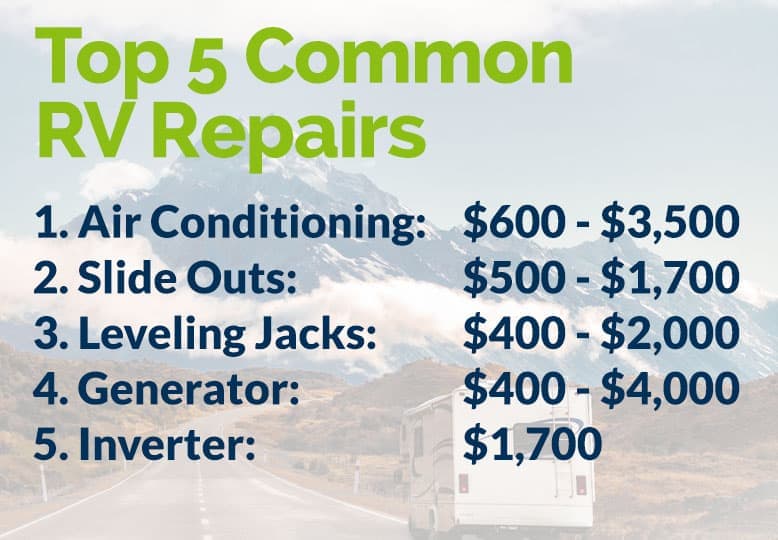
How Do I Find the Right RV Warranty?
Education. Know your options before you head into the dealership. Online providers offer free quotes, and some, like Wholesale Warranties , allow you to work with an RV warranty specialist to discuss the various programs available to you. Read through the contracts, and learn which questions to ask should you want to consider a dealer’s program.
“At Wholesale Warranties, we never off a “one size fits all” policy. It has always been our goal to match each individual RVer up with a coverage option that fits who they are, and what their needs are as an RV traveler.” Jeff Shelton – CEO of Wholesale Warranties
What Features Should a Good RV Extended Warranty Have?
A good extended warranty should make it crystal clear exactly what it will cover and what it will not cover . A reliable provider will offer a comprehensive suite of options, and work with each individual RVer to find the warranty policy that makes sense for them.
Your RV extended warranty provider should be known for customer service and support, and it should be easy to contact them, not intimidating. Learn from your fellow travelers by checking out the policy’s reputation with RV forums , consumer advocacy groups, and RV community pillars.
The warranty company should be one that’s been around for a while too, at least a decade or more. A good extended warranty should be an asset, not a liability. It should increase your overall satisfaction with your RV purchase, not decrease it.
Which RV Extended Warranty Should I Choose?
Fortunately, if you’ve made it through the process of choosing and buying a new or used RV and are now ready to add on an extended warranty, you have some really great options. There’s the dealer, where a well-researched policy might make sense. There are also online providers who act as brokers, matching RVers up with the policy that suits them best.
One such online broker is Wholesale Warranties, a US-based company that’s been serving RVers for 15 years. They offer competitive pricing and pride themselves on providing the most extensive coverage available in the marketplace.
RV warranty coverage options range from catastrophic coverage to exclusionary plans and may include provisions such as consequential damage, and wear and tear coverage. Wholesale Warranties clients work directly with an RV warranty specialist to receive a full education on what the policy will and will not cover, the simplest way to file a claim, and more, to ensure each RVer feels confident in the choice they’re making.
Above all, Wholesale Warranties makes a concerted effort to educate their customers on what the RV warranty covers, and, even more importantly, what it does not cover. Jeff Shelton, owner and CEO of Wholesale Warranties, puts it this way:
“We have a full time customer advocacy team whose sole purpose is to help RVers work between the repair facility and the warranty company for smooth claims processing, and to get issues resolved as quickly, efficiently, and fairly as possible. We put great effort into educating our customers so they have a good understanding of what they’re purchasing, and we always provide a full copy of the policy before asking our customers for a single penny. We’re focused on protecting your road ahead, and getting you back to your adventures.”
Does My RV Qualify?
Both new and pre-owned RVs can qualify for an RV extended warranty from Wholesale Warranties. Motorhomes must be less than 20 model years old with less than 100,000 miles. Towable RVs must be 15 model years old or newer. This flexibility led RVerInsurance.com , a website specializing in insurance needs for RVers, to adopt Wholesale Warranties as their RV warranty provider.
What to Look for in a Warranty Policy
Regardless of where you purchase your RV protection, the goal should be to find a policy that is there for you when you need it most. Buying an RV is an investment, and an extended RV warranty is one of the best ways to protect that investment and keep you on the road where you belong.
If you’re interested in seeing what an RV warranty might cost, working with the experts at Wholesale Warranties is a great place to start. Get a free quote from Wholesale Warranties today and start enjoying your RV instead of worrying about it.
Been to a campground lately? Don’t forget to leave a review ! Reviews help other RVers like yourself, and they help the campground. Leave a campground review today !
First Automotive Warranty Review
Affiliate Disclosure: Automoblog and its partners may earn a commission if you purchase coverage from the extended warranty providers outlined here. These commissions come to us at no additional cost to you. Our research team has carefully vetted dozens of extended warranty providers. See our Privacy Policy to learn more.

While First Automotive does not sell vehicle protection plans directly to consumers, First extended warranty products can be purchased from participating dealerships across the U.S. Practically every car dealer sells extended vehicle service contracts , and a First Automotive warranty may be available at your local dealership.
In this article, we’ll take a look at First Automotive warranty coverage options, customer reviews, costs, and more.
Our review team has researched the best extended car warranty companies in the industry. To see how First Automotive compares with some of the leading names in extended vehicle service contracts, start getting free quotes from our top recommended providers below.

- Best Overall
- Coverage Plans: 6 options plus maintenance plan
- Odometer Limit: Up to 200,000 miles
- Free Cancellation: 30-day money-back guarantee
- Longest Term: 8 years of coverage
- Discounts: $300 same-day signup discount, $250 shopping voucher, and others
First Automotive Extended Warranty: What You Need to Know
First Automotive contracts are sold by SouthwestRe, which also sells service contracts under the names PowerRev and ProTrek. SouthwestRe is a subsidiary of Industrial Alliance (iA) Financial group and has been in business for over 30 years.
Today, First Automotive has an A+ rating from the BBB, which is a good sign that it uses sound business practices and communicates well with its customers.
First Automotive Warranty Coverage
First Automotive offers a wide variety of coverage options for vehicles of all ages. Plans range from basic powertrain warranties to exclusionary coverage. There is also a lifetime warranty offered, which is particularly unique and not something that is offered by many competitors.
As you can see, there is much information missing on the First Automotive warranty website, so you’ll need to take a look at sample contracts and get more details from your dealership before deciding to purchase a First extended warranty.
All plans come with the following benefits:
- Rental car reimbursement
- Trip interruption reimbursement
- Emergency roadside assistance
First Automotive also sells the following additional coverage packages:
- Theft protection
- Key replacement
- Appearance protection
- Dent and ding protection
- Expanded tire and wheel protection
First Automotive Warranty Cost
To give you an idea of First Automotive warranty costs, we researched what other customers have paid.
One driver reported paying $3,000 for a five-year/60,000-mile warranty on a 2014 Chevy Silverado. Another customer paid $1,978 for a five-year/100,000-mile warranty on a 2011 Buick Lacrosse CXS. These are standard prices for the industry, though it is hard to compare against competitors without more information such as coverage level and vehicle mileage.
First Automotive warranty products are sold exclusively through dealerships, so the final price may be negotiable. Additionally, the cost of your extended warranty will depend on a number of factors, including your vehicle make, model, age, and mileage. Your location may also influence the final price of your First extended warranty.
First Automotive Warranty Reviews
First Automotive is accredited and holds an A+ rating from the BBB. The company has received just over 20 complaints in the past three years, which is a relatively low number. Customer complaints typically involve slow claims servicing and coverage gaps. These sorts of complaints are typical for an extended car warranty company.
How Do First Automotive Warranties Work?
If you experience a breakdown, call First Automotive at 505-881-2244 or 877-881-2244. A customer service representative can walk you through the next steps. Most minor vehicle repairs will be able to be quickly taken care of by a certified repair shop.
More complex repairs involving the failure of major components such as the engine or transmission may be more involved. In some cases, a First Automotive employee may need to conduct an inspection to decide whether to approve a repair or replacement. This process can take between three and seven days.
Final Thoughts: First Automotive Warranty
A First extended warranty may not be a bad option for your vehicle, but you’ll need to get more information from a dealership to decide for sure. Coverage options are comprehensive, and there are plans for both high- and low-mileage vehicles. However, additional protections such as dent repair and appearance plans can be skipped.
Overall, we rate First Automotive 3.5 out of 5.0 stars. This score was determined based on the following categories:
Because First Automotive extended warranty contracts are sold exclusively through dealerships, it is hard to know exactly what the final cost of a contract may be. Some plans offered through First Automotive may not be available at your dealership.
Our Top Picks for Extended Warranty Coverage
If you are interested in car warranties with extensive coverage options, a First Automotive warranty isn’t the only choice out there. Our research team compiled information on every major warranty company on the market. With this data, we were able to rate and rank the best extended warranty providers. Two companies we recommend based on this research are CARCHEX and CarShield.
CARCHEX: 4.3 Stars
CARCHEX has a well-known reputation for its great customer service, which is just one reason the company has remained a leader in the industry for over 20 years. CARCHEX offers 24-hour customer support and a live chat feature on its website, and it has hundreds of positive reviews online.
CARCHEX extended warranty contracts are also some of the lowest-priced on the market. When we asked CARCHEX for a quote on a Titanium plan (the highest level of coverage) for a 2018 Honda Civic, we were offered the following terms:
- Term Length: 7 years/150,000 miles
- Financing: $2,423.50 upfront
- Deductible: $100.00
- Total Cost : $2,423.50
- Price Per Year of Coverage: $367.71
CARCHEX is a reliable company with a strong history of paying customer claims. To learn more, read our complete CARCHEX review .
CarShield: 4.2 Stars
CarShield has some of the lowest-cost contracts in the industry. When we asked Carshield for a quote for New Car Diamond coverage (the highest level of coverage) for a 2018 Honda Civic, we were offered the following terms:
- Term Length: 5 years/70,000 miles
- Financing: $88.78 for 18 months
- Down Payment: $295.00
- Total Cost: $1,708.03
- Price Per Year of Coverage: $341.60
CarShield customers also have access to excellent customer benefits, such as:
- Rental car reimbursement: There is a maximum reimbursement of $40 per day up to $160 per occurrence.
- Roadside assistance: This benefit includes towing, emergency tire service, lockout service, battery service, and fuel delivery service. It reimburses you up to $400 per contract term.
- Trip interruption reimbursement: If your vehicle becomes inoperable more than 100 miles from your home, this coverage provides reimbursement for meals and lodging at $40 per day up to $160 per occurrence.
Read our CarShield review for more information on the company.
Our Methodology
Our expert review team takes satisfaction in providing accurate and unbiased information. We identified the following rating categories based on consumer survey data and conducted extensive research to formulate rankings of the best extended auto warranty providers.
- Affordability : A variety of factors influence cost, so it can be difficult to compare quotes between providers. Our team performs ongoing secret shopper analyses for different vehicles, mileages, warranty plans, and locations to give this rating.
- Coverage : Because each consumer has unique needs, it’s essential that a car warranty company offers an array of coverage options. We take into account the number of plans offered by each provider, term limits, exclusions, and additional benefits.
- Industry Standing : Our team considers Better Business Bureau (BBB) ratings, availability, and years in business when giving this score.
- Customer Service : Reputable extended car warranty companies operate with a certain degree of care for consumers. We take into account customer reviews, BBB complaints, and the responsiveness of the customer service team.
Don't get left in the dust!


RV Extended Warranty Companies
What is an rv extended warranty.
An RV warranty, also called a service plan or service contract, helps cover repair costs when the vehicle’s systems and appliances suffer mechanical failure. Warranty plans cover motorhomes, travel trailers, 5th wheel trailers, toy haulers, and other types of RVs. We’ve researched the industry to bring you the best extended RV warranty providers .
Learn More About Warranties
RV Warranty 101
ABOUT WARRANTIES
COVERAGE DETAILS
TYPES OF WARRANTIES
HOW TO SHOP FOR A WARRANTY
HOW WE CHOOSE THE BEST COMPANIES
Our Top RV Warranty Picks
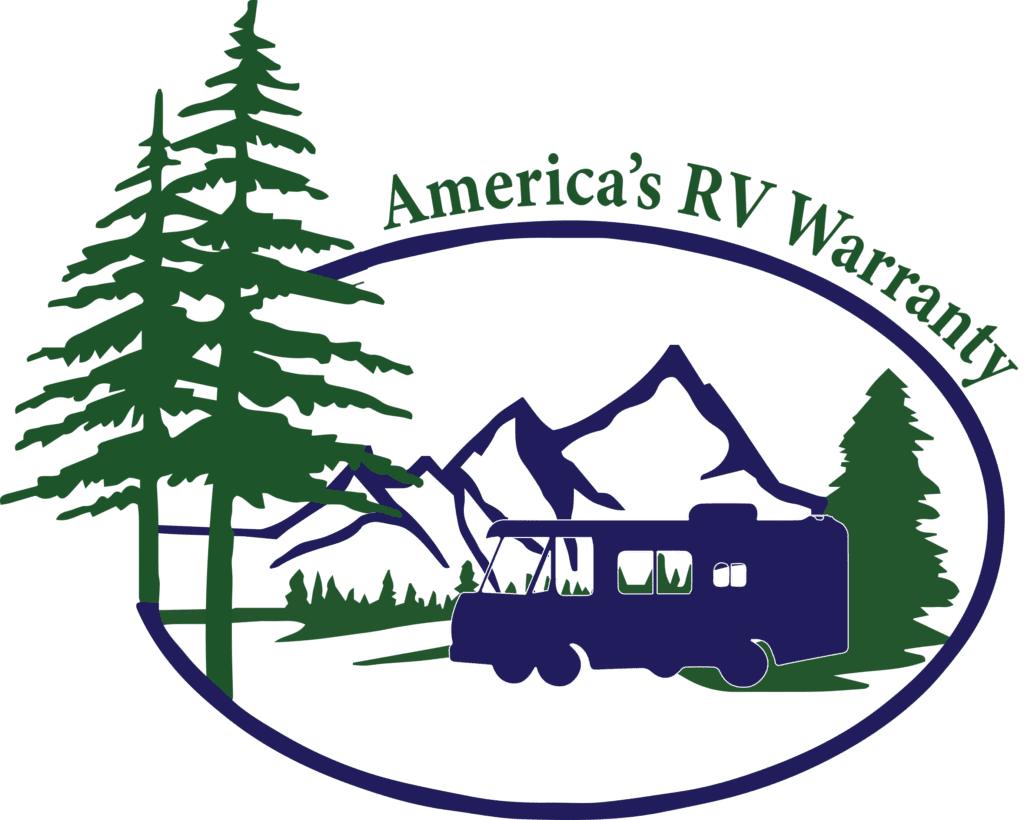
Best Overall 2024
America's rv warranty.
- Accepts Mobile Mechanic Repairs
- 4 Plans to Meet Any Coverage Needs
- Coverage Available in All 50 States and Canada
- US-Based Dedicated Account Management
- Backed By A Rated Insurance Carrier
The most recent addition to our RV Warranty list is America’s RV Warranty, a company that is shaking up an already competitive industry. Founded in 2018, they offer exclusionary and listed component plans for all types of RVs: Class A, Class B, and Class C motorhomes as well as towable RVs like travel trailers. Coverage for seals and gaskets is available under certain policies, and customers can also add optional coverage for tires and/or consequential damage.
In an industry where coverage options are similar—companies often sell the same product—two major factors set ARW apart: repair flexibility and service.
As of March 2022, ARW is the only company that allows any repair to be made via mobile mechanic. Since licensed repair facilities have wait-lists that are weeks or even months long, many RV owners are now using mobile mechanics. For ARW customers, at least, that solution will work just fine with their coverage. Other companies require that the RV must be disabled to be eligible for mobile mechanic coverage.
America’s RV Warranty stands out with superior service by being a partner with Headstart Warranty Group, their administrator, rather than just being a broker to them.
The distinction is small, but important. For customers, this means that ARW and the plan administrator work closely together, resulting in better follow-through and less snags during the process. The end result—a smoother ride through claims. Their policies cover repairs at any qualified repair facility in the US or Canada.
RV owners who choose America’s RV Warranty receive benefits such as service call reimbursement for mobile mechanics. Customers receive a free membership to the Family Motor Coach Association (FMCA), which provides discounts on camping and roadside assistance. The company also provides a membership to Money Tips, a free credit-tracking service that protects against identity theft and offers personalized financial tips.
America’s RV Warranty currently covers every state.
- 877-273-5217
Good Sam Extended Service Plan
- Flexible Payment Options
- Plans Are Fully Transferable
- Travel Expense Reimbursement Covers Food, Lodging, & Car Rental Costs While RV Is In The Shop
- No Roadside Benefits Included With Coverage
The longest-running company in the business, Kentucky-based Good Sam has been offering all sorts of RV services since 1966. Like other companies on this list, the Good Sam Extended Service Plan provides listed component policies for motorhomes, fifth wheels, and travel trailers.
They also provide service plans for tow vehicles and personal automobiles. For RVs, optional coverage is available for tire protection and seals and gaskets. Roadside assistance can be purchased separately for any eligible vehicles.
Customers also receive a few benefits. For example, the travel benefit assists with the costs of food, lodging, and car rental while the RV is in the shop. Good Sam allows RV owners to use any qualified repair facility in the US or Canada, but customers receive a 10% discount on non-covered repairs when they use a Preferred Provider.
Good Sam’s coverage is time-tested, but other companies might offer more extensive coverage. Their featured Gold Plan does not include the consequential damage coverage commonly found in other policies, and their website does not mention any exclusionary policies.
Their sample terms and conditions also note that they will only cover the cost of 1-2 hours of the service facility’s labor for diagnosis, depending on the issue. While this limitation usually won’t cause problems, it could mean the RV owner pays more out of pocket on major repairs.
As long as customers understand the coverage before buying, they won’t have any big surprises down the road, and the benefits of club membership enhance the RV lifestyle.
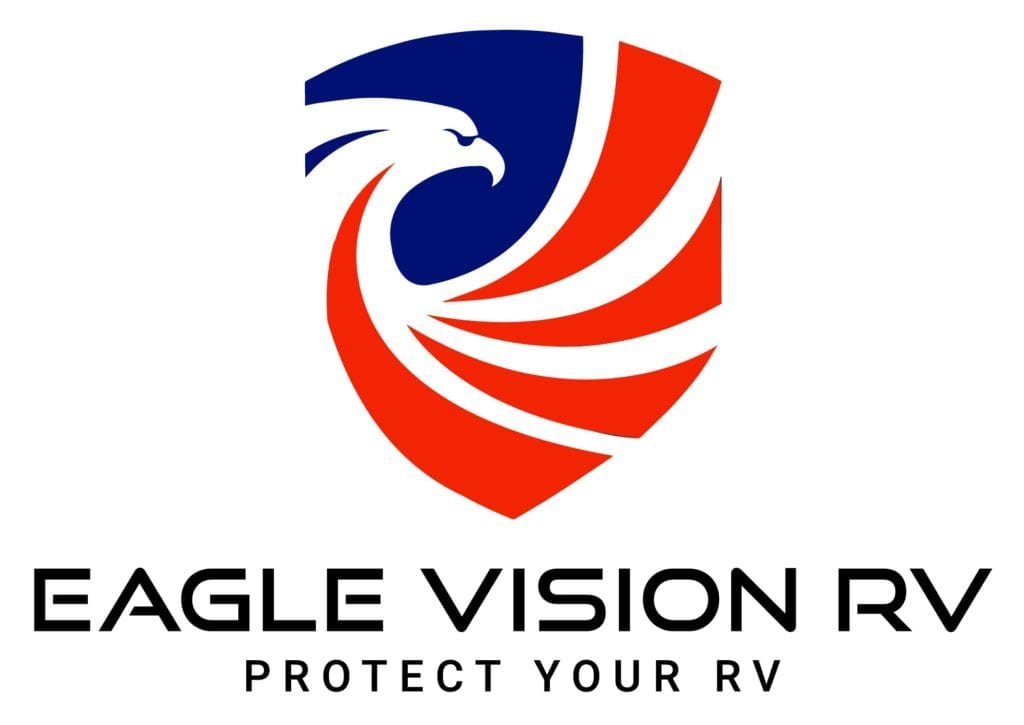
Eagle Vision RV
- Flex Length Coverage
- Gas/Diesel/Trailer Coverage
- Easy Purchase Options With Financing
- Travel/Rental/Food Loss Reimbursement
- 24/7 claims & assistance
For travelers looking for the ultimate flexibility in payment options, Eagle Vision RV offers a solution. Whether you’re looking to save money on a higher deductible or get the ultimate peace of mind with lots of warranty options.
Eagle Vision offers travel trailer warranties and motorhome warranties through two different administrators: Xtra Ride and Open Road. Eagle Vision is the exclusive broker for Open Road service plans. RV owners have the choice of exclusionary and listed component policies, and optional coverages are available for consequential damage, wheels and tires, audio/visual components, and 24-hour towing and roadside assistance.
Certain plans also carry a pet benefit, travel expense coverage, service call reimbursement for mobile mechanics, and food spoilage if the refrigerator fails. The benefits are policy-dependent, and not all policies are available in all states.
Eagle Vision is an industry newcomer, so customers who prefer a well-established company might want to gauge their performance by reading reviews (most of which are positive) on forums. Their website lacks organization, which can leave readers overwhelmed. It does, however, contain the itemized coverage that prospective customers would want to see before buying.
Read Full Review

RVING Solutions
- 2 Plans To Choose From
- Travel Expenses, Food Loss Reimbursement
- Fuel/ L.P. Gas Delivery
- 24/7 Concierge Service
RVing Solutions has been in business since 2005 and are well-established in the industry. Based in Lakeview, Ohio, they offer exclusionary and listed component policies for RVs (including travel trailers) and UTVs (utility vehicles). RVing Solutions works with two administrators—Interstate Star RV Program and Preferred RV—and provides a detailed list of exactly which components are covered on a given item. This list, which is featured on their homepage, is a valuable resource for RV owners seeking to understand how a warranty functions.
Aside from their coverage, RVing Solutions offers optional tire coverage and a solid set of benefits: towing (up to $1,000), emergency road service, food spoilage, and 24/7 concierge service. They also offer fuel/l.p. gas replacement, which assists with the cost of gas lost from repairs. Their travel expense benefit is more robust than other companies, covering up to $250 per day for food and lodging while repairs are in progress.
RVing Solutions models their brand as the hassle-free warranty company: they won’t use loopholes to deny claims, but will do their best to protect your costs. But even with the best of intentions, RVing Solutions is a broker just like any other company; they are not in direct control of authorizing and denying claims. Even so, their 15 year track record proves that they care about the coverage they provide to customers.
About Warranties
For many travelers, RV warranties offers peace of mind for their recreational vehicle by covering RV repair costs. A reputable company allows customers to use their coverage at any licensed repair facility in the United States or Canada.
Mechanical Breakdown
A warranty covers repairs when items fail in their daily operation (the industry uses the term “mechanical breakdown”). RVs are essentially houses on wheels, and even well-constructed motorhomes face immense strain from their time on the road. Many owners also complain that RV manufacturers follow lax quality control standards in an effort to keep up with growing demand.
Warranty or Service Contract?
Technically, the warranty coverage offered by these companies isn’t a warranty—warranties by definition come directly from the manufacturer. A more accurate term is vehicle service contract (some people even call them protection plans), but the companies on our list cover the same issues a warranty would cover.
Unlike a manufacturer’s warranty, an extended warranty is easier to customize and covers all items over the same period (with many RV manufacturer warranties, different items are covered for different lengths of time).
RV Warranty Coverage Details
Covered items.
- Transmission
- Refrigerator
- Air Conditioners (both cab and coach)
- Heating Systems (both cab and coach)
- Fresh Water System
- Waste Water System
- Kitchen Center
- LP Gas Systems (including gas valves)
- Water Heater
- Deluxe Appliances (icemaker, washer/dryer, etc.)
Not the same as RV Insurance
Remember, extended service plans cover costs related to mechanical components that break down. This is different than RV insurance, which covers damage from accidents and weather.
For example, an extended service plan like one offered by one of the companies below will cover the repair facility’s bill to fix the AC when it fails mechanically, perhaps needed replacement of the thermostat or compressor. If the rooftop AC unit is damaged by a falling limb, however, it will not be covered and would be an issue for the insurance company.
Some companies call their warranties “mechanical breakdown insurance coverage,” but their coverage is no different from that of other warranty companies.
For more information about the difference between an extended rv warranty and an insurance policy, check out this blog post .
Common Optional Coverages
These popular add-on features offer additional protection for your recreational vehicle.
Wheel and Tire – Covers repair and replacement of wheels and tires when they are damaged on the road.
Power Surge – Covers the cost of electrical or electronic items damaged by a power surge.
Commercial Use – Applies to units owned and operated by a business.
Navigation Package – Covers navigational equipment like GPS system and satellite antenna, compass, electronic information displays, and more.
What About Roadside Assistance?
RV warranty plans typically come with optional roadside assistance coverage. Compared to roadside assistance plans purchased separately, these plans are often offered at a discount, which can add up to great savings over time.
Typical roadside assistance coverage features include:
- Towing and/or winching
- Locksmith services
- LP gas and fuel delivery – Fuel and other essential supplies will be delivered to get your RV moving again.
- Travel expense reimbursement – this helps to cover the cost of food, lodging, and transportation while your RV is in the shop.
- Concierge services
- Battery Jump-start Service
- Mechanical First Aid – Minor fixes and adjustments to help get your RV back on the road.
- Tire service – This service will install your spare tire in the event of a flat.
Types of Warranties
There are two main types of warranty plans: exclusionary coverage and named-component coverage.
Companies also offer extra coverage for things like tires, consequential damage, and more (see “Common Optional Coverages” above).
Exclusionary Warranties
Exclusionary policies provide a list of items and issues that are not covered. Anything not on the list is covered under the policy. These policies cover more issues than listed component policies, and represent the most complete coverage a company offers.
Because of this, they generally cost more than listed component plans—how much more depends on the company, the vehicle, and the length of coverage.
Named Component Warranties
Compared to exclusionary policies, named component plans describe coverage through an opposite approach: the policy lists the items and issues that are covered, and anything not listed is not covered.
Since these plans cover fewer issues than exclusionary policies, it’s easier to list which items are covered. Typically, named-component warranties still offer solid, comprehensive coverage for both motorhomes and towables.
Named component policies are also sometimes referred to using the terms listed coverage and stated coverage.
Coach-only warranties focus on the living section of the RV and exclude coverage for automotive items. The term “Coach Only” only applies to motorhomes, since towable RVs by definition lack the automotive components such as engine, transmission, brakes, cabin AC, and drive train.
Powertrain warranties cover the engine, transmission, and drive axle components like the drive shaft. These are the items that produce and deliver the power that make your motorhome go where you want.
Manufacturer’s Warranties
When a manufacturer produces and sells a new RV, they usually include a warranty policy on the new unit. This policy protects the RV owner in case items are defective or were improperly installed.
The length of the warranty and the items covered vary from manufacturer to manufacturer, and some warranties are more limited in the issues they will cover than others. Depending on the manufacturer, different items on the RV may be under warranty for different lengths of time—something which is unique to manufacturer’s warranties. Extended warranties cover all items for the same term length.
How to Shop for a Warranty
To find affordable coverage that is right for you, first decide which coverage features are most important to you and how much you are willing to pay. Then you’ll find it easier to compare plans and companies.
Determine Your Coverage Needs
Ask yourself why you want coverage and which issues are most concerning to you. What will it take for you to have peace of mind while operating your RV?
If you’re worried about your motorhome breaking down on the side of the road and not knowing what to do, you’ll probably want a powertrain plan that includes roadside assistance. If you’re also concerned about everything inside the motorhome, you’ll want coverage for the coach items as well.
Some RVers are only worried about the most expensive items, like the engine, transmission, and suspension, while others rest easy knowing that they have the most comprehensive coverage out there.
Here are a few questions to ask yourself:
Which items, issues, or situations worry you most?
Will worrying about these issues affect how you use your RV?
Are you comfortable without tire and wheel coverage?
Do you need roadside assistance? Do you need the absolute best roadside assistance plan?
Know Your Budget
Decide how much you can responsibly spend on coverage. If you have not purchased your RV yet, it’s wise to consider the cost of maintenance and repairs (whether you plan to purchase coverage or self-insure) as part of the total cost of ownership.
Most companies offer payment plans that spread payments over one or two years, though coverage is cheapest when the plan is paid in full at the beginning. The price difference and payment plan structure differs between companies.
When you have a budget in mind, it becomes easier to evaluate warranty products when you receive quotes.
Compare Providers
It’s time to make some phone calls. While basic plan information is available online and quotes can be emailed, the easiest way to find coverage is to speak with a salesperson. When collecting information, focus on the most important factors to a warranty:
- The monthly, yearly, and total cost
- The number of covered items
- Coverage caps and limits
- Additional benefits
- Optional add-on coverages
Cost and coverage are two most important factors. Since companies offer different coverage lengths and slightly different coverage and benefits, it can be difficult to make an apples-to-apples comparison. At the very least, calculate the annual cost of coverage from each quote you receive.
The deductible reflects how much the customer pays at the time of repair. When the warranty company covers a claim, the customer pays the deductible to the repair facility and the warranty company takes care of the rest. A lower deductible means customers pay less out-of-pocket for repairs.
Deductibles are generally charged per visit to the repair facility, so some customers that need several issues fixed do not have to pay several times the price.
A similar factor to consider is how much the plan pays towards the service fee for a mobile mechanic. Mobile mechanics will repair your RV onsite when it’s disabled. They charge a service fee, sometimes called a trip charge, to cover travel expenses. Most companies assist with this service fee: some pay up to $100 towards the fee, while others cover the entire cost.
To compare coverage, use the information above. At a glance, most warranty plans look similar, so it helps to read each plan’s contract. These are available, or you can request one from a sales representative. The contract goes into detail about exactly how the coverage functions and exactly what it covers.
Some plan features are standard in the industry. For instance, coverage is generally unavailable after 100,000 or 150,000 miles. Other features are only offered by the best RV warranty companies, such as allowing repairs at any service center in the USA or Canada. The best companies are backed by insurance, which guarantees that, even if the company that sold you the warranty goes under, your policy will still be serviced by the administrator who handles your policy’s claims.
A Few Quick Tips
- Look for companies that are backed by an insurance company with at least a B rating. Be wary of low quality extended warranties backed by risk retention groups. All companies on our list are backed by rated insurers.
- Choose a company that is accredited by the Better Business Bureau® (BBB). All companies on our list have accredited BBB business profiles.
- Older or higher mileage RVs might not be eligible for all types of coverage or from coverage from all companies.
- A reputable company will allow RV repairs at any qualified service centers in the US or Canada.
How We Choose the Best Companies
Transparency.
Because RV Warranties are complex products, the companies with the most satisfied customers are the ones that honestly and openly disclose plan details, pricing, and limits and exclusions to coverage.
They also honestly answer questions about the competition and the RV industry in general. We reviewed 11 companies and recommended companies that provide sample contracts and concise details online. We also used secret shoppers who pretended to be searching for coverage for a used RV, and these shoppers asked all sorts of tough questions about policies, claims,
Claims Processing
How the warranty works when you use it is a big factor for us. We looked at the claims process from start to finish and reviewed providers that offer reasonable service fees and simple instructions. These companies also allow customers sufficient time to notify them of repairs if the repairs were performed without pre-authorization.
We also took into account the relationship between each company and administrator, the simplicity of the claims process with each company , and how each company handles issues and mistakes.
Because there are several parties involved—the customer, the service center, the administrator, and the warranty company—a company with a close relationship to their administrator and their customer will provide the best experience and savings.
Coverage Options
Flexible coverage allows you to get the coverage you need. The companies we recommended offer a range of choices for coverage level, deductible, and/or payment options. Be wary of salespeople who won’t explain different coverage options: they might be trying to sell you a plan that works for their paycheck, but not for your needs. Our secret shoppers asked plenty of questions regarding different coverage choices, the difference between policies, and the cost of all policies involved.
Customer Service
Companies with good communication and 24/7 customer support provide customers with superior service. We read reviews and spoke with repair facilities and service representatives to learn about how the RV warranty industry functions and which practices offer the best results of RV owners.
Additional Benefits
Who doesn’t like extra benefits? Roadside assistance benefits and discounts on goods, services, and memberships provide extra perks for RVers, and the best companies have something to offer in addition to their warranty coverage.

- Purchase a Plan
- What's Covered
- Cost Savings
- Terms and Conditions
Frequently Asked Questions
Have questions about our extended benefits plan? Want to know more about your coverage? You'll find the answers below to our most frequently asked questions.
What are the benefits of purchasing a NordicTrack extended service plan?
Your new product purchase represents a substantial investment. You can protect your investment from unexpected mechanical or electrical failures for up to five years (from time of purchase).
Today's equipment is designed and manufactured to withstand strenuous use. However, even the best made products need to be repaired from time to time &endash; usually just after the manufacturers warranty has expired! Repair bills can be costly, service rates have skyrocketed, and qualified repair people can be hard to find. A single repair to your product may cost several times the price of this protection. Order your extended agreement today!
What is an extended service plan?
An extended service plan covers parts and labor required to repair a breakdown to your covered product after the product warranty provided by the manufacturer has expired.
When can I purchase an extended service plan?
Service Contracts can be purchased anytime prior to the expiration of your manufacturers labor warranty. Products with more than a 1 year labor warranty must purchase service plan within the first year. The manufacturers warranty begins on your original purchase date. To purchase your extended service plan, call us at 1-866-538-6117.
How much does an extended service plan cost?
Extended service contract prices are based upon the purchase price of your machine and the warranty time period. Our customer service representatives can quote you prices by calling our toll free number at 1-866-538-6117.
Is service available in my area?
Service is now available in all 50 States.
What is covered by my NordicTrack extended service plan?
You will pay no out of pocket expenses, even if your product needs major repairs. Unlike some protection plans, there is no deductible, your extended service plan covers all electrical and mechanical repairs.
Can I renew my service plan?
Your Service Contract is not guaranteed renewable. Universal Technical Services sends a renewal offer for products that are likely to be reasonably repairable during the term of the renewal contract.
When will I receive a copy of my NordicTrack extended service plan?
A copy of your Service Contract will be mailed within 4-6 weeks of purchase.
Is my contract transferable?
Yes it is transferable to another individual. To transfer the warranty call NordicTrack at 1-866-538-6117 for details.
If I move, will I still be able to get service?
Service is available in most areas of the United States and Canada.
Who do I call when I need service?
Call Universal Technical Services at 1-866-538-6117. A trained technician will discuss with you the service needs of your product. Parts will be ordered and service dispatched as needed.
UNBEATABLE RV EXTENDED WARRANTY COVERAGE
Arw offers the ultimate peace of mind for the road ahead., the best rv warranty, rv protection from coast to coast.
- Motorhomes: class A, Class B, & Class C
- Travel Trailer
- Fifth Wheels
- Toy Haulers
- New RVs or Used RVs
When your recreational vehicle breaks down, repairs are expensive. ARW’s RV warranty plans protect RVers from unexpected repair costs. Our plans cover a wide range of mechanical components, from engines and fresh water systems to air conditioners, water heaters, slide-out mechanisms, accessories, and more. Founded by warranty-coverage experts with over 50 years’ experience, ARW brings peace of mind, trusted protection, and savings for any type of RV, from diesel engine Class As to travel trailers. Our award-winning administrative team works hard to bring you reliable coverage and great service. And our plans offer useful features that you won’t find with any other warranty company.
Types of RVs We Cover
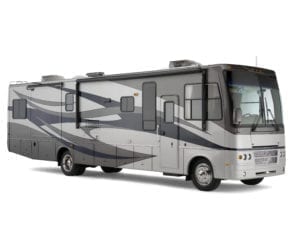
MOTOR HOME COVERAGE
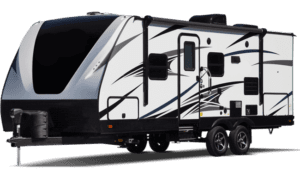
TOWABLE RV COVERAGE
From comprehensive coverage to exclusionary warranty plans, we’ve got versatile coverage options for your towable, travel trailer, or motorhome.
ARW’s unique mobile RV mechanic coverage makes repairs easier and quicker—and it comes standard with every new warranty plan.
At a time when RV repair shops are facing month-long backlogs and staff shortages, many RV owners are turning to mobile RV mechanics to get repairs done in time.
The problem: Most RV warranty companies only accept mobile mechanic repairs when the RV is completely disabled. And they only pay a tiny portion of the service fee.
For new customers, ARW now accepts repairs by mobile RV mechanics regardless of whether the vehicle is disabled.
Need your fridge repaired and don’t want your vehicle to sit in the shop for a month? Call a mobile mechanic, and ARW will cover it. We’ll even cover up to $500 of the service fee per issue—which comes in handy if the mechanic needs to make multiple visits to complete repairs.
THE BEST RV EXTENDED WARRANTY. PERIOD.
Whether your rig is a brand new motorhome, a 5th wheel, or a used trailer, when something breaks on your RV, the cost of repair can be astronomical. That’s why many travelers living the RV life think it’s a good idea to have an extended RV warranty, also known as a service contract, to protect themselves against costly repairs. A warranty lets you enjoy your RV to the fullest on the open road.
Just as RVers want the best RV for their money, they also want the best coverage at the best price. That’s where America’s RV Warranty comes in. No other warranty provider delivers the quality customer service or solid RV warranty coverage that ARW offers.
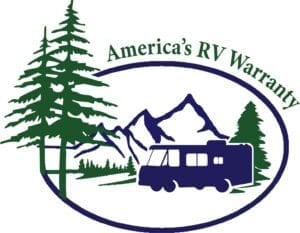
REPAIRS YOUR WAY, ANYWHERE
Our coverage can be used with any licensed repair facility or mobile mechanic in the USA or Canada.
PARTNERS, NOT BROKERS
We’re partners with our administrator, so we work closely together to process claims and resolve issues.
NO INSPECTION REQUIRED
Other warranty companies make you pay a third-party inspector before the warranty period, and can use this inspection against you later.
BACKED BY A-RATED INSURANCE
ARW provides reliable coverage that will last for the long-haul.


IN-HOUSE CLAIMS TEAM
With other warranty companies you are left to deal with the claims administrator during a claim. At ARW, our dedicated claims team ensures a hassle free experience.
TRANSFERABLE COVERAGE
If you sell your RV, you can use the coverage to boost the value and provide peace of mind for the buyer.
WE PAY ACTUAL COST
ARW pays full retail for brand new parts and covers diagnosis fees. That means less hassle and less out-of-pocket.
BBB® ACCREDITED
We deliver quality service where it counts, and our A+ rated Better Business Bureau (BBB®) business profile shows it.
THE BEST REVIEWED RV WARRANTY PROVIDER
Rvers across the country choose, trust, and recommend america's rv warranty above all others., average rv repair costs.
Even common RV repairs can hurt your wallet. All of these items are covered by our warranties.
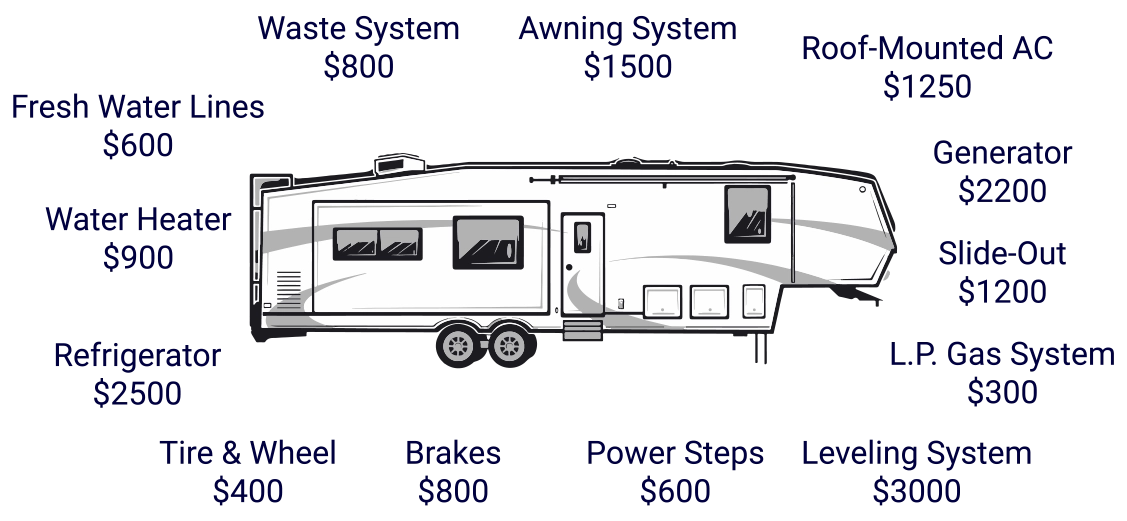
BENEFITS OF OUR WARRANTY PLANS
In addition to our mobile mechanic coverage, ARW goes above and beyond to bring RVers peace of mind and budget protection. No one does RV protection like America’s RV Warranty.
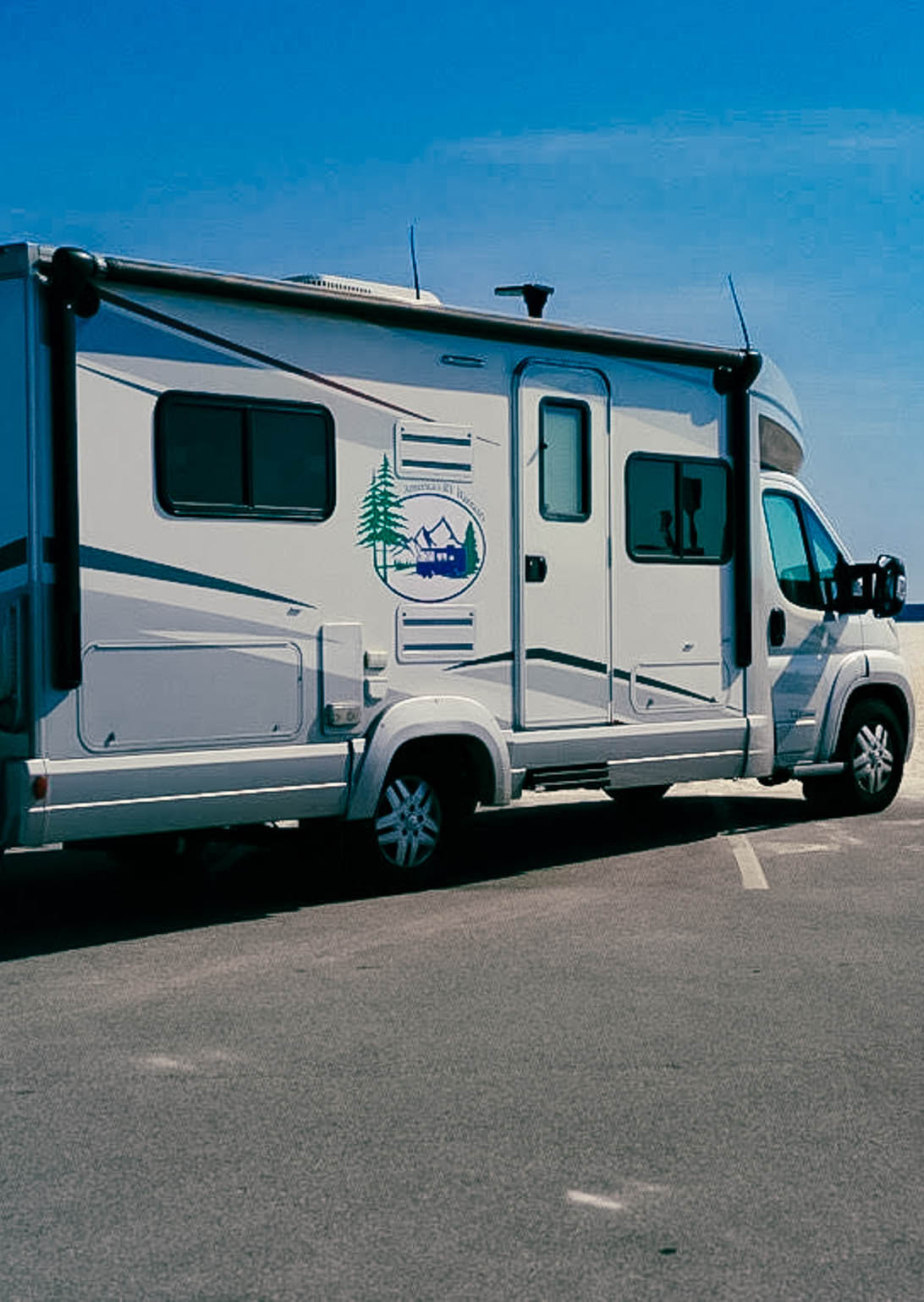
UNDERSTANDING RV WARRANTIES
RV warranties are known by many names. Some companies call them RV extended service contracts, others call them an RV extended service warranty (or simply an “extended warranty”). While technically a warranty can only be offered by a manufacturer, RV warranties offer the same–sometimes better–protection for your RV when compared to the manufacturer.
For the sake of clarity, RV warranties are really service contracts. These contracts dictate that when certain items on a RV break down mechanically, the warranty will cover some of the cost of repairs. Each warranty policy features a deductible.
This deductible is paid by the RV owner to the repair shop. When a repair is covered by the plan, the warranty will then step in and help cover the cost of parts and labor to fix the issue (terms and conditions apply).
ARW offers different plan options that cover different sets of items on the RV. This allows us to offer a plan to fit every RV and budget. We know that RV owners are happiest when they make an informed decision, so if you have any questions, please check the FAQ section below or call us at 844-970-0084.
WHAT'S COVERED?
ARW’s plans cover repair costs for all the major items on an RV. Whether you’re looking for engine protection or coverage for coach items like rooftop air conditioning, ARW has a plan for your rig.
- Transmission
- Fuel Delivery
- Chassis Air Conditioning
- Fresh/Waste Water System
- Heating System
- Interior & Exterior
- Slide-out Mechanism
- Kitchen Center
- LP Gas System
- Leveling System
- Roof/Basement AC
- Generator/Power Plant
- Entertainment
- Wear & Tear
- Seal & Gaskets
For in-depth coverage details, please visit our Plans page and select your RV type.
Comprehensive Protection
ARW’s warranty plans offer full protection against malfunctions and breakdowns, but there are exclusions to coverage. Physical damage, such as from accidents or weather, is not covered by any warranty–instead this will be covered by RV insurance. Remember, warranties cover repairs needed from regular, daily operation, while insurance covers issues from weather, accidents, vandalism, etc.
Other exclusions include maintenance and items that are replaced during maintenance. These items include brake pads and oil filters, for example. And finally, non-mechanical components are not covered. For example, if an RV’s kitchen refrigerator stops cooling, that falls under warranty coverage, since the repair will almost certainly have to do with the mechanical function of the refrigerator. If the refrigerator’s handle is loose and needs to be replaced, that would not be covered, as the refrigerator still fulfills its function of cooling food and beverages.
If you have questions about what exactly is covered, feel free to check out a sample contract. We think we have transparent terms, but then again we do this every day, so if you have any questions, please call us at 844-970-0084.
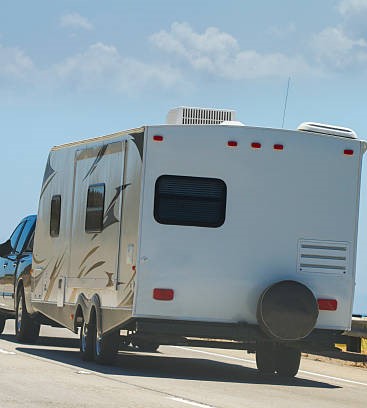
Benefits of Our RV Warranty Plans
In addition to our mobile mechanic coverage, ARW goes above and beyond to bring RVers peace of mind and budget protection. The value-added perks mentioned below are found in all our plans, from comprehensive protection plans to exclusionary plans. They’re also not dependent on the plan length, deductible, or plan cost. When it comes to RV protection, every RV deserves excellent customer service.
Stellar Customer Service
When you need repairs, ARW is there with a quick response that puts the customer first. Since we are partners, not just brokers, with our administrator, we’re able to ensure a speedy and transparent claims process. We have our own claims success representatives whose sole job is to ensure prompt and accurate communication between the RV owner, the repair center, the administrator, and ARW.
Additional Benefits
Besides the unbeatable warranty service, a plan from ARW comes with a few bonus features. We offer roadside assistance and additional warranty add-ons like wheel and tire coverage. We’ll shop your RV and auto insurance rates to ensure you’re getting the best deal. And our plans come with member benefits that include discounts on things like RV camping and pet benefits like pet insurance. We love our furry friends, so we want to help RVers make their lifestyle pet-friendly.
Specialty RVs
At this time, ARW offers an RV motorhome extended warranty for class A, B, and C motorhomes. We also offer warranties for towable RVs like travel trailers and fifth wheel trailers.
We do not currently offer warranty plans or specialty coverage for park models, horse trailers, or pop-up campers. Some specialty RVs are eligible for RV insurance, however.
Our Track Record
In the last few years, America’s RV Warranty has emerged as an industry leader. Our team is filled with professionals, some of us RVers ourselves, with long-standing knowledge in the general area of warranties. We are dedicated to helping our customers live the RV lifestyle economically and with peace of mind when they need it most.
FREQUENTLY ASKED QUESTIONS
- RV Warranty 101
- Using the Warranty
- Plans & Coverage
How can RV extended warranty coverage help me?
An extended warranty protects recreational vehicle owners from unexpected costs when something breaks down. RV repairs can be expensive. Our warranties offer peace of mind by covering those repair costs and getting you back on the road.
We cover all the essential mechanical components, systems, and appliances that keep your vehicle functioning, from the motor (we cover gas and diesel engines) and transmission to the septic, refrigerator, AC, water heater, fresh water system, slide-outs, and more.
How common are breakdowns?
An RV has all the potential issues of a house and a vehicle, so it's no surprise that even well-constructed units commonly suffer mechanical failure. RV manufacturers don't have the ability to build every item themselves, so they purchase many of the systems and appliances from third party companies, which can cause quality control problems in even top-of-the-line models. Approximately 30% of RVs will break down within two years of use. Almost 80% will need repairs by their fifth year of operation, and almost all will break down within ten years.
Why should I choose ARW?
Here are a few quick reasons why we think we're the clear choice for RV owners:
- We are a partner, not just a broker, with our plan administrator. This means we work closely with them to ensure that customers receive the coverage that they purchased as quickly, conveniently, and transparently as possible.
- Our plans are backed by an A-rated insurance company, so your coverage is guaranteed no matter what.
- Our customers can use any repair facility in the US or Canada, and we pay the facility directly without labor rate negotiation.
- No RV inspection is needed to begin coverage. Companies often use the inspection as a way to deny warranty claims later.
- We provide dedicated account managers, not just pushy salespeople, to ensure prompt communication and transparency throughout the life of your plan. Our excellent customer service department gives customers the attention they need to get back on the road.
Can I use a mobile mechanic with my RV extended warranty?
While most companies only allow you to use a mobile mechanic when your RV is completely disabled, ARW lets you use a mobile mechanic any time, for any repair. Since mobile mechanics require a service fee, ARW will cover up to $500 of any reasonable service fees for a given issue.
Are your warranties fully insured?
America's RV Warranty provides coverage that is backed by an A-rated insurance company. Beware of RV warranty companies who offer coverage backed by risk retention groups. These companies could go out of business and leave you without coverage or a refund. By choosing a company with coverage that is backed by an insurance policy, you can rest assured that you're covered for the long term.
Why is it called an extended warranty?
The term "extended" means that the coverage lasts for much longer than a manufacturer's warranty, which is often a one year warranty. Technically, extended warranties are not warranties—they are vehicle service contracts which cover repair costs in the event of a mechanical breakdown. Warranties can only be offered by RV manufacturers. However, they function just like a warranty and cover the same things a warranty covers, so throughout the RV industry they are known as extended warranties.
Extended service contracts vs warranties: which is it?
The simple answer is that extended warranties (like the ones offered by ARW) and vehicle service contracts are the same thing. These are contracts between a third party company and an RV owner that protect the owner against the high cost of repair when items on the RV break down mechanically.
In its most technical sense, a warranty can only be offered by a manufacturer, but as we’ve stated above, our extended warranties offer the same, if not better, coverage than what the manufacturer offers.
So there should be a clear distinction between a manufacturer’s warranty and any service contract. A manufacturer’s warranty is offered by the company that builds the RV, and typically protects the buyer against the replacement cost of some or all parts of the RV.
The benefits of a manufacturer’s warranty are short-lived, often lasting only a year. Even then, there are limitations to a manufacturer warranty. For instance, some of them do not cover labor, only parts. This is why many RVers see the value in purchasing an extended warranty even while their RV is still under coverage from the manufacturer.
Is a warranty the same as RV insurance?
A warranty and an RV insurance policy cover different issues. In simplest terms, insurance covers accidents and damage, while warranty policies offer a service plan to cover the costs of mechanical failures and breakdowns. This means that RV insurance assists with major repairs caused by physical damage, but doesn't help travelers with normal, everyday breakdowns. A warranty/service contract helps RVers plan their travel budget by removing the fear of a large repair bill caused by a major mechanical failure. Note: Depending on the RV class, a liability insurance policy may be required to operate the rig. Motorhomes require this coverage since they are motor vehicles, but travel trailers do not. For more information, read our blog post on the subject.
I have a manufacturer's warranty. Why should I sign up now?
You might need coverage earlier than you think. Manufacturer's warranties cover different items for different lengths of time, and some RV manufacturers offer only limited warranties that cover the first year after the RV purchase. By purchasing coverage while your manufacturer warranty is still in effect, you can lock in a better rate. Used RVs and older rigs cost significantly more to cover, so much so that owners often spend less total for more years of coverage when they buy early. Our warranties cover all items for the duration of the plan, so purchasing while you still have manufacturer's coverage helps you avoid a lapse in coverage. Keep in mind that many manufacturer warranties are not transferable, so even if your recreational vehicle is new to you, it may not come with a warranty. Ask the selling dealer to be sure.
Do your warranties include benefits in addition to the coverage?
Yes! Each warranty plan comes with a number of optional benefits for your RV, including things like roadside assistance, towing, and travel expense reimbursement.
In addition, your plan includes free enrollment in Emergency Alert Network and Money Tips, programs that protect your wallet and your loved ones. Visit our Benefits page for more information.
Does ARW cover full time use?
Yes! We love full-time RVers. Call us at 844-200-7314 to hear all about it!
What is an exclusionary policy?
While the mention of exclusions might sound sinister, exclusionary policies are actually the most complete protection plans available in the RV industry.
The term "exclusionary" refers to the way covered items are defined, and exclusionary plans are often defined in contrast to comprehensive coverage. Learn more about both types of coverage on our blog post about the different policy types.
The bottom line: either type of policy will help during a mechanical breakdown, and you should choose the one that fits your needs and your budget.
How much is an RV extended warranty?
There are so many factors that affect the cost of RV warranty coverage : the plan length, the details of RV, the level of coverage desired. It’s impossible to give out one price. Even a range is difficult. The least expensive travel trailer plans start at around $1500. And of course, there are plenty of RV repair bills in excess of $1500, and most RVs need major repairs in their first several years on the road, which makes a warranty a cost-effective, budget-friendly alternative to a simple savings account.
Does an RV warranty cover water damage?
If there are leaks or line breaks in an RVs plumbing, an RV warranty will cover the cost to repair those lines. This is true of motorhome coverage and trailer coverage. However, the cost to repair or replace items that have suffered from water damage is not covered by an RV warranty. Damage from water is instead covered by RV insurance. For a more detailed coverage comparison between a warranty and insurance, check out our blog post on the differences .
How do RV warranties work?
An RV warranty protects the RV owner against expensive repair bills when items on the RV suffer mechanical breakdown. When the RVer takes their rig to a repair facility or uses a mobile mechanic, the warranty will pay for parts and labor minus a deductible (terms and conditions apply to the amount paid).
For example: An RV owner’s rooftop air conditioner no longer cools properly. If they have ARW, they can call a mobile mechanic. The mechanic decides the rooftop air conditioner has to be replaced. The RV owner pays the deductible set by their plan directly to the mechanic, and ARW covers the remaining cost for parts, labor, and mobile mechanic’s service fee (sometimes called a trip charge).
Are RV warranties worth it?
We think they are. But you’ll ultimately have to decide for yourself. An RV warranty has the advantage over a simple savings account that your protection isn’t limited by how much you have saved. Many RVers prefer the peace of mind and budget protection they receive when they have a warranty, especially once they’ve used it for repairs.
Plus, when you have a warranty, you’re not constantly worrying about whether or not you’re getting taken advantage of at the repair shop.
Where can I go for repairs?
You can use any licensed repair facility or mobile mechanic in the United States or Canada—we'll even pay the service fee to the mobile mechanic. Some people prefer to return to their dealership for repairs. That's fine with us, and it does not affect your service plan.
How do I file a claim?
We walk you through the steps on our Claims page.
All you have to do is inform the repair facility that you have a service plan and mention that ARW is your warranty provider. We'll take care of the rest.
What if I break down after hours?
If you have an emergency after regular business hours, you can call our 24/7 concierge service to receive roadside assistance. They will also help you to submit a claim online.
Do I have to pay for the repair and wait for reimbursement?
Nope. We pay the repair facility directly for any covered repairs.
Is the deductible charged on each item?
No. The deductible is charged per claim, which is essentially per visit to the repair facility. If you go in for repairs, whether you need one covered item repaired or ten, you'll pay the same deductible.
Will you tow my disabled vehicle to a service center?
Yes! If your RV or tow vehicle breaks down roadside or is immobile in a campground or RV Park, we'll tow it to the nearest RV repair center.
Can I use my warranty for routine maintenance?
America's RV Warranty protects against breakdowns, so we're here for you when the unexpected happens. Preventing those issues is the RV owner's responsibility, and maintenance is the best protection against breakdowns in the first place.
Is the coverage transferable?
Yes. If you sell your RV, you can transfer the coverage to the buyer. The warranty acts as an incentive to buy: because the new owner has no experience with the vehicle, a warranty assures them that they have coverage for problems that may arise.
How long does coverage last?
We offer plan lengths from one to eight years, which is longer than any other nationwide company.
Plan lengths depend on the make, model, age, and mileage of the RV—coverage extending to the 8th year is only available on newer units. To learn your vehicle’s eligibility, get a free quote.
Do I need an RV inspection to obtain coverage?
No. Warranty companies that require an inspection often use it against their customers during the claims process.
Can I cancel my plan if I don't need it?
Yes. If you change our mind about your warranty, you can cancel any time. During the first 60 days of your plan, you will receive 100% of your money back. After that, you’ll receive a pro-rated refund.
Unlike coverage financed through a dealership, with ARW you’ll receive your refund in less than 30 days. That’s better than waiting until the end of your loan to see a refund.
Does ARW offer different levels of coverage?
Yes. We want Rvers to be able to get coverage that perfectly fits their needs, so we offer multiple levels of coverage—from drivetrain coverage to exclusionary policies. Click to view motorhome plans or towable plans. We also offer optional coverages such as wheel & tire, navigational (including items like the compass and GPS system), power surge, and consequential damage. Customers can also get a good deal by purchasing roadside assistance at a discount when they sign up. It's always a good idea to have help ready to go when you're stranded on the side of the road.
Where should I purchase my extended RV warranty?
RVers save a lot of money in the long run by purchasing their warranty products directly from warranty providers instead of through RV dealers.
RV dealers make a substantial commission off the sale of the warranty coverage, sometimes more than off the sale of the rig itself. The cost of the plan is often financed, which means that you are paying interest on an already-expensive plan.
Can I read through the fine print before I sign up?
Of course! Like any reputable company, we make all contract details and paperwork available online for all to see.
To view a sample contract, visit either our Motorhome Coverage page or our Towable Coverage page, then scroll down to find the "Terms of Service" button. That will provide you with our most up-to-date terms.

- Skip to main content
- Skip to secondary menu
- Skip to primary sidebar
- Skip to footer
Crowsurvival
Experience the Best that RVs, RV Accessories, Campers, Boats, Camping, Hiking & Fishing has to offer.
Best RV Extended Warranty Providers – A Must Read
Jonathan Holmes 5.0 Rated 5.0 out of 5 5.0 out of 5 stars (based on 46 reviews)
Thank you for reading our post, please rate this article at the end.
Last Updated on October 13, 2023 by Paul Clayton
Table of Contents
Should you get an RV extended warranty or not? Who are the Best RV extended warranty providers? This is a hot topic not only among RVers but owners of any type of vehicle as well. And it’s understandable why – an extended warranty is a big investment.
If you’ve been thinking about protecting your RV with an extended warranty and have been looking for the best RV extended warranty providers, this material is for you. Below, we’ll provide you with a couple of options to consider, as well as will help you understand how to get a good deal.
Best RV extended warranty providers
There is no shortage of RV extended warranty providers out there. However, among them, only 2 seem to consistently satisfy their buyers – Wholesale Warranties and Good Sam. They aren’t perfect, but they do look better than other contract providers on the market.
Let’s now overview the services of each along with their downsides, if any.
Good Sam Extended Service Plan (Highly Recommended)
One thing that you instantly notice with Good Sam’s is how much info they have on their website in regard to their warranty plans. In particular, they provide information on qualifications for RV owners, as well as list what is covered and not covered by their plans. From the get-go, you are getting more information to analyze with Good Sam.
Good Sam offers warranty plans for motorhomes and for trailers, 5th-wheels, and pop-ups. For each plan, Good Sam provides a list of what is covered and not covered, as well as the qualifications that your RV needs to satisfy. But unlike Wholesale Warranties, it seems that Good Sam doesn’t offer a coach-only plan.
Good Sam refers to their warranty plans as insurance, probably to make them stand out from competing plans. However, their plans are indeed warranties since they only cover mechanical failures, not failures caused by physical damage.
As a bonus to their warranty plans, Good Sam offers lodging and meal benefits – up to $100 a day for 5 days, plus $60 a day for 5 days for car rental by motorhome owners. Good Sam also offers free RV inspections at Camping World SuperCenters as often as necessary for contract buyers.
Additionally, Good Sam’s Extended Service Plan features the so-called Preferred Provider Network. With 1,000 service facilities and 100 Camping World locations, the network offers 10% discounts and a 90-day warranty on non-covered parts and labor. If you were to want to replace something not covered by the warranty, you could do so with a small discount at a Preferred Provider Network location.
So all in all, Good Sam appears to offer a wider array of services and bonuses than Wholesale Warranties, with the downside of being seemingly more nitpicky about the contract terms.
- Plenty of information is available on the Good Sam website.
- A couple of interesting benefits are available.
- Deductibles per occurrence.
- Labor and part costs are included in the contract.
- Good Sam plans are backed by QBE Insurance, an A-rated insurance company that has been on the market since 1886.
- Warranty plans are transferrable.
- 100% refunds within the first 30 days and pro-rated refunds past 30 days.
- RVs can be repaired at any repair facility.
Disadvantages:
- Seem to be more nitpicky than Wholesale Warranties.
- Good Sam appears not to offer coach-only plans for motorhomes.
You can check out Sam’s here .
Wholesale Warranties
Wholesale Warranties appears to be the cheaper contract provider among the two, though you won’t know until consulting with them directly since it will depend on your RV’s condition. In addition, RVers seem to be more satisfied with Wholesale Warranties than with Good Sam.
Wholesale Warranties offers 3 protection plans for RVs – motorhome warranties, travel trailer & 5th-wheel warranties, and pop-up camper warranties. Needless to say, one would need to go with the plan which corresponds to the RV they own.
Under the motorhome extended warranty, Wholesale Warranties cover a plentitude of motorhome components. In fact, they claim that they cover parts that aren’t usually covered by other contract providers, including things like wiring or the radiator. Aside from that, of course, this warranty plan covers the RV engine and transmission.
The motorhome extended warranty, in its turn, comes in 3 packages:
- Exclusionary, which is the most comprehensive package.
- Comprehensive, which basically is a listed component RV warranty. This warranty offers limited coverage compared to the exclusionary package.
- Coach-only package, which specifically excludes the powertrain and engine components. This warranty is suitable for those whose RV’s mileage is ineligible for other motorhome plans.
The travel trailer & 5th-wheel warranty differs from the motorhome warranty in that it doesn’t cover engine components since there are none in towable RVs. Wholesale Warranties offers two packages for their travel trailer & 5th-wheel plans – exclusionary and comprehensive.
The last warranty package covers pop-up campers. Unfortunately, Wholesale Warranties doesn’t provide a whole lot of information about this package, so there is some digging that you will need to do yourself.
And all in all, Wholesale Warranties’ website provides a little less information about their plan coverage or requirements. Good Sam is better in this regard, though there still are some things that will need a consultation with the contract providers.
In addition, a thing to keep in mind is that Wholesale Warranties service contracts aren’t available in California. If you live in the state of California, you won’t be able to get an RV extended warranty from these guys.
All in all, the benefits and downsides of Wholesale Warranties services, as far as we could find out, are the following.
- Consistently positive online reviews.
- Deductibles per visit.
- Labor and parts are covered for approved repairs.
- Warranties covered by A-rated insurance carriers, as claimed by Wholesale Warranties.
- Warranty plans are transferrable and cancellable.
- You can take your RV to any licensed repair facility in the US.
- Not so much information is available on the warranty plans on the company website.
- Plans aren’t available in California.
What is an extended warranty?
To avoid confusion, let’s first understand what an extended warranty is and how it differs from a traditional manufacturer warranty.
A warranty, in general, is a guarantee of a product’s integrity for a certain period of time. During the duration of the warranty, the maker of the product is responsible for the repair or replacement of defective parts that are covered by the warranty.
A manufacturer warranty is a warranty that is issued by a manufacturer after a brand-new product has been bought. The price of this kind of warranty is usually already included in the product.
An extended warranty is a warranty that provides extended coverage beyond the manufacturer’s warranty. In other words, an extended warranty is a kind of warranty you can buy after the manufacturer’s warranty has expired. This extended warranty may or may not be issued by the original manufacturer of a product.
Unlike manufacturer warranties, providers of extended warranties do charge money for their services. In return, they are obliged to cover the costs of those components’ repair which are covered by the extended warranty.
RV extended warranty vs RV insurance
It may seem that an RV extended warranty and RV insurance are the same things, but this isn’t quite right. In fact, they are the inverse of one another.
RV extended warranties are specifically designed to cover the repair costs of mechanical failures which have not been caused by physical damage. Conversely, RV insurance policies are designed to cover the repair costs caused by theft, collision, or physical damage.
Another thing that differs between an extended warranty and insurance is that the cost of extended warranties across providers can vary significantly. RV insurance, on the other hand, is sold by many major providers, which means less price variance. In addition, insurance plans can often be bundled to save money.
Extended warranties can be purchased for a significantly longer period of time, possibly reaching a decade for brand-new RVs. Insurance plans usually need to be renewed more often.
With that being said, the differences between RV extended warranties and insurance plans mean that you could complement one protection type with another. If you buy both an extended warranty and an insurance plan, you will be able to safeguard yourself from sudden costs incurred by both physical damage and mechanical breakdown. Of course, this will cost you more, but the protection level will also be higher.
Why get an RV extended warranty?
RV extended warranties cost money, and quite a lot of money, mind you. So why would you even want to buy an extra protection plan for your RV? Here are a couple of reasons.
Peace of mind
The very first benefit that buyers of RV extended warranties seek is peace of mind. Surprise expenses in RVs can be costly. Without a warranty, there is always a risk that something could break in your RV unexpectedly. And the older your RV, the likelier it will be.
What’s worse is that you can never predict what and when will go wrong, so you could possibly have to pay large sums for repairs at a time when your budget is not ready for it. With an RV extended warranty, you wouldn’t have to think about dealing with surprise costs.
Easier budgeting
RV repairs tend to be quite costly, often reaching $300 per hour. And you would probably agree that it would be more efficient for you to pay for an extended warranty contract at a time when you are ready for it than to have to deal with issues that could occur at a time when you don’t have the budget to resolve them with.
In addition, by paying a monthly fee for the extended warranty, you are basically distributing repair costs over a longer period of time. And paying smaller amounts of money each month certainly is more budget-friendly than having to pay a one-time large sum for a costly repair.
Aside from that, the warranty can ensure you from price changes on the market. Under a contract, even if a repair facility doubles its prices, the administrator won’t be able to force you to pay more money. You will be obliged to pay the price indicated in the contract, and no price changes should impact the amount of money you pay for your warranty.
Lastly, administrators certainly don’t want to overpay for the services provided by repair facilities. Due to this, it is likely that they will do their best to ensure that the repair facilities aren’t overcharging for their services.
Better RV resale value
An RV that is covered by an extended warranty is going to be more attractive to potential buyers. In addition, you may be able to put a higher price on your RV, though how much exactly is beyond the topic of this material.
When you should not get an RV extended warranty?
There also are certain cases when you should not buy an extended RV warranty. Among them are the following:
- Your RV’s manufacturer warranty hasn’t expired. Needless to say, there is no point in buying an extended warranty if your RV is still covered by the manufacturer’s warranty unless you are looking to cover parts that are not protected by the manufacturer’s warranty.
- You want to cover regular maintenance costs. RV extended warranties do not cover costs of maintenance like the replacement of wiring, spark plugs, filters, or whatnot.
- You want to cover pre-existing conditions. A pre-existing condition is one that has occurred before the purchase of an RV extended warranty. Warranties do not cover such issues, which is reasonable.
- You want to get roadside assistance. Some contracts do provide roadside assistance, but it is usually quite limited. Specialized roadside assistance plans would be much better for this purpose.
Parties of an RV extended warranty contract
Now that we understand what an extended warranty generally is, let’s overview the parties of an extended warranty contract.
The buyer is obviously you, the owner of an RV and the purchase of an extended warranty.
Seller/contract provider
The contract provider or seller is responsible for completing the extended warranty contract, as well as for calculating the contract fee and collecting it from you. Contract providers can be manufacturers, dealers, or third-party extended warranty providers.
Administrator
The administrator is the party (usually a company) that is actually responsible for paying out warranty claims. Aside from that, the administrator decides which claims are covered or not covered by the warranty.
Administrators usually take the most significant portion of the contract fee and allocate it to a claim reserve, from which your possible future claims are going to be paid out.
Insurance company
The insurance company basically makes sure that your claims get paid out even if the administrator goes broke. It is very important that the administrator you are dealing with be backed by an insurance company. Otherwise, if it goes broke, you will have no legal options for receiving reimbursement.
Repair facility
The repair facility is the party (a contractor, an RV dealer, RV service center, etc.) that carries out the repair works. After completing the repairs, the repair facility submits the repair plan and its estimated costs to the administrator. The administrator then assesses whether the claim is covered by the contract and how much needs to be issued to you.
Things to consider in an RV extended warranty
Now, we want to talk about the things that you should pay attention to when searching for an extended warranty. An RV extended warranty is quite an investment, and you would probably want your investment to have returned for you. Knowing what we are going to describe below should help you with picking a good deal.
Transparency
In our opinion, the most important thing to look for in an RV extended warranty provider is transparency. You should be able to find all the information about the contract provider, as well as the other parties of the contract. Otherwise, you will be buying a warranty without knowing everything you should know about.
Speaking of the warranty, it is crucial that the contract provider provides you with the full text of the warranty. If they do not, you will not be able to fully understand what is covered by the warranty and what is not.
Even though probably any contracted provider you may come across will provide you with the warranty text, you should be wary of those who do not. Moreover, you should outright avoid such providers and look for someone who is more transparent.
It is crucial that you understand what exactly is covered by the extended warranty. Make sure to check what components the warranty specifically includes in the coverage and which ones it specifically excludes. This will allow you to avoid unpleasant surprises in the future.
Aside from that, check whether the administrator covers shipping costs and tax payments. These costs are usually not covered but do make sure to inquire about this not to come across any surprises in the future.
Types of RV extended warranty coverage
There are 4 types of extended warranty coverage that you should know about – exclusionary, listed component, motorhome, and coach-only. Let’s overview each of these coverage types.
Exclusionary contract
An exclusionary contract is desired by most RVers out there, even though it costs more than other types of coverage. There are several reasons for this.
This type of coverage includes all the aspects of your RV except for those that are specifically excluded by the contract. Due to such a formulation, it is easier for people to grasp what is actually covered by the extended warranty. If the contract doesn’t specifically tell that some part isn’t covered, then it is covered by the warranty.
Listed component contract
A listed component contract specifically lists the components of the RV that are covered by the extended warranty. Anything that is not on the list will not be covered.
A listed component contract is a cheaper option than an exclusionary contract. In addition, if there are certain things that you would want to take care of yourself, a listed component contract may be able to provide you with better options.
RVers find it quite difficult to determine what is actually covered by this type of warranty and what is not. Due to this, if allowed by their budget, people seek to go for an exclusionary contract instead.
Motorhome contract
A motorhome extended warranty includes coverage of a motorhome’s powertrain and engine. With a regular extended warranty, these items wouldn’t be covered by the contract. Thus, if you have a motorhome that satisfies the contract provider’s requirements, go for a motorhome contract.
Coach-only contract
Coach-only contracts are motorhome plans that specifically exclude the powertrain and the engine assembly of an RV. You should go for a coach-only contract in two cases:
- Your motorhome’s engine is still covered by the manufacturer’s warranty.
- Your motorhome’s mileage makes it ineligible for powertrain & engine coverage.
Contract Insurance
You may have heard a couple of horror stories about administrators going bankrupt and contract buyers being unable to receive reimbursement. This can happen if the administrator of your RV extended warranty contract isn’t backed up by an insurance company or if the insurance company isn’t reliable and has a bad rating.
Due to this, it is very important that you research who the insurance company backing the administrator is. Check out its financial condition, as well as look for its ratings. For the highest security, look for an administrator that is insured by an A-rated company.
Also, avoid administrators backed up by a risk retention group. Their activity isn’t regulated as well as that of insurance companies, so it is a venture to work with an administrator backed up by a risk retention group. A contract with such an administrator may be cheaper, but we think that peace of mind and reliability are far more important than price.
It would also be nice if the contract provided you with assistance should any issues arise after the purchase of an RV extended warranty. Unfortunately, contract providers very rarely provide post-purchase support to the buyers of their contracts. And if a dispute arises with your contract’s administrator, for example, you probably won’t be able to resolve it in your favor.
If you can find an extended warranty provider who will also serve as a mediator in disputes, you should go for a contract with them even if it costs more than other, non-mediated contracts.
RV requirements
Contract providers usually have certain age requirements that your RV needs to satisfy. In the case of motorhomes, they may also have mileage requirements. Some contract providers also place a limit on the purchase price of RVs. Since these are very individual with each contract provider, you will need to check each contract provider’s policy yourself.
Claim payment
Pay special attention to how the administrator and the repair facility handle warranty claims. Ideally, the administrator should pay the repair facility directly, without you having to make any upfront payments and then trying to get a reimbursement. You should avoid such administrators.
Likewise, avoid repair facilities that do not work with warranty companies directly and instead demand that you pay for the repair out of pocket and then go and reimburse the amount paid on your own.
Such approaches would make receiving reimbursements inconvenient. If the administrator works with a repair facility directly, you won’t need to fill out any paperwork and waste time on getting a reimbursement.
But if the administrator doesn’t work with repair facilities (or the other way around), it will be up to you to have your warranty claims paid. And if, for example, one of the parties refuses to work with the other, you will have a lot of headaches reimbursing your repair expenses.
Payments to the repair facility
It would be excellent if the administrator paid for the repairs with a corporate credit card. If the payment is made with a check, you may have to wait until the repair facility receives the payment before getting on the road.
Flexibility
Some extended warranty contracts require you to repair your RV at specific facilities or networks. This will limit where you can go for service, and if something goes wrong away from the required facilities, you will be unable to make use of the benefits of your warranty policy to cover your expenses.
So ideally, you should look for a contract that doesn’t restrict you to just a few repair facilities.
Transferability
It would be a good idea if your RV extended warranty was transferrable. This would come in handy when selling your RV – if your extended warranty hasn’t expired, the remainder would be transferred to the new owner of an RV. A warranty on your RV would make it more attractive to buyers, allowing you to sell it quicker.
And for cases when you don’t want to transfer the extended warranty to the new owner, check whether it is possible to cancel the contract and get a check back.
Cancellation policy
Usually, contract providers offer some kind of cancellation policy to encourage people to buy their contracts. With a cancellation policy, one would be able to get a refund should they not like the warranty services.
First of all, check what’s the cancellation period. Is it within 30 days, 60 days, or more? Is there a pro-rated refund based on the time left on the warranty? Are there any administrative costs associated with the refund that need to be covered by you?
Keep in mind that if the administrator has paid claims before the refund, the refund will likely be reduced by the amount of these claims. This is reasonable, so don’t be surprised if the cancellation policy requires this.
Deductibles
If you’ve ever dealt with insurance companies, you probably understand how a deductible works.
For those who are unfamiliar with this concept, a deductible is the amount of money that you need to pay out of your pocket before the administrator covers the expenses. For example, if the repair of your RV costs $400 and you need to pay a $50 deductible, you pay those $50, and then the administrator pays the remaining $350 to the repair facility.
Some extended warranties do imply deductibles, while others don’t. But it isn’t easy to say which kind of warranty would be better since other factors – like the ones mentioned above – are often more important when making a decision.
Deductibles can be per visitor per item. As a general rule, you should seek an extended warranty that requires you to pay a deductible for each visit.
As implied by the name, per visit deductibles are paid for each visit regardless of how many items in your RV are repaired or replaced. Conversely, you pay a per item deductible for each item repaired, even if the repairs were done during a single visit.
Aside from type, it is also important to consider the amount of the deductible. Typically, the higher the deductible, the cheaper the policy is. And this could mean quite significant savings for you in the long term.
Inspection policy
Administrators usually require an inspection of an RV before the conclusion of a contract. A pre-purchase inspection is done in order to identify any pre-existing conditions, or issues that have occurred before the purchase of the contract. As you would expect, pre-existing conditions are not covered by the warranty.
Even if the administrator doesn’t perform an inspection, should you file a claim for a pre-existing condition, they will be able to determine that it has occurred before the purchase of the contract.
As a result, your claim will be denied, and you would lose precious time that you would otherwise spend on dealing with the issue. In addition, your credibility in the eyes of the administrator may decrease.
So, to safeguard yourself from any similar issues, you may want to go for a contract that allows for an RV inspection.
Extended warranties sometimes also offer such useful benefits as roadside assistance, lodging reimbursements, emergency repair provisions, and many others. These benefits can come in handy in an emergency. But keep in mind that they often have low dollar limits.
Tips to follow when buying an RV extended warranty
Now, we’d like to give you a couple of tips to follow when buying an RV extended warranty. They should allow you to get the most out of your deal, as well as avoid unpleasant surprises and disappointments in the future.
Understand the terms of your contract
Reading through dozens of pages in an extended warranty contract may be exhausting, but it is a thing that you absolutely must do.
If there is someone who you could entrust with reviewing the contract, ask them to explain its clauses to you. If you know no one with expertise in this field or if hiring a professional is too expensive for you, read over the contract slowly until you understand it fully.
If you do not understand its provisions, ask the contract provider to explain them to you. Of course, you will need to keep in mind the conflict of interest – the contract provider will want to sell the contract no matter what, while you will want to get the best deal possible. However, a good contract provider will do their best to help you understand the ins and outs of the warranty contract.
Understand what is covered by the warranty
This is an area that very often causes a lot of confusion. The contract may explicitly indicate what is covered and what is not covered, but people nonetheless sometimes overestimate the coverage of their warranty and get surprised at a reasonable claim rejection.
Do keep in mind that many things that should be routinely replaced by you are usually not covered by the base contracts. Among these things are tires, wheels, lights, mirrors, batteries, and other similar items that require replacement from time to time.
Cosmetic items like paint, as well as general maintenance items, aren’t covered as well. The contract provider may offer additional coverage options, but don’t expect them to make your warranty comprehensive – no extended RV warranty is going to safeguard you from absolutely all expenses.
Also, be aware that there is a thing called c onsequential damage . This term refers to the damage that has been caused by a non-covered part to a covered part. Many RV extended warranties do not cover consequential damage, so be mindful of that. However, the contract provider may offer an option for covering consequential damage as well.
Lastly, if you are not sure whether some item is covered or excluded from the coverage, ask about it from the contract provider.
Let the administrator inspect your RV
You should also let the administrator inspect your RV if they want it. In fact, you should seek your RV to be inspected for a couple of reasons.
First of all, if no pre-existing conditions are discovered during the inspection, there is less chance of a claim denial on the basis of a pre-existing condition.
Secondly, as we’ve discussed above, RV inspection allows you to save time on claim denial on a pre-existing condition. Even without an initial inspection, the administrator would be to determine whether a problem had occurred before the contract conclusion or not. This will lose you time, as well as may decrease your credibility and force the administrator to review your consequent claims with extra scrutiny.
Lastly, the administrator may discover an issue that you were not aware of. This is possibly the biggest benefit of an RV inspection since it allows you to deal with the problems present in your RV and avoid consequential damage. And you can be sure that consequential damage caused by a pre-existing condition will not be covered no matter the contract.
Realize that the administrator will want to avoid paying out claims
Extended warranty providers do business, and you need to realize that the contract administrator will seek to avoid paying out claims whenever possible. In fact, they won’t do this by breaking the contract – on the contrary, they will use the uncertainties and ambiguous points in the contract against you.
And without a good lawyer, there is pretty much nothing you can do about it. Your only choice is to trust the administrator’s honesty. This actually is an issue far beyond RV extended warranties, but you should still know about it.
This is why you should carefully read and understand absolutely everything in the warranty contract. Especially pay attention to the fine print. However, you should understand that you may be unable to spot ambiguousness and uncertainty in the contract unless you are an experienced lawyer. Due to this, if you can, seek professional assistance with signing your RV extended warranty contract.
Get an extended warranty on your RV as soon as possible
If you are planning to get an extended warranty on your RV, do it as soon as possible. If you didn’t know, the price of an extended RV warranty is evaluated on a case-by-case basis. And the condition of your RV is going to play a huge rule in the price formation process.
The older your RV, the likelier it is that something in it will fail. Consequently, your RV poses a higher risk for the administrator since they will likely have to cover mechanical failures more often. As a result, the price of extended warranties for older RVs is higher.
This doesn’t mean that you should rush a decision and go buy an extended warranty today. You need to think over its benefits and disadvantages very meticulously.
In addition, if your RV is still covered by the manufacturer’s warranty, there is no point in purchasing an RV extended warranty, unless you are looking to cover some specific components that aren’t covered by the manufacturer’s warranty.
An extended RV warranty is an absolute must-have if you’re considering traveling full time in your RV.
Final words
Hopefully, our content has given you a full picture of extended warranties. Extended warranties have risks, but their benefits may actually outweigh these risks for you.
The good old self-insurance is still a thing, and for some people, it is going to be a much more feasible option than buying an extended warranty. But if you do find that you need the benefits of RV extended warranties, maybe you should give them a try.
Related posts:
- Affiliate Disclosure
Our Love for this stuff, unfortunately, does not pay the bills. Our audience supports us. We may earn an affiliate commission when you purchase through links on our site. This does not mean your purchase price will be higher. Sometimes, it could be lower due to our relationship and volume with the merchant. So shop with confidence. You are getting a good deal!
Terms and Conditions - Privacy Policy
Understanding Extended Warranties
Finding coverage that's right for you.
- 10/18/2001 (updated 8/15/2017 )
You're at the car dealership about to exchange a significant amount of money and a slew of signatures for a new (or new-to-you) vehicle. The heavy lifting may be done, but the job isn't quite complete. You still need to decide whether you want to buy an extended warranty.
This article's intent isn't to tell you if purchasing a warranty is a good or bad decision, although we do have tips that might help you decide if an extended warranty is right for you. Instead, this is designed to help you understand the differences between options you'll be offered if you decide you'd like longer-term protection.
But first, a disclaimer: The term "extended warranty" is actually a misnomer since it isn't really a warranty at all. An extended warranty is actually an insurance policy on your vehicle, a safeguard against expensive, unforeseen repairs. It covers repairs for an agreed-upon period of time and miles. True warranties, though, are included in the price of the product. Extended auto warranties are really vehicle service contracts because they cost extra and are sold separately. But to avoid confusion, we will continue to use the term extended warranty since that's the term you'll hear most often.
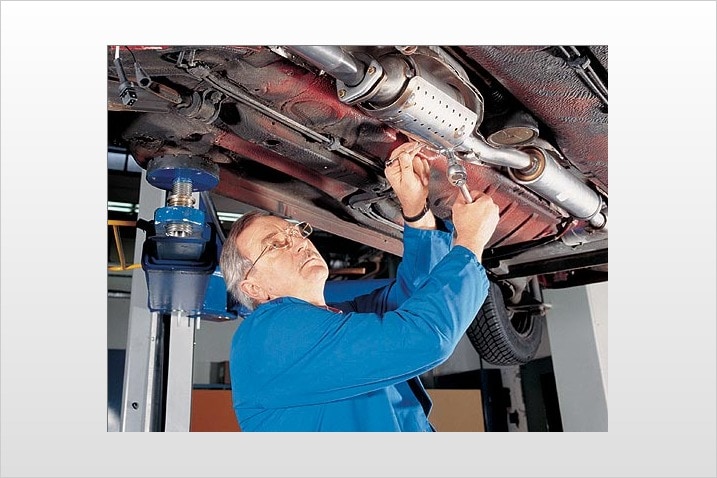
An extended warranty can help make sure you don't have to pay through the nose for unexpected repairs.
Two Types of Extended Warranties
When it comes to extended warranties, there are two primary types: those offered by the carmakers (also known as original equipment manufacturers or OEMs) and aftermarket warranties offered by third-party vendors.
An OEM would be a carmaker such as Chevrolet, Ford or Toyota. A third party would be an insurance or warranty company that isn't directly affiliated with a car brand.
See Edmunds pricing data
Has Your Car's Value Changed?
Used car values are constantly changing. Edmunds lets you track your vehicle's value over time so you can decide when to sell or trade in.
Manufacturer Warranties
Warranties offered by the OEM come in two varieties when a vehicle is new: powertrain and "bumper to bumper." A powertrain warranty is responsible for covering your engine and transmission against defects in workmanship that would cause either your engine or transmission to not operate as intended.
A bumper-to-bumper (sometimes called "limited") warranty will cover most other items in the vehicle. In addition to major components under the hood, bumper-to-bumper warranties also cover things like navigation systems, power seats, onboard computers and various other electronics.
An extended warranty from an OEM will usually mimic what it offered when the vehicle was new, extending the length of the coverage and the allotted mileage. Some will throw in extra benefits such as roadside assistance.
When picking out which warranty works best for you, you may be offered to select one with or without a deductible. Just like your auto insurance, the higher the deductible, the lower the policy will cost. The good news is that the deductibles for OEM warranties tend to be minimal, rarely exceeding $200.
Third-Party Warranties
Many third party or so-called aftermarket warranties offer similar coverages as warranties provided by an OEM. However, some third-party warranties have exclusions, rules and requirements that OEM warranties often don't. The downsides of some third-party warranties include strict limitations on where you can have your vehicle fixed and hefty deductibles. Often there will be no guarantee that OEM parts will be used.
Another key difference is how the coverage is administered. A third-party warranty may require you to pay for a repair out of pocket and file a claim to be reimbursed later. This process isn't always quick, and it may take months to recoup what you paid for covered items. If you're considering a third-party warranty, know the payment expectations up front.
Beyond these shortcomings, third-party warranties tend to cost less than those offered by the OEM. In some cases, a third-party warranty might be the only available option. If you're buying a used Ford at a Hyundai dealership, for example, it's unlikely the Hyundai dealership will be able to offer you a Ford OEM warranty because it isn't a Ford dealer.
If you're considering purchasing a third-party warranty, take your time and read the coverage details before you agree to have it included in your purchase.
Know Before You Decide to Buy
- Are you already under warranty? To what extent is your vehicle already under warranty, and is this coverage in sync with how long you anticipate owning it? If, for example, the vehicle has a factory warranty of three years or 36,000 miles, and you plan on keeping it for two or three years — with an anticipated annual mileage of about 10,000 — an extended warranty may not be right for you. You'll likely be covered under the manufacturer's plan. However, an extended warranty may make a lot of sense if you're purchasing a used vehicle that is out of warranty or close to being out of warranty and you intend to drive the car until the wheels fall.
- How long will you actually be covered? If you purchase a seven-year, 100,000-mile warranty on a used vehicle, for example, determine when the miles and time actually begin. Does the coverage begin when you take ownership or from when the vehicle was originally sold new? Before you sign, know exactly what you're paying for.
- What's covered? What isn't? The distinctions between the various plans might seem slight, but they can prove quite important. If you've got serious concerns about the electrical system in a vehicle, or you're primarily concerned with the powertrain, make sure the warranty you're considering covers the items you're looking for. Take the time to read the inclusions and exclusions before you sign.
- Can you cancel the warranty later? Some states allow you to cancel a warranty well after purchase. If allowed, you'll receive a prorated refund amount. If this warranty was bundled into an auto loan, your principle amount will be reduced. As a result, the number of payments you have to make will also be reduced. However, the payment amount will remain the same.
Do you have a separate budget for maintenance? You should. As a rule, extended warranties do not cover scheduled maintenance items such as oil changes, timing belt replacements or tune-ups. Most extended warranties don't cover items that wear out, such as brake pads and windshield wipers.
4 More Extended Warranty Tips
- You don't have to buy the warranty the same day you buy the car. You can sleep on the idea and decide later. But if you're financing your vehicle purchase, buying the warranty the same day should allow you to add the warranty costs into your loan.
- It is important to have recommended services done on schedule. Some warranty companies will refuse to cover a repair if the owner can't provide proof that the car has been serviced in accordance with recommended guidelines.
- According to the Federal Trade Commission, you are generally not required to buy an extended warranty in order to qualify for an auto loan. "If the dealer tells you that you have to buy a service contract to qualify for financing, contact the lender to find out if this is true," the FTC advises .
- If you are purchasing a used car from a dealership, the vehicle will likely have a Buyer's Guide affixed to the window that explains what warranty is included with the purchase.
Purchasing an extended warranty isn't the right move for every car shopper, but millions of shoppers who have purchased and used extended warranties are glad they did. If you are thinking of buying an extended warranty, take some time to read the fine print on the contract to make sure the warranty does what you want it to and doesn't have red tape you're not willing to deal with.
And if you decide you do want an extended warranty, here are some tips that should help you get a good price .

Matt spent 12 years working in car dealerships before joining Edmunds as a senior consumer advice editor. He now offers car shoppers tips for saving time and money. Twitter | Facebook
2024 Acura ZDX
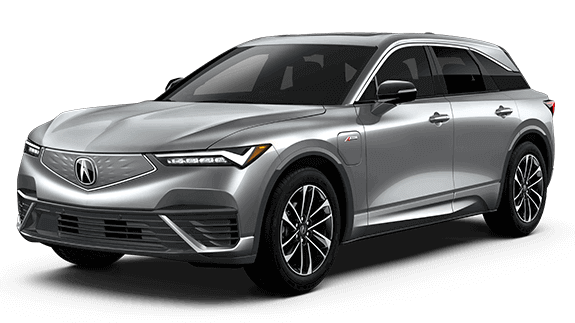
Other research topics
What shoppers are searching for, popular new cars.
- New Acura MDX
- New Chevrolet Bolt EUV
- New Chevrolet Bolt EV
- New Chevrolet Trailblazer
- New Ford Bronco
- New Ford Maverick
- New Ford Mustang Mach-E
- New Honda Accord
- New Honda Civic
- New Honda CR-V
- New Honda HR-V
- New Honda Odyssey
- New Honda Passport
- New Honda Pilot
- New Hyundai Palisade
- New Hyundai Santa Cruz
- New Hyundai Santa Fe
- New Hyundai Tucson
- New Kia Sportage
- New Kia Sportage Hybrid
- New Kia Telluride
- New Lexus NX 350h
- New Lexus RX 350
- New Lexus RX 350h
- New Mazda CX-30
- New Mazda CX-5
- New Mazda CX-50
- New Nissan Rogue
- New Subaru Crosstrek
- New Subaru Forester
- New Subaru Outback
- New Tesla Model 3
- New Tesla Model Y
- New Toyota 4Runner
- New Toyota bZ4X
- New Toyota C-HR
- New Toyota Camry
- New Toyota Camry Hybrid
- New Toyota Corolla
- New Toyota Corolla Cross
- New Toyota Highlander
- New Toyota Highlander Hybrid
- New Toyota Prius
- New Toyota RAV4
- New Toyota RAV4 Hybrid
- New Toyota RAV4 Prime
- New Toyota Sienna
- New Toyota Tacoma
- New Toyota Tundra
- New Toyota Venza
- New Volkswagen Atlas
- New Volkswagen Taos
- New Volkswagen Tiguan
Popular Used Sedans
- Used BMW 5 Series
- Used Chevrolet Impala
- Used Chevrolet Malibu
- Used Chrysler 200
- Used Dodge Charger
- Used Ford Fusion
- Used Ford Taurus
- Used Honda Accord
- Used Honda Civic
- Used Hyundai Elantra
- Used Hyundai Sonata
- Used Tesla Model S
- Used Toyota Camry
- Used Toyota Corolla
- Used Volkswagen Jetta
Popular Used SUVs
- Used Acura MDX
- Used Acura RDX
- Used Ford Edge
- Used Ford Explorer
- Used Honda CR-V
- Used Honda Pilot
- Used Hyundai Santa Fe
- Used Jeep Compass
- Used Lincoln Navigator
- Used Mazda CX-5
- Used Nissan Rogue
- Used Subaru Crosstrek
- Used Subaru Forester
- Used Tesla Model X
- Used Volvo XC90
Popular Used Pickup Trucks
- Used Ford F-150
- Used Nissan Titan
- Used Toyota Tacoma
Popular Used Hatchbacks
- Used Chevrolet Cruze
- Used Ford Focus
- Used Mazda 3
- Used Mazda 6
- Used Subaru Impreza
Popular Used Minivans
- Used Honda Odyssey
- Used Toyota Sienna
Popular Used Coupes
- Used BMW 3 Series
- Used Dodge Challenger
- Used Nissan Altima
Popular Used Wagons
- Used Kia Soul
Join Edmunds
Receive pricing updates, shopping tips & more!
Extended Car Warranties: What You Need to Know
If you've ever owned a vehicle, you've probably been offered an extended warranty. While they may be valuable for some car owners, they can also be confusing, expensive and unnecessary.
If you've ever been a car owner, you've probably been offered an extended warranty or service contract. Sold at car dealerships and by lenders, insurance companies and direct-to-consumer sellers, they're one of the most aggressively marketed products you can buy.
They may be valuable for some car owners. Unfortunately, they can also be expensive, monumentally confusing and often unnecessary.
Protect Your Vehicle from Unexpected Repairs
Once a vehicle's factory warranty expires, you're responsible for the cost of any repairs the car may need, even if a defect or poor workmanship caused the failure. You can protect yourself from the cost of repairs with an extended warranty or service contract, though the added coverage can come with a high price tag.
In this guide, we'll look at what extended warranty plans are, what they cover, where to buy them and more.
What Is an Extended Warranty For a Car?
An extended auto warranty is a contract with a company to cover repairs after a vehicle's factory warranty coverage expires. Extended warranties, sometimes called vehicle service contracts, are extra-cost add-on products that come with price tags ranging from around a thousand to several thousand dollars. In the case of a certified used car , an extended warranty plan goes into effect after its CPO warranty expires.
What Does an Extended Car Warranty Cover?
Extended warranties are available with varying coverage levels that cover different parts of a car. Some nearly mirror the bumper-to-bumper coverage of a new vehicle's original factory warranty, while others are limited to specific vehicle components, such as engines and transmissions (powertrains). Many warranty providers offer various levels of coverage at different price points.
When an extended warranty covers an item, it typically includes the cost of the part and the labor to install it. Unlike an automaker's basic warranty, most extended warranties and vehicle service contracts have deductibles that have to be paid when the repair is made.
Some extended warranty contracts cover periodic maintenance expenses, including oil changes, but most do not.
Types of Extended Warranties
The most common types of extended car warranties are bumper-to-bumper, stated component and powertrain extended warranties.
A bumper-to-bumper extended warranty plan is often referred to as an exclusionary extended warranty. This type of agreement approaches the level of coverage you get with your original factory warranty. It's called an "exclusionary" warranty because it comes with a list of components that are not protected by the coverage.
A stated-component extended warranty, or inclusionary extended warranty, only covers those vehicle components listed in the contract. Inclusionary warranties are typically cheaper than exclusionary warranties. It is critical that you carefully check an inclusionary warranty's list of stated components to ensure that it will take care of common problems with the vehicle you're buying it for.
Powertrain extended warranties cover only the mechanical parts of a vehicle that make it go, such as its engine, transmission, axles and differentials. They don't protect auxiliary systems, including air conditioners or navigation systems.
What Does an Extended Warranty Not Cover?
Like most warranties, extended warranties and vehicle service contracts don't cover routine maintenance, wear items such as tires, brakes or wiper blades, collision damage or damage resulting from lack of maintenance or abuse. You should not expect heavily modified vehicles to be covered.
Depending on the type of vehicle service agreement or extended warranty you buy, certain vehicle systems or components may not be covered. That's an important consideration if your car is outfitted with expensive high-tech wizardry, including complex infotainment systems, driver assistance and safety technologies.
While you typically won't find extended warranty plans that cover your tires, many tire retailers will offer coverage that takes care of certain failures.
What Are Some Benefits of Extended Warranties?
The greatest benefit of an extended warranty is the protection you get from unexpected car repair bills. A transmission replacement can cost $5,000 or more, and many vehicle systems come with replacement costs well above $1,000. Though you have to pay for it, an extended car warranty gives you a more predictable cost of ownership.
As with car prices in general, the cost of fixing cars and the parts required to do so are getting more expensive. High-tech safety systems, infotainment technology and complex engine management computers are expensive items to fix. Unlike the old days, when a repair shop would fix problem parts, today's auto shops increasingly replace pricy modules to correct issues.
Having an extended warranty gives owners peace of mind, especially when they plan to keep their cars a long time past the expiration of the original factory warranty. With more and more buyers taking out exceptionally long car loans, an extended warranty is a hedge against facing an expensive repair bill while still making monthly car payments.
Do Extended Car Warranties Offer Any Fringe Benefits?
Some extended car warranties come with extras, such as roadside assistance and towing to a shop for repairs. The cost of towing your car to an approved garage can run into the hundreds of dollars if you're not covered by either a warranty or some other coverage, such as AAA. In some cases, the warranty company will pay for the roadside assistance directly, while in others, the firm will reimburse you for payments you have to make yourself.
Can I Transfer an Extended Car Warranty?
Many warranties and service contracts can be transferred when you sell your car, but it's important to check your contract to ensure that you can before advertising that your used car has warranty coverage.
Because the coverage and transferability of extended warranties can vary considerably, be sure to check the actual extended warranty contract before you buy a used car with a warranty or vehicle service contract.
Does an Extended Warranty Add Value to My Car?
A used car warranty or vehicle service agreement can add resale value to a used car, but only under certain circumstances. To have value, the service contract needs to be paid for, not subject to additional monthly payments and be transferrable to a new owner. You'll likely find more interest in additional auto warranty coverage from private-party buyers than if you are selling the car to a dealership or trading it in.
In most cases, an extended warranty plan will add far less to the value of a car than you originally paid for the coverage.
When it comes to how your auto insurance company sees an extended warranty, things are a bit different. If you total your car, don't expect additional cash from the insurance adjuster just because you have a service contract or used car warranty. To them, the warranty adds no value.
What Are Some Problems With Extended Warranties?
The biggest risk in buying an extended car warranty or vehicle service contract is that you can spend several thousand dollars and never need to use the coverage. With today's new cars lasting longer than ever, your chances of needing the coverage are fading.
The quality of aftermarket extended car warranty companies and their partners that handle claims is mixed, with some generating thousands of consumer complaints. We can't stress enough the importance of checking out not only the extended auto warranty company but also the company backing its claims.
Used car warranty and service contract providers typically have lists of repair facilities that they allow to accept their coverage. Shops you trust or have a long-time relationship with may not be on that list.
Should I Buy an Extended Car Warranty?
Whether you should or should not buy an extended warranty plan or service contract depends on whether you're willing or able to risk paying for expensive car repairs as your car ages.
If your car requires several costly repairs while you have the warranty, there's a good chance you'll come out ahead. If your vehicle turns out to be reliable, buying an extended warranty would have been a waste of money. The key to deciding is doing the research to make an educated guess about whether you'll need the coverage. That includes looking at a car's predicted reliability rating and exploring owner sites for your model of car to see what kind of problems other owners are having.
Can You Afford to Pay for Repairs Yourself?
The primary reason to buy an extended warranty is to protect yourself from large, unexpected repair bills. If you have a sufficient emergency fund to handle such events, you can probably skip getting an extended warranty altogether.
If you have the ability and discipline to save money each month for unexpected events, it's probably a better idea than buying a used car warranty. Even if you never use your extended warranty, you've still paid the price to buy it. With savings, you can use any unused money as a down payment for your next car or to upgrade to a nicer vehicle.
How Is an Extended Warranty Different Than Car Insurance?
Like the warranty you get when you buy a new car, an extended auto warranty won't cover damage from a collision, theft or road hazards, as auto insurance does. In contrast, your car insurance doesn't protect you from expenses due to failed components or poor workmanship.
You are not required to carry a warranty on your car. In most states, however, you must have auto insurance.
What Is Mechanical Breakdown Insurance?
There is a type of auto insurance that does act in some ways like an extended auto warranty. Mechanical breakdown insurance (MBI), which many auto insurance companies sell, covers the cost of repairing a vehicle that has suffered a major mechanical failure.
Insurance for mechanical breakdowns is generally only available on relatively new cars with low mileage. It usually has deductibles that can be significantly higher than an extended warranty. However, its cost is typically much lower than the cost of a used car warranty or vehicle service agreement.
Most MBI providers require you to have your mechanical breakdown policy in place before your car's basic warranty expires.
How Much Does an Extended Warranty Cost?
Extended car warranties can cost between about $1,000 and $5,000, depending on several factors. They include:
- The vehicle's type, age and mileage
- The type of warranty and the items it covers (Exclusionary, inclusionary or powertrain)
- The deductible for covered repairs
- Where you live
- Where you buy your warranty
- What company is behind the warranty coverage
In addition to the cost of the warranty itself, you'll likely have to pay deductibles for each covered repair. If you choose to finance your extended coverage, which we strongly recommend against, you'll also be paying interest on the cost of the coverage. Tips for Getting the Best Price
Depending on where you buy your warranty, there can be substantial room for negotiating its price. That's especially true if you're considering purchasing a vehicle service contract or warranty through a car dealership. Like many things customers are offered in the dealer's finance office, extended warranties frequently come with high markups.
While the first price offered may seem like a fixed price, it's far from a no-haggle transaction. If you are interested in buying a warranty, suggest half the dealer's price and see where things go from there. The worst they could do is say no, and you always have the option of shopping elsewhere for your coverage.
Whatever you do, don't succumb to the pressure that you have to buy a warranty immediately "or you'll never get as good of a deal again." It is simply not true. It's an old-school sales tactic designed to get you to buy before you have a chance to do your research.
Just like checking our new car rankings and reviews before choosing a new car or reading our guide to auto financing before getting your car loan, you want to research what's available in the extended warranty marketplace. The first question to answer is whether you need one at all.
Factors To Consider With Used Car Warranties
Before you buy a service contract or used car warranty for your vehicle, there are several factors you should think about. Some involve the warranty itself, while others are based on your own financial circumstances.
You need to consider the coverage you want, based on what you can afford and what repairs your vehicle is most likely to need. If your car is filled with high-end electronics, such as advanced safety systems or large touch-screen infotainment setups, your potential for costly repairs is high. A simple powertrain warranty wouldn't cover those items, so you would want more coverage.
The higher the deductible you need to pay each time you make a claim, the lower the price of the warranty should be. If you want a low- or no-deductible plan, be prepared to pay a higher price when you buy the coverage.
With so many options available, it's crucial to shop for the coverage you need at the right price. That means doing research and comparing multiple offers before you buy.
With some warranties, you'll pay upfront with a lump sum. Others require a down payment and monthly payments for the entire term of the contract. Many warranty and service contract providers offer multiple coverage levels with different deductible options, coverage terms and extras (such as roadside assistance).
Where You Can Get Service
Where you can have warranty repairs completed is an important consideration when shopping for coverage. When you buy a vehicle service contract or warranty from an automaker, you'll likely have to take it to one of its franchised new car dealerships for service. On the plus side, when you take your car to a dealership, you have the comfort of knowing it will be serviced by a factory-trained technician.
Independent warranty companies have different policies regarding where your car can be serviced. Some will have long lists that include franchised new car dealers, while others can be much more restrictive. You may need to give up a shop that you've developed a relationship with because it's not on your warranty provider's approved list.
At the very least, you'll want to make sure any warranty you're considering allows you to take your car to more than one local ASE-certified repair facility. You want there to be multiple local options in case you don't like the first shop you go to, or it's impossible to schedule repairs. Like the aftermarket warranty company itself, you want to check out any shop you're considering with the local Better Business Bureau or other local consumer advocacy organization.
How Will The Repairs Be Paid For?
Does the warranty company send payment directly to the auto shop you used, or do you have to pay and wait for them to reimburse you?
You generally want them to work with the shop and send payments directly to them. If you have to pay yourself with a credit card, and the reimbursement from the warranty company doesn't come until after your payment is due, it can put you in a financial pinch. That's assuming you have a high enough limit on your credit card to begin with.
The Model, Age and Mileage of Your Car
Because the price of an extended warranty is based on the model, age and mileage of your car, you'll want to consider whether your vehicle is even worth covering. You'll also want to think about its predicted reliability and the number of high-tech features it has.
It tends to be more expensive to get an extended warranty on luxury cars, older cars and cars with higher mileage. While extended warranties and vehicle service contracts offered by automakers are only available on vehicles with relatively low mileage, packages offered by independent warranty companies are available for much older, higher-mileage vehicles.
You'll want to know the value of your car, so you're not spending thousands of dollars for an extended warranty on a vehicle that's not worth much more than that.
The Reputation of the Company Behind the Warranty
While there are some highly respected extended auto warranty and vehicle service contract companies in the marketplace, not all warranty providers share such a strong reputation. Before you buy, you must check out not only the company whose name is on the contract but also the company that's responsible for assessing and paying the claims.
You can do that research through the Better Business Bureau, which will not only show you the number of complaints against a provider but also (and just as importantly) how the company responded to those complaints. Typing the name of the company and the word "complaints" into your favorite internet search engine can also give you a sense of its reputation.
Some of the largest companies marketing extended warranties and service contracts are merely sellers of the products. A separate warranty administrator does all claims and reimbursement tasks. You can find the name of the administrator in the extended warranty contract.
Unfortunately, extended warranty scams are so common that the Federal Trade Commission has an entire section of its website devoted to auto warranties and vehicle service contracts.
Where Can You Buy an Extended Car Warranty?
There's a joke that says that you don't need to find an extended auto warranty company – they'll find you. When we finally land on Mars, there will probably be a message waiting for us in the dust of the red planet that says "we've been trying to contact you about your car's warranty."
You can buy an extended warranty or vehicle service contract from many sources. Most dealers will offer you several protection products when you buy a new or used car, including additional warranty coverage. Some of the warranty plans sold through dealers are manufacturer backed, while others are independent aftermarket auto warranty companies.
You can also purchase the protection directly from a warranty provider. Some of the largest car warranty providers are CarShield, Autopom!, Protect my Car, Infinite Auto Protection, Carchex and Endurance.
You can also purchase extended warranties and service contracts through auto lenders, such as banks and credit unions, and some auto insurance companies. Though products from third-party sellers may be branded with their company name, it's important to look at the warranty provider and administrator behind the product.
When Can You Buy an Extended Warranty?
The answer to when you can buy an extended warranty depends on who you're buying it from. If you're purchasing a vehicle service agreement or additional warranty coverage from an automaker or an automaker's program through one of their dealers, you typically have to buy it before the manufacturer's original coverage runs out.
There's more flexibility when you're buying extended used car coverage from an independent warranty provider. Many will sell coverage until cars are well over 100,000 miles or several years old.
You do not have to buy extended warranty plans at the same time you buy your new vehicle. There may be substantial pressure to do so, but you have other options.
Is an Extended Warranty a Rip-Off?
While there are many responsible providers of extended warranties, the industry does have some shady players. Avoiding them comes from research and common sense.
Most car owners have received phone calls promoting extended car warranties. It is never a good idea to engage with the agents, as some of the supposed telephone solicitations are actually scammers trying to get information from you that they can use for nefarious reasons. They may even know about your current car and other personal information, but that just means they've been able to find it in publically accessible databases.
An extended warranty or vehicle service contract can also be a rip-off if you pay too much for it or if getting service or reimbursement is difficult or impossible. It can be a good deal if it comes from a reputable company or automaker and you pay an appropriate price for the coverage.
U.S. News takes an unbiased approach to our recommendations. When you use our links to buy products, we may earn a commission but that in no way affects our editorial independence.
Recommended Articles

Which Automaker Has the Best New Car Warranty for 2022?
John M. Vincent Feb. 15, 2022

Alternatives to the Honda CR-V
Erica Puisis April 19, 2024

Oklahoma EV Tax Credits Guide
Cherise Threewitt April 19, 2024

Best Cars for Moms and Dads
Cherise Threewitt April 18, 2024

SUVs With the Most Cargo Space
Warren Clarke April 18, 2024

Alaska EV Tax Credits Guide
NEW ON YOUTUBE: Cash for Clunkers List
Everything You Should Know About Extended Car Warranties
The most important, money-saving information on vehicle service contracts.
austinfracchia
We may earn revenue from the products available on this page and participate in affiliate programs. Learn more ›
If you have ever sat in a dealership confused as the salesperson asks if you want an extended warranty on top of the factory one, don’t worry. You wouldn’t be the first person to wonder what an extended warranty actually is and whether it’s important or not.
The good news is, you don’t have to get confused when trying to understand the basic concepts and little details of extended warranties. You actually don’t need to know all that much to decide if an extended warranty is for you.
In fact, all you really need to know is this:
- An extended car warranty is just the warranty that lasts longer than the factory one. In some cases, it’s the exact same warranty as the factory; in others, it’s something new from a third-party provider.
So, if you want the extra coverage you enjoyed with the factory powertrain and bumper-to-bumper warranty, an extended warranty is the way to go. But what do you actually get with one? Are they really the same as factory warranties? How do you get the best one?
If you are searching for more information, read on for our extended guide that demystifies extended car warranties.
Extended car warranties aren’t something most gearheads spend a lot of time studying. Why review a lengthy service contract when you can spend the time fine-tuning or upgrading your ride? So, even if you have or want an extended warranty, there’s a good chance you don’t know that much about it.
The first thing to remember is that extended warranties are just like any other car warranty. Yes, there are some major differences between factory and extended warranties, but they all do the same basic thing: promise to repair or replace in certain conditions.
This is why it helps to know a thing or two about car warranties in general.
Car Warranties in General
It helps to know what a general car warranty actually is to know why an extended warranty may be beneficial. Automotive manufacturers and dealerships hype up the importance of warranties all the time without explaining what they are. This leads to a lot of confusion and misconceptions about what they actually cover.
On paper, car warranties are pretty simple in concept:
- Car warranties are written promises by the manufacturer or a third-party to repair or replace defects with the vehicle it sells to you.
A car warranty is meant to give you, the customer, some peace of mind. If something goes wrong with the vehicle, especially if it’s new, you have a way to get it fixed. Basic factory warranties, for example, allow you to bring the car to an authorized garage or dealership and get the issue fixed for free.
Warranty Limitations
Of course, things are more complicated than this basic promise because all car warranties have certain limitations. Warranties don’t always cover repairs, and they don’t last forever.
Specific limitations of car warranties can include:
- Scope : Car warranties have certain parts they cover and certain parts they ignore. Known as inclusions (include) and exclusions (ignore), the scope of the warranty affects how much it covers overall. Comprehensive warranties, for example, cover everything between the bumpers. Typical powertrain warranties, on the other hand, only cover the most important parts to a vehicle, things like the drivetrain, engine, and transmission.
- Length : No warranty lasts forever. Factory and extended car warranties have length limits based on length and mileage. For example, common factory warranties last three years or 36,000 miles, whichever comes first. After the length limit is reached, the warranty no longer applies, and a new one will be required if you want to keep your vehicle covered.
- Issues : There is a lot that can go wrong with a vehicle. Car warranties don’t cover everything. If they did, providers would be paying out for every little problem caused by a vehicle’s owner’s need to customize their ride. Instead of everything, car warranties generally spell out what issues and causes they cover together. For reference, typical factory warranties only cover issues related to manufacturing and material defects.
The problem many people find with car warranties is the lack of information to understand what the warranty covers. It’s easy to be surprised when you discover that your car warranty doesn’t cover an issue you thought it did.
This is why it’s always important to know the basics of any warranty, factory or extended. The details of the coverage and the limitations it has will let you know what circumstances the warranty will apply and when you may be paying out-of-pocket.
This is especially true with extended warranties that differ from provider to provider.
Extended Car Warranties
For the most part, extended car warranties act just like any other type of automotive warranty. The promise to fix issues may come from the manufacturer or a third party, but the end result tends to be the same: If something goes wrong, someone will do something about it under the right conditions.
The complication with extended warranties is the different types many dealerships and third parties offer. While there is usually just one factory warranty you get with a new car, your options will grow dramatically if you are searching for an extended warranty.
Even a single manufacturer can have different service plans or extra services to add for an additional cost. Third-party providers tend to offer entire warranty lineups so you can choose the right plan and tailor it to your needs.
This is where an important difference comes in: true extended warranties versus vehicle service contracts:
- (Real) Extended Warranties : If you want the benefits of your factory car warranty to last a bit longer, you will need to go straight to the manufacturer. True extended warranties extend the coverage limits of a factory warranty. If the original warranty lasts three years and 36,000 miles, the automaker may extend it to five years and 60,000 miles. These tend to be rare since a majority of automakers offer other extension options, but some do offer warranties you may be able to extend even before the original runs out.
- Vehicle Service Contracts : Often marketed as an extended warranty, vehicle service contracts are new agreements between you and the automaker or third-party providers. The promise of fixing issues is still there, but this type of contract has nothing to do with the factory warranty. Even if it offers the same coverage and limitations, it’s still a different thing. The benefit of vehicle service contracts is the greater number of options and opportunities you get. Depending on the provider, you can choose from different plans, additions, limitations, and more. This is the most common type of extended warranty.
There are more similarities than differences between the two types of extension options, but it helps to know how they differ. At the very least, this information will help dispel some misconceptions and help you make the best choice for extending your coverage.
The Truth Behind Extended Car Warranties
The differences between true extended warranties and vehicle service contracts are just the tip of the iceberg of things that confuse countless vehicle owners. With so much information that is either conflicting or misleading, it’s easy to buy an extended warranty that won’t actually give you the coverage you want or need.
So, let’s set the record straight about a few things.
Factory Vs. Extended Car Warranties
Most people learn of the major differences between factory and extended warranties when the clock runs out on the original warranty coverage. If you know ahead of time what these differences are, however, you can make a smart decision about what you want to do when the time comes.
Keep in mind, there are plenty of similarities between the two as well. This is why things can be confusing when researching the two. So, to keep them separate, keep these major differences in mind:
- Provider : Factory warranties come strictly from the manufacturer. Like any new product, new cars are covered for a time to address any defects or mistakes made at the factory. Extended warranties can come from the factory, but there are plenty of third-party providers that also have something to offer.
- Coverage Variety : All factory warranties have bumper-to-bumper and powertrain warranties, along with a few variations you don’t choose like seat restraint coverage. Extended warranties, especially third-party plans, can give you more variety in coverage and limits. This makes it easier to personalize your extended warranty coverage to your vehicle and your needs.
- Scope Variety : Unless it’s a factory defect, factory warranties probably won’t cover the cost of a repair or routine service. This is where extended warranties take the cake: Different plans may include coverage for accidents, upgrades, or routine work.
- Restrictions : Factory warranties can be restrictive when it comes to where and when you can get issues fixed. Generally, they won’t accept any mechanic who isn’t manufacturer-approved. The same can be true for factory extended warranties, but third-party providers typically accept a larger number of mechanics, dealerships, and garages.
- Price : It may seem like factory warranties are free with the new car, but the cost is usually just hidden inside the final cost of the vehicle. This means you can pay for it with a loan or with cash, just like a car. Extended warranties have separate costs you will pay either yearly or (sometimes) monthly. This subscription type of payment will last the lifespan of the warranty.
In general, you can get better coverage with an extended warranty over the factory coverage. Some vehicle owners, in fact, choose to include an extended warranty even when the factory coverage is still in effect. That said, whether you should get one or not depends on several factors.
Is an Extended Warranty Necessary?
There is no law saying you need to have an extended warranty to drive on the roads with your vehicle. As long as you have the minimum level of automotive insurance legally required in your area, you can drive as much as you want.
The point of an extended warranty is to save you money—ideally, more money than what you would be spending on costly repairs out-of-pocket. This means an extended warranty can be valuable under certain conditions. For example:
- You have an older vehicle that is going to need more service as it ages.
- You have a newer vehicle that has a history of service needs.
- Your vehicle’s make and model has a history of service needs.
- You want to take advantage of extra perks like roadside assistance through an extended warranty.
- You buy a used vehicle that comes with an extended warranty already.
The challenge with extended warranties is that they aren’t valuable until you need them. Until they kick in and reduce repair costs, you are just spending money on the warranty itself.
That is why we recommend setting a budget and finding an extended warranty plan that balances the costs and coverage you want for you vehicle. It’s important to find a plan that you’ll actually use on a periodic or regular basis.
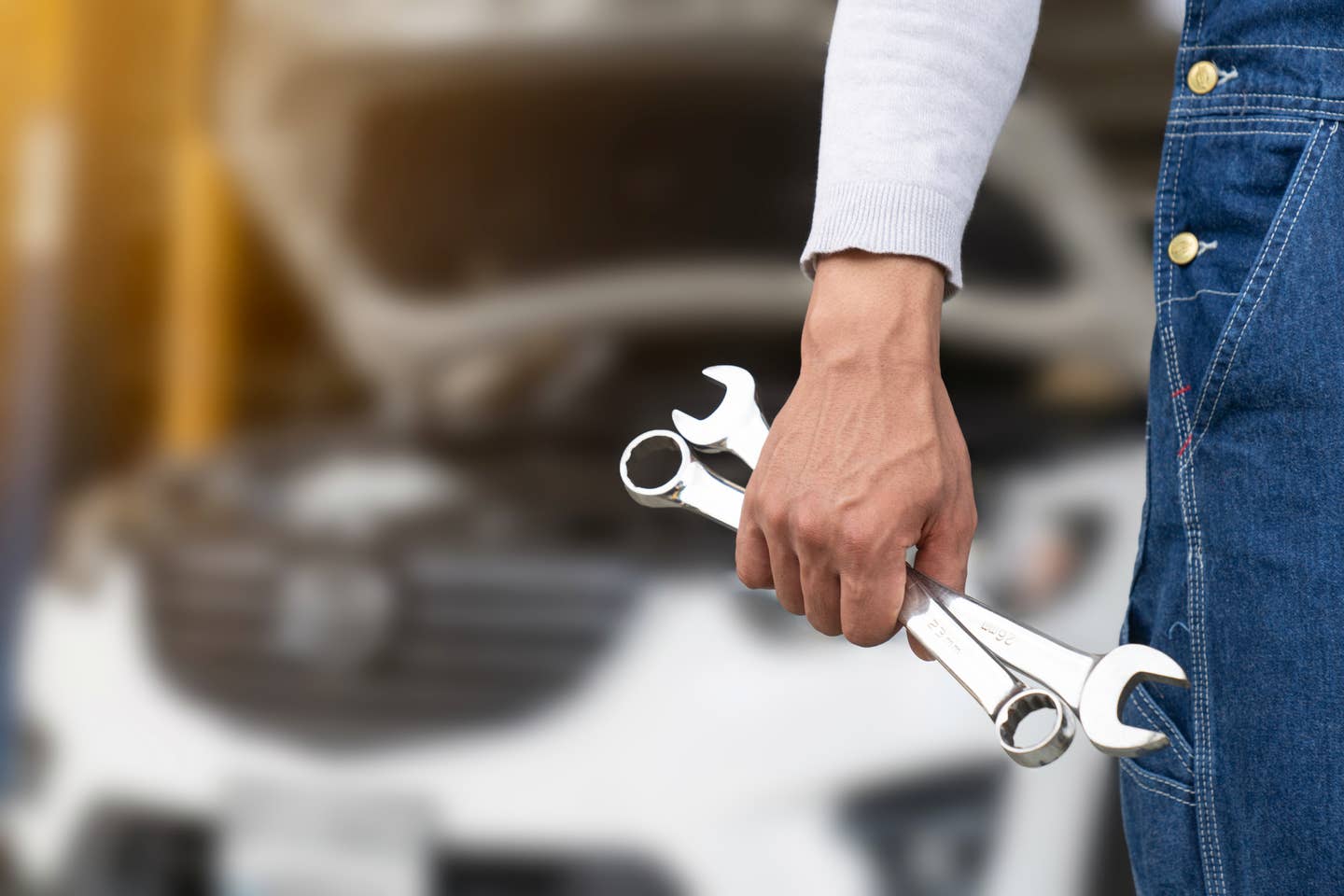
What Extended Warranties Do (and Don’t) Cover
All extended warranty plans are different in terms of what parts and repairs they cover. Some follow fairly strict standards that mimic factory warranties. Others may cover more parts and repairs if the plan is designed to be comprehensive.
Since all warranty plans are different, the best way to compare what they do and don’t cover is by looking at the list of inclusions and exclusions:
- Inclusions : This list breaks down everything that a warranty covers. If a warranty has a lot of exclusions, many providers will include an inclusion list to help you understand what is covered. Some warranty plans are very specific in the inclusion list, detailing the exact parts that are included. You may also find that some providers are more vague with the list by specifying general car components like the engine or drivetrain.
- Exclusions : Sometimes, it’s easier for a provider to just specify what a warranty doesn’t cover. This is where an exclusions list comes into play. Basically the opposite of an inclusion list, the exclusions lay out what parts aren’t covered by the warranty. If you need one of these parts repaired or replaced, you’ll likely have to pay out-of-pocket to get the work done.
In addition to the inclusions and exclusions, you should also look at the scope of the warranty:
- Causes : All problems are caused by something. Extended warranties will limit what types of issue causes they cover. If it’s a traditional factory extended warranty, for example, it’s unlikely to cover anything other than defects caused by the manufacturer. Some extended warranties do a better job of listing out what is and isn’t covered, but you may have to dig around the contract before you sign to get an accurate idea.
How Extended Warranties Work
Extended warranties are typically easy to use, especially compared to auto repair insurance, since there is less (if any) of a claims process. To take advantage of the coverage, however, you need to have it first.
Extended Warranty Costs
One challenge many first-time warranty buyers experience is figuring out the cost of a warranty plan. There is no golden standard for pricing in the extended auto warranty industry. Prices vary between providers, plans, and the individual customer.
The real challenge is the fact that extended warranty costs are extremely dependent on the individual customer and their vehicle. Providers will generally have a price range for each plan and algorithms that factor in different things to determine the final cost to the customer.
These factors can include:
- Type of Car : Some cars are just more expensive to cover with an extended warranty than others. While common types like sedans and trucks don’t vary too much, this depends on the individual providers. Specialty cases like commercial vehicles may call for a higher price or may even require a different warranty plan if commercial use isn’t included in the main plans.
- Age of Car : The age of a vehicle, in terms of both years and mileage, will impact a car’s eligibility in addition to the final cost of the warranty. In general, older vehicles are more expensive to cover. Depending on the automaker and its reputation for reliable vehicles, warranty providers set a price that reflects the likelihood of repairs needed to keep the vehicle running.
- Driving History : Some warranty providers take the vehicle owner’s own driving history into account when determining the final price. It may seem trivial, but the provider considers how well you treat your vehicle and how likely you are to get in an accident. This is common with auto insurance as well, where a good driving history can lower the cost of insurance policies.
- Coverage Scope : The repairs and parts a plan covers can influence the cost a provider feels is required to offer the plan in the first place. Basic plans with small inclusions lists, for example, are generally more affordable. Comprehensive plans tend to be the most expensive, given the large range of parts such plans actually cover. Specialty or uncommon inclusions, like electronics or hybrid drivetrains, can also drive up the cost.
- Length of the Warranty : Simply put, longer warranties are more expensive. If you want to keep an extended warranty for several years or thousands of miles past your vehicle’s current age and odometer, the cost will be higher than a simple, short-term plan. Providers that offer different coverage lengths make it easier to tailor the price to your budget by changing the expiration date.
While extended warranty pricing can seem fairly complicated given the number of factors, there are a few advantages to how things work. First, the large variety of factors give you some room to personalize a plan to fit your budget.
If you don’t need a lengthy coverage period or inclusion list, for example, you can keep costs down by finding a plan that offers minimal coverage. Your own driving history can also make a positive impact.
Second, there may be some room for negotiating the final price with the dealership or third-party provider. Like the price of a vehicle, dealerships have some room to negotiate with factory extended warranties. If you buy a used vehicle from a manufacturer dealership, this is a good time to negotiate.
Beyond decreasing the price of the warranty, negotiating with a dealership can also decrease your interest on an auto loan. Dealerships are allowed to combine the warranty cost with the price of the car so you pay everything at once. If you get an auto loan, you’ll pay interest on both the car and warranty.
Negotiating with third-party providers can be more difficult since it depends on the willingness of the individual company. In fact, getting a good price with a third-party provider typically doesn’t involve negotiating. Instead, it relies on the personalization the provider can offer to you.
Working with a service agent, the best providers make it easy to choose a plan and tailor it to fit within your budget. If a provider doesn’t offer this level of support, we recommend checking out its competitors until you find a company with better customer support.
Finally, you can sometimes drive down the cost of a warranty by shopping for mechanical breakdown or auto repair insurance at the same time. Since auto repair insurance will likely come from a competitor, the warranty provider may take an extra step or two to win your business over the insurance company.
Buying an Extended Warranty
Buying an extended warranty is typically straightforward. If you buy a manufacturer’s extended warranty, you will most likely get it through a local dealership. This is common for used vehicles that aren’t covered by a CPO warranty.
If you purchase a third-party extended warranty, this is usually done online. Third-party options allow you to shop around more and compare different options. Some providers will even give you a free quote to predict how much it will cost.
Getting Repairs Covered
If and when the time comes to get your car repaired, using your extended warranty will involve a claims process to get the repairs approved ahead of time. The warranty provider may deny the claim, in which case you will have to pay out-of-pocket or explore other options. If the repair is in the warranty’s inclusions, however, this is less likely to happen.
Denials can happen for a number of reasons:
- The repair isn’t covered by the warranty.
- The cause of the issue isn’t covered by the warranty.
- Regular maintenance hasn’t been maintained.
- A pre-existing issue wasn’t disclosed at the time of the warranty purchase.
- The issue was caused by modifications to the vehicle.
It helps to keep track of regular maintenance (keep records) and to avoid modifying the vehicle unnecessarily. If you like to tinker with your vehicle or use it for specific purposes like racing, you may need a specialty warranty for coverage.
Once a claim is approved, you can then take your vehicle to an approved auto shop to get the work done. Unlike insurance that typically reimburses you for the repair costs, you likely won’t have to pay anything to an approved auto shop that works with the warranty provider.
Other Things You Should Know
Extended auto warranties can be difficult to understand partly because of the amount and complexity of the information and partly because you don’t know what you don’t know. These information gaps are hard to identify on your own.
So, this section is all about the random things you should know about extended auto warranties that may help you decide if it’s the right option for you and how to find the right one.
Pre-existing Conditions
It can be tempting to buy an extended car warranty when your vehicle actually has some repair work that needs to get done. Why not? If the warranty covers the expense, the amount that you pay for the warranty should be tiny compared to the potential repair cost.
Unfortunately, this logic doesn’t pan out, much to the dismay of uneducated warranty buyers. The problem is that warranties don’t cover pre-existing conditions. In other words, if your vehicle already has some issues with the engine, for example, you won’t be able to use a new warranty to reduce or eliminate the repair costs. Any issue that develops after you have the warranty, however, is fair game if it’s covered.
Warranty providers enforce this pre-existing condition policy by implementing a waiting period after you buy the warranty. Commonly, you have to wait a whole month before you can use the warranty coverage for repair costs. In this time, the provider can see if your vehicle functions normally.
This can feel like a disadvantage since you have to wait to use something you just bought, but there is a silver lining to the waiting period. The average 30-day wait time also tends to include a 30-day, money-back guarantee policy so you can change your mind. The waiting period also eliminates the need and cost of hiring an inspector as well.
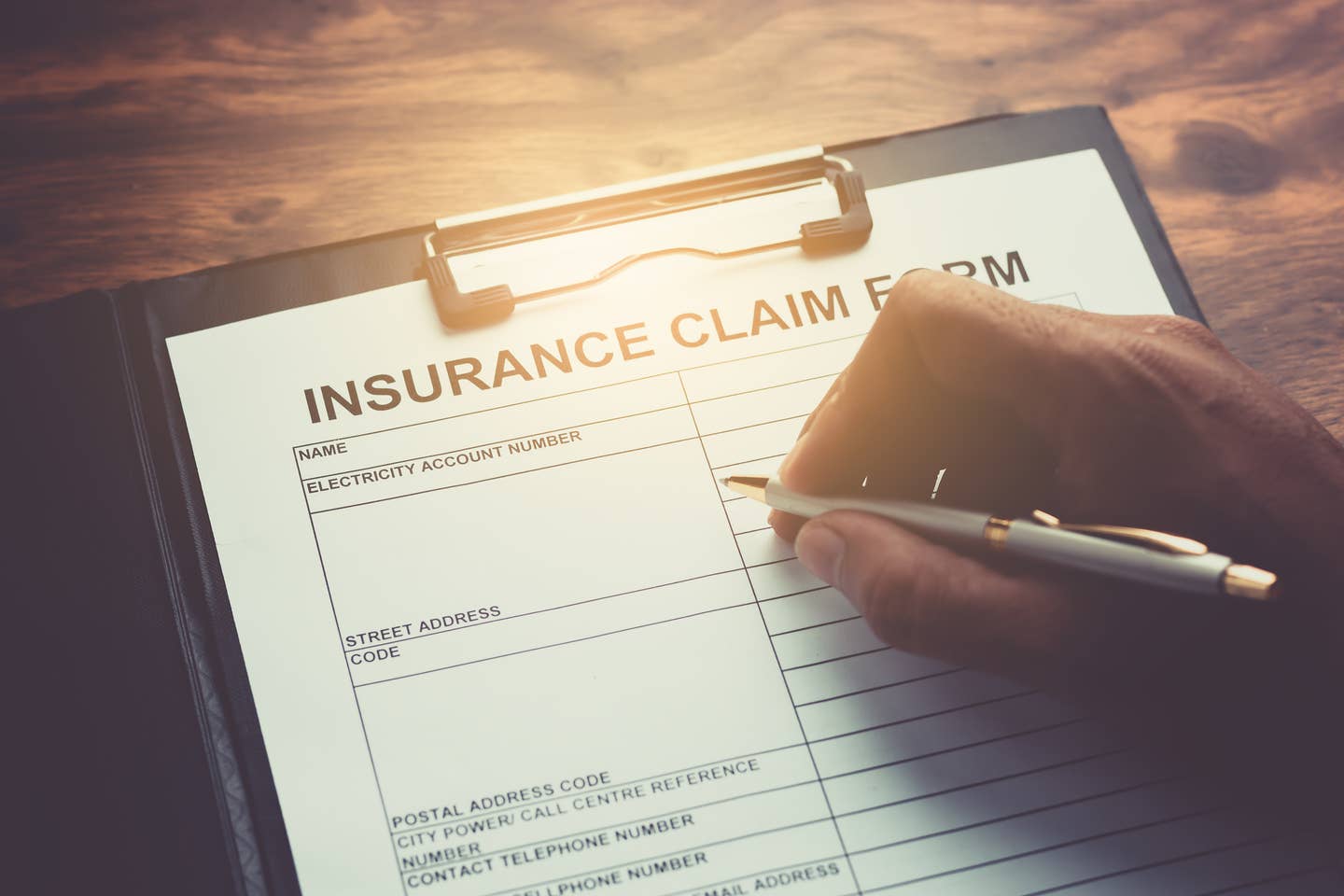
Extended Warranties vs. Auto Insurance
Don’t get confused with auto repair insurance, mechanical breakdown insurance , extended car warranties, and vehicle service contracts. It’s easy to think they are all the same, and some providers even advertise one as the other. In reality, however, these differences can impact your costs and coverage.
The differences you need to remember include:
- Auto Insurance isn’t the same as an extended warranty or mechanical breakdown insurance . Auto insurance gives you basic coverage for medical, legal, and repair expenses when incidents like accidents happen.
- Mechanical breakdown insurance and vehicle service contracts are different . Both of them will cover the cost of repairs under certain conditions, but vehicle service contracts may not be regulated like mechanical breakdown insurance. VSCs also tend to offer higher limits up to 300,000 miles.
- Mechanical breakdown insurance can only be sold through a licensed insurer or broker . Extended warranties can be sold through third-party companies or from the automaker itself.
- Extended warranties are typically better for older vehicles . MBI plans only go up to around 100,000 miles before they expire, meaning older vehicles don’t have many options for auto repair insurance. This is why it’s easier to find a vehicle service contract to cover a vehicle past the 100,000-mile mark.
- Paying for an MBI plan vs. a VSC plan is different . MBI, like all insurance, has a deductible and monthly premiums. VSC plans are generally paid on a yearly basis. Although, some providers do offer monthly payment options.
The bottom line is to know what you are buying when you seeking out coverage options for your vehicle. It’s important to know if you are buying an insurance policy or a vehicle service contract so you can manage your expectations, costs, and needs accordingly.
Maintaining Your Warranty
It’s not uncommon for factory extended warranties to require you to follow a specific maintenance schedule to maintain your coverage. This is done to make sure your vehicle will continue to run, keeping costs low for you and the factory.
It’s important to understand the specific requirements of the scheduled maintenance. Some automakers, for example, will only allow you to get the maintenance work done at an authorized car repair shop or dealership.
The good news is that regular maintenance isn’t time-consuming or costly compared to the price of mechanical repairs. Your local dealership should provide a simple go-to source for any information you need in terms of what work or inspection must be done at what time.
Routine Maintenance Costs
Extended warranties offer a lot of coverage for different types of issues and repairs, but almost all have one major gap: maintenance costs. The same is true for most auto repair insurance policies as well.
When it comes to preventative, routine maintenance, both extended warranties and MBI policies leave it out since they cover mechanical repairs. In other words, if something goes wrong and the issue is covered by the policy, you’re good to go. If you want to prevent an issue from happening with routine maintenance, the expense is on you.
There are certain steps you can take to lower maintenance costs. Doing some of the tasks yourself, like changing your own oil, takes away labor costs. You can also shop around for different prices and deals available at different garages.
You should also keep in mind that routine maintenance is cost-effective in the long run. The more you upkeep your vehicle, the less likely it is to break down in the future.
Finding the Right Extended Warranty
The best way to find the right extended warranty is to think about your needs and research the options ahead of time. The process can be slow while you take the time to consider your options, but it’s not difficult. In fact, all of the work can be done from the comfort of your own home.
Researching and comparing warranty providers is a must. Unless you know what different companies offer, you won’t have the best understanding of what’s available to you. Once you have this information, however, you’ll be in a great position to decide where to spend your money.
The best place to start is by taking stock of your needs out of an extended warranty. The most useless warranty is one that doesn’t cover your needs. So, knowing what they are ahead of time will let you consider different options the smart way.
Buying Scenarios
Your starting point will largely depend on what kind of car you are trying to cover. All vehicles have different needs in terms of service and repair costs they may have. This depends on the make, model, history, and age of the vehicle.
Most people find themselves looking for an extended warranty when buying a used vehicle that has an expired manufacturer’s warranty. This is common for many vehicles older than three years or that have more than 36,000 miles on the engine. While some warranties last longer, these limits are the most common in the industry today.
When you have a used car, this is the perfect time for getting a used car extended warranty . This is especially true when you aren’t quite sure about the condition of the vehicle. If you feel like the car may have some unexpected issues in the future, an extended warranty may be a good blanket.
For used cars, we recommend plans that:
- Offer broad, bumper-to-bumper-like coverage.
- Have high coverage limits (around five years and 100,000 miles for newer used vehicles).
- Have good roadside emergency assistance services.
An extended warranty for a typical used car should cover unknown issues more than anything else. Depending on the age of the vehicle, you may find extra plans like powertrain warranties can also keep the most important parts of a vehicle protected as the vehicle gets older.
High-Mileage Car
Many high-mileage vehicle owners experience difficulties finding warranty coverage once the vehicle hits the 100k-mile mark . At that point, nearly all factory warranties have expired. For extended warranties, the options shrink to third-party providers that have one or two high-mileage plans.
While the pickings get slimmer, the quality of the plans is still high from reputable providers. Better still, these plans are better suited for the issues high-mileage vehicles typically experience when they age, especially around the powertrain. This means you will likely get more use from the right plan.
Make sure a high-mileage plan includes:
- High coverage limits (ideally up to seven years and 250,000 miles).
- Extensive coverage of powertrain components.
- Extra perks, like roadside assistance, free towing to a local repair facility, rental car reimbursement, etc.
The main idea of a high-mileage extended warranty is to cover the vehicle for common issues all older cars develop. A plan that covers these issues will save you money on repairs that can add up in a vehicle’s later years.
At first, it may not make sense to find an extended warranty for a new vehicle. Since all new vehicles come with a factory warranty, what is the point? There is some truth that extended warranties aren’t as valuable for new cars as for older vehicles, but they are still worth considering.
Depending on the plan, extended warranties may cover more issues than the factory warranty itself, especially for things not related to manufacturing and material defects. The extra perks each provider offers may also add some value since factory warranties tend to be bare in extras.
The best extended warranty plans for new cars include:
- Useful extra perks.
- More causes of common vehicle issues.
The decision to buy an extended warranty for a new vehicle is a bit of a coin toss. You aren’t losing out if you don’t have extended coverage, but it might not hurt to have it either. Ultimately, you will have to weigh the cost of a plan against its potential usefulness.
Classic Car
Vintage and antique cars are difficult to get covered with an extended warranty. Most warranty plans cap off the maximum limits at ten years and 250,000 miles. This will automatically disclude any true classic car that is 25 years or older.
Like high-mileage cars, the pickings may be slim, but they do exist. You’ll likely need to find a specialty provider that has a plan designed specifically for old vehicles. Keep in mind, however, these plans tend to only cover newer classic vehicles.
A classic car extended warranty needs to have:
- A high age limit (at least 20 years).
- Extensive powertrain coverage.
It’s worth taking some extra time to research your options for classic car extended warranties because of the lack of options. You may need time to find specialty warranty providers that actually offer a good plan. If nothing shows up, alternatives like classic auto insurance are also available.
Researching Options
Where do you go to actually find different warranty providers? This is something all vehicle owners struggle with when they make the decision to buy an extended warranty. With so many options to consider, it can be a challenge to know who is more reputable than others in the industry.
This is also a challenge we face when writing our warranty reviews. Since we want to provide accurate, helpful reviews to our readers, we take some extra strides to vet the information on each company we review.
As a result, we’ve developed a helpful list of go-to resources and tools you can use. Besides just using your favorite search engine, these resources will often point you in the right direction towards reputable providers. Best of all, these resources will help you compare and assess the providers you find.
Third-Party Sites
It helps to have a third-party resource to get unbiased reviews of different extended warranties and their providers. While provider websites are a good source of plan-specific information, you can’t count on the company to be unbiased when presenting the important information.
This is where third-party sites give you an advantage.
We use a number of third-party reviewers when checking out the latest extended warranty options or new companies that enter into the mix every now and then. A good majority of these sites are solely focused on reviews, meaning they cover a large swathe of services and companies in and out of the automotive space.
Some of our favorites include:
- ConsumerAdvocate: A website focused solely on matching readers with reputable companies (and their goods and services), ConsumerAdvocate takes a transparent approach to evaluating car warranty providers . In addition to hours and hours of research, the company is clear about who it works or advertises with and what kind of steps it takes in its evaluation process.
- ConsumerAffairs: ConsumerAffairs is a unique review site since it actually gathers its own user reviews on products, services, and entire brands or companies. The site also acts as a bridge for customers and companies, inviting both to leave feedback, answer questions, and otherwise interact in a productive way. This means you can find some personal insights and user experiences with different warranty providers here.
- Retirement Living: Don’t let the name fool you. Yes, Retirement Living is targeted at people preparing for or living out their retirement. If you don’t fall into the site’s target demographic, however, there’s still a lot of value to get from its warranty provider reviews . We like this site because it does a good job of comparing competitors and highlighting the strengths and weaknesses of each one.
- Best Company: The thing that Best Company does better than almost anyone else is showing the world how they review companies. Skipping the usual “pay-to-play” model where review sites force companies to spend more to rank higher, Best Company makes it clear how user reviews, company input, and industry expertise all factor into the final ranking, including reviews on auto warranty providers .
- Better Business Bureau: There is no more extensive resource than the Better Business Bureau. The BBB does a good job of rating companies on an individual basis. While you won’t find too many comparison reviews, its individual auto warranty lists are a great resource for finding local providers you can trust.
As you research different warranty providers, we recommend using as many of these resources as possible. Having a single independent take on warranty providers is great, but multiple reviews will give you a larger picture of what users and review sites like or dislike about them.
Different third-party sites also tend to have different review processes or areas that they consider. In other words, you’ll get a more in-depth understanding of a third-party provider through multiple reviews that look at different things.
Provider Websites
While we don’t recommend using provider sites for assessing a company’s reputation or customer service, they are invaluable for finding plan-specific information. In fact, there’s no better resource for plan information than the actual provider itself.
All great third-party providers have a website that lists out the available plans and coverage/limitation details. If a provider doesn’t offer this information in a clear and understandable way, it’s probably best to avoid them altogether, since it’s important to have the details upfront.
The best sites also have a free quote option, so you can get information that is personalized to you. Since plan costs are always dependent on your specific vehicle, driving history, and other factors, a free quote can give you a better idea of what you might pay personally. It’s also the only reliable way to compare the prices of different plans.
What does an automotive news site have to do with researching extended car warranties? We like to think a lot. At The Drive , we often look beyond the fancy, speedy cars to research and review the accessories and policies that make them better. The same goes for factory and extended warranties.
One thing that we like to do differently is to look closer at individual warranty plans. You’ll find a number of our in-depth reviews around the site for both factory and extended warranty options. If you want to know exactly what you’ll get with a Dodge warranty , for example, we have you covered.
As you continue to research your extended warranty options, check out these in-depth reviews to get a sense of the specific details and major differences between these options. You can also use our large swathe of warranty informational content to learn the things automakers aren’t telling you about their warranties.
Comparing Providers
If your research goes well, you will likely have a number of warranty providers to consider in addition to the individual plans each provider offers. We recommend taking some time to compare each provider before looking at individual plans so you know you are going with a reputable company.
More importantly, you’ll also know you are going with a customer-friendly company. Extended warranty providers are usually the first point of contact when you have an issue you want to fix under the warranty.
In general, you need to ask:
- Who is the provider? This may seem straightforward, but many people buy an extended warranty without thinking about where it actually comes from. It’s important to research who the provider actually is. More importantly, you should know if you are buying the warranty from the administrator itself or from a broker. This will let you know who to talk to if issues with the warranty come up in the future.
While some warranty providers just pass you along to the administrator of the warranty, the best help you every step of the way, especially if they offer their own plans directly. This is why it pays to take the time to look at warranty providers in-depth.
When checking out a warranty provider, consider the following:
- Broker/Administrator Relationship : One thing most people don’t know about extended warranty providers is the fact that a good majority sell warranties indirectly. In other words, these providers are just middlemen between customers and warranty administrators, the companies that actually own and maintain the warranty service. These are also the companies you will ultimately contact when you need service completed. We recommend considering providers that either sell their own plans directly (cutting out the middleman) or that at least partner with reputable administrators that are well-known in the industry.
- Plan Selection : The number and type of plans a provider has will dictate how likely you’ll be to find something that fits your needs with them. More plans means more options, but this isn’t always the best thing. A plan needs to have the coverage you need and the limitations you can live with. So, even if a company doesn’t have a large selection of plans, if it has one that’s right for you, that’s good enough in the end.
- Reputation : A third-party warranty provider is just like any other company selling a product or service. Some companies are better than others when it comes to the quality of these products and services. It’s helpful to look at a provider’s reputation among experts and customers. Pay attention to the things people like or dislike about the provider or what makes the provider stand out (good or bad). Quite often, people’s impressions about a company come from personal experiences.
- Customer Service : Taking advantage of a warranty means you will have to communicate with someone from a warranty provider or administrator at some point. Good customer service makes a major difference when you need to get help quickly. Even when a provider is just a broker between the customer and administrator, it helps to have good service to connect you with someone from the administrator. The basics of good customer service include clear points of contact (website, phone number, email, social media, etc.) and knowledgeable service people who have experience with common problems.
- Size : The size and scale of a company isn’t as important as the service and quality they offer, but these qualities can help you get a sense of a company overall. Larger providers, for example, tend to offer more plans, deal with more customers, and work with more administrators. This can be good in terms of options but may make it difficult to get quality customer service help quickly. Smaller companies are more limited in plan offerings but generally have a more personal touch and some specialty plans the big players don’t offer.
A company’s website is a good place to start to begin assessing some of these qualities. You can get a sense of the company’s size and plan selection just from the website alone. Third-party review sites can also help with assessing a company’s reputation and user experiences with the plans.
We like to get in touch with third-party providers as well. Speaking with someone from a company’s customer support will give you an idea of how difficult or easy it is to get in touch with a human and receive important information quickly.
Finally, keep in mind that no company will be perfect. There’s also no golden, foolproof approach to assessing companies. You may find that a company looks good on paper but just doesn’t quite “hit” you right. So, pay attention to your gut feeling in addition to everything you find.
Comparing Plans
At some point, you will need to actually sit down and start considering different warranty options. In other words, you need a few plans to really look at and compare against each other. This way, you’ll begin to see the similarities and differences between different options and which one makes more sense for you.
Comparing warranty plans can be relatively straightforward if options are drastically different, but expect to do a little digging for similar plans. When plans have a coverage or limitations, for example, they can appear almost equal until you look at the minute details in the inclusions or exclusions.
Here are a few points you can check out to compare different plans:
- Type : The warranty type is determined by the coverage and limitations of the plan, so it offers a good big-picture view of what different plans offer. If you are looking for a basic warranty that mimics something that comes from the factory, comparing the type of warranty is a good way to assess different plans. Many plans, for example, have the same inclusions as typical comprehensive or powertrain warranties. Others may be customized for high-mileage vehicles, classic cars, or other specialty uses.
- Issue Coverage : In order for a warranty to cover a repair, it needs to include the issue and its cause as well. Outside of factory warranties that only cover common manufacturing defects, you will find many plans with different issues they cover. Choosing one plan over another can come down to selecting the one that covers the issues you may encounter the most.
- Limitations : The basic length of a warranty in terms of age and mileage determines how long you can use the warranty coverage before it expires. Comparing two plans isn’t as simple as picking the longest warranty, however. This comparison partly depends on the age of your vehicle and how long and often you can realistically use the warranty.
- Inclusions/Exclusions : For nitty-gritty plan comparisons, you will likely find the minute differences in the inclusion and exclusion lists. This is a simple but lengthy way to compare different plans: If one plan covers a part that the other doesn’t, you may have a winner. In general, we don’t recommend basing your decision solely on the inclusion and exclusion differences since the quality of the coverage and provider are all important, but it can be helpful when plans look equal.
Like warranty providers, comparing different plans may come down to minute details or the gut feeling you have with one over another. The best plans fit your specific vehicular needs, so take your time to really consider your options if possible.
Making the Final Decision
For some people, choosing an extended auto warranty is a simple matter; some choices can be obviously better than others or one plan just might hit all of the checkmarks the vehicle owner has. For others, however, the decision isn’t so easy.
Most people find the choice difficult when the plans are similar enough that there’s no clear winner. This is extremely common with typical extended warranties that mimic factory powertrain and comprehensive options.
If you find yourself struggling to figure out what the best option is, there are a few steps you can take to really make the decision clear:
- Prioritize inclusions and exclusions . If comparing the included and discluded components between plans doesn’t give you enough information to make a decision, the next step is to prioritize which components are most important to keep your vehicle running. It’s common to prioritize powertrain parts since a vehicle can’t keep going without a functioning engine, drivetrain, or transmission. You can also prioritize parts based on what’s actually in your vehicle to choose one plan over another. If you have extensive electronics (i.e. infotainment console or built-in navigation), for example, plans that cover these components may be more attractive than others.
- Compare quotes . Price comparisons have been a go-to solution for shoppers weighing different choices for centuries. For auto warranties, comparing the costs will help you stay within your budget and understand how each provider approaches the pricing. It’s hard to compare the prices of multiple plans until you have a set of free quotes in hand that apply directly to you. Getting these quotes is easier once you have two or three plans you are considering, so it’s best to do this after you have done the bulk of your research.
- Talk with service agents . It’s natural to have more questions or need more information than a provider’s website can provide. This is why talking with a real human being can be helpful. Service agents are the best resource for questions that help you understand the specifics of a particular plan. The helpfulness of a service agent is also a good representation of the provider itself. If an agent just tries to keep selling you a plan without giving you the information you need, the company probably isn’t worth your time. If they listen to your questions and actually directly and thoroughly answer them, this is a good sign the company has your interests in mind.
It’s important to have as much information as you need to feel like you understand the warranty options available to you. This way, you are more likely to feel confident in your decision and won’t be surprised by unexpected details or limitations that may come up when you need to apply your warranty.
Alternatives and Additions to Extended Warranties
It can be difficult to realize it given the different names, terms, and conditions, but there are actually other options to keep your vehicle covered when mechanical repairs are necessary. More importantly, you can use many of these alternatives in addition to an extended warranty for extra coverage.
Keep in mind that no solution will cover your whole car in all events and scenarios. So, it’s helpful to know how these options differ from each other to get the best coverage for your vehicle.

Auto Insurance
All vehicles operating legally on the road have some form of automotive insurance as a basic level of coverage. Auto insurance tends to kick in when accidents happen to address costs related to mechanical repairs, litigation, and medical issues.
The tricky thing with auto insurance is that it comes in several different forms that you can stack on top of each other for different levels of coverage. Some forms cover mechanical repairs, but others have nothing to do with fixing a car.
The types of auto insurance that cover certain vehicle repairs are:
- Collision : This coverage kicks in when your vehicle experiences damage after a collision with a car or another object (i.e. guardrail or wall) when you are at fault. Many coverage policies also cover damage caused by the driving conditions like unseen potholes. This coverage doesn’t, however, cover defects, mechanical failure, or normal wear and tear.
- Comprehensive : Going beyond mere collisions, comprehensive auto insurance covers your vehicle from damage caused by other uncontrollable incidents. Fire, flood, vandalism, hail, and falling rocks and trees are all usually covered under this type of auto insurance. Once again, comprehensive insurance doesn’t extend to mechanical failures or the wear and tear that develops as a vehicle ages.
- Glass Coverage : Focused on the windows of a vehicle, glass coverage covers repairs and replacements for the windshield, side windows, rear windows, and even sunroofs.
For reference, the most common forms of auto insurance that don’t involve vehicle repairs are:
- Liability : This is the most basic form of auto insurance that most states require you to have in order to drive. Liability insurance covers things like property damage and medical and legal costs caused by your vehicle (whether you are driving it or not). It typically pays out to others, protecting you from having to pay out-of-pocket.
- Personal Injury Protection : If you or any passengers get injured in your car, this protection will reimburse you the costs of medical expenses. Some insurance policies also cover lost wages and random expenses related to your physical recovery period.
- Uninsured Motorist Coverage : In the event that you get into an accident caused by an uninsured motorist, this type of coverage will reimburse you for expenses normally covered by another’s insurance plan. This coverage also kicks in in the event of a hit-and-run where the responsible party is unknown. Related to uninsured motorist coverage, some providers also offer underinsured motorist coverage for when another driver has insurance but lacks adequate coverage.
As stated above, any car driving legally will have some form of auto insurance. Unfortunately, none of these coverages will help if your vehicle experiences issues with normal aging or work that you’ve done on the vehicle.
Mechanical Breakdown Insurance
Mechanical breakdown insurance (MBI) , also known as auto repair insurance, is a type of vehicle protection insurance policy that actually gets closer to the coverage of an extended warranty than normal auto insurance. Some people choose MBI over an extended warranty or in addition to a warranty because of the extra coverage.
The first thing to know is that MBI isn’t normal auto insurance. Instead of covering medical, legal, or incident-related vehicle repairs, MBI kicks in when a vehicle experiences unexpected issues. This means you don’t have to be in an accident to get use out of an MBI policy.
Other important details about MBI include:
- You will have a deductible . Like other forms of insurance, most MBI plans have a certain amount of money you’ll need to pay before the insurance takes over. This amount is known as a deductible, and it varies from plan to plan. Usually, this range is between $0 and $500.
- You pay on-the-go . Unlike extended warranties that tend to get paid on a yearly basis (unless the provider has a monthly plan) or all upfront with a vehicle purchase, MBI has monthly insurance premiums. This means you will pay a fixed price each month for as long as you keep the insurance policy or until it expires.
- You will likely be reimbursed for costs. If you need to cover mechanical repair costs with your insurance policy, you’ll likely pay out-of-pocket initially and then file a claim with the insurance company. If the company approves the request, they will then pay you back. This differs from most extended warranty providers that cover the costs from the very start if you get work done at an approved garage or dealership.
- You can cancel at any time . There are rarely any minimum time or mileage periods that you are required to have with an MBI policy. Since MBI isn’t legally required in order to drive your vehicle, you can have, keep, or cancel the insurance policy whenever you want.
- Not all cars are eligible . Like many extended auto warranties, cars have to qualify for MBI. Many insurance providers favor newer vehicles that are under 15 months old and have under 15,000 miles on the engine. Some providers, however, offer insurance plans geared for older or even classic vehicles.
DIY Maintenance
We don’t recommend trying to tackle major mechanical repairs on your own, but routine DIY maintenance can actually save you a lot of money on future, major issues. Small things like regular oil and filter changes keep things running smoothly.
More importantly, regular maintenance is also likely required to keep your warranty. Many warranties require a maintenance schedule to rule out issues developing from improper maintenance of the vehicle.
Despite the complexity of major components like the engine and drivetrain, there are actually plenty of things you can do in your own garage. These include:
- Basic inspections : The easiest thing to do with your vehicle is a periodic once-over to try and catch anything that looks out of the ordinary. Typically, anything that doesn't look or sound natural probably isn’t and can be an early warning sign of a major issue that’s developing. The process of inspecting your vehicle is easy: start at one end and work your way to the other. Check out the air pressure, tire treads, body panels, windows, under the hood, etc. Listen to your car from the outside as it runs as well.
- Check/replace the oil and oil filter : If there is one thing most people learn (or should learn) how to do early on, it’s changing the oil. While you can get it changed at a local garage, you’ll always be paying more or receiving the budget oil. Oil changes regularly keep the engine and its components running smoothly while reducing wear and tear. You can check the oil using the dipstick or the car’s built-in electronic gauge to see if the oil needs changing. Some people also maintain a routine replacement schedule every 5,000 or 10,000 miles.
- Check and replace fluids : There are many fluids around the vehicle that allow it to operate safely and need to be changed periodically. The antifreeze and wiper fluids are the two that should be more frequently replaced. The power steering and coolant fluids are less common to change but should be checked regularly. In fact, learning to check the various fluid levels in the vehicle is an important skill to have when inspecting your vehicle. Most fluids are accessible through the engine bay.
- Check and replace air filters : Modern vehicles use various filters to clean out the air inside the engine and cabin. Cleaning the air keeps the cabin comfortable and the engine running smoothly. Most vehicle manuals list out when you should replace each filter since they get dirty and less effective over time. These filters are usually accessible enough to check and replace if necessary.
- Replace the spark plugs : The spark plugs are one of the key components of any engine, igniting the fuel/air mixture to produce the energy needed to drive the crankshaft. Over time, spark plugs get worn out and will need to be replaced. This is something you can do in your own garage with the right tools and skills, but be sure to follow the manual’s recommendations and instructions.
- Swap the windshield wipers : If you are looking for an easy maintenance task that doesn’t require specialized tools or skills, replacing your windshield wipers fits the bill. Like other wear parts on a vehicle, windshield wipers degrade around the rubber edges. Over time, you’ll start to notice streaks or hear squeaks as this wear progresses. Most windshield wipers are designed to pop right off so you can easily replace them when the time comes.
- Maintain the battery : The 12-volt battery in your car will eventually wear out to the point that it can no longer hold a charge, but there are several steps you can take to maximize its lifespan. Basic checks for leakages and mineral buildup are important to make sure the battery is in working condition. If you have a low battery, a charger can help to bring it back up to an optimal power level. If you do have to replace the battery, this process simply involves swapping it out and connecting the cables to the right terminals.
There are certain things you can’t inspect or maintain on your own, but this list covers a good majority of steps you can take to reduce maintenance and future repair costs. As long as your warranty provider doesn’t rule out DIY maintenance, these steps will also keep your provider happy with the condition of your vehicle.
Q. What is the average price of an extended warranty?
A. Prices can range between $350 to $1,000 a year on average. This is a wide range since prices vary widely between providers and the individual plans they offer. Pricing depends on the vehicle type, vehicle condition, your driving history, and the particulars of the plan. Getting a free quote and speaking with a service agent are the best ways to know the exact price you’ll pay for your warranty.
Q. Can I negotiate my extended car warranty?
A. Warranties from the factory tend to be open to negotiation in terms of price. You can haggle with the dealership to get the price lowered, but we recommend doing this after you have negotiated the price of the vehicle. Third-party extended warranties don’t have as much room for negotiation, but many providers make it easy to personalize the plan that fits your particular budget.
Q. Can I get an extended car warranty through my insurance provider?
A. Most likely, no. Insurance providers deal with insurance policies instead of true extended car warranties like you’d get from the factory. You can probably find a good mechanical breakdown insurance policy, however, that covers a lot of the same issues and even offers more perks like roadside assistance. Many major and certain specialty insurance providers offer different MBI plans for different vehicles and uses.
Q. Can I get an extended warranty on a new car?
A. Yes. In fact, some dealerships try to sell you an extended warranty even when you don’t really need it for a new vehicle purchase. If you want the extra coverage, we generally recommend seeking out a third-party warranty that will include different components and extra perks the extended factory warranty will likely lack.
Q. Can I add an extended warranty if the factory warranty has long expired?
A. If your car meets the eligibility requirements of a particular warranty plan, yes. Most providers don’t require continuous warranty coverage. Instead, your vehicle will have to be under the age and mileage limits of the plan and be in a satisfactory condition for coverage. All providers and many plans have different requirements, so it pays to shop around before you apply for a particular warranty.
Q. When should I consider a factory extended warranty?
A. While third-party extended warranties generally give you more options and extra perks, factory extended warranties shouldn’t be ignored. If you are satisfied with your car’s factory warranty coverage and just want to expand it past its original expiration date, this is the perfect time to check out the manufacturer’s extension options.


IMAGES
COMMENTS
The warranty name is ProTrek. I understand there are varying opinions on whether Extended Warranties are worthwhile. In this case, I'd like to hear any experience anyone has had that did decide to get a ProTrek warranty. Thanks for any help you can provide. Kim. 06 Tiffin Phaeton 35DH. Jan 4, 2013.
ProTrek Extended Service Agreement. Mission Statement: Supporting thoughtful exchange of knowledge, values and experience among RV enthusiasts. I have read several threads on "extended service contracts", some good, some not so good and of coarse those that suggest, "save your money" in a rainy day account. I've narrowed my search down to two ...
We Have You Covered. Whether you're coming in for a Lifetime RV Roof, repair work, extended warranty work, or just parts and accessories. We promise that you will be completely satisfied, with our products and service to ensure your peace of mind. Our parts are name brand and quality parts only.
Mission Statement: Supporting thoughtful exchange of knowledge, values and experience among RV enthusiasts. Any Problems with ProTrek and Wholesale warranties? We have had a very bad experience with ProTrek a company brokered by Wholesale warranties. ProTrek is a group set up by SouthwestRe.The program is insured by Dealers Assurance company.
This was discovered just before the factory warranty expired and was therefore covered by the original manufacturer. But the RV extended warranty company guaranteed that they would cover it if the manufacturer didn't. 2020: $855.71 Bathroom door latch, replace max air fan, and replace propane regulator.
Vehicle Service Contracts. Dealer Alliance vehicle service contracts (VSC) are available with roadside or non-roadside options, and offer a variety of New, Extended Eligibility, Wrap and Pre-Owned programs, available to Franchise and Independent Dealers nation-wide. We also offer High Mileage and a variety of Limited Warranty programs.
In December of 2013 I purchased the 3 year extended warranty Protrek policy through Wholesale Warranties after researching and getting quotes from several extended warranty companies. I had my first claim in January of this year and my experience with them went very well. I highly recommend Wholesale Warranties.
My original ext warranty is about to run out in Mar '15. We're looking for a new company. Has anybody done business with Protrek and how was the experience? - 1577402
Both new and pre-owned RVs can qualify for an RV extended warranty from Wholesale Warranties. Motorhomes must be less than 20 model years old with less than 100,000 miles. Towable RVs must be 15 model years old or newer.
To give you an idea of First Automotive warranty costs, we researched what other customers have paid. One driver reported paying $3,000 for a five-year/60,000-mile warranty on a 2014 Chevy ...
Location: Elk Grove, CA. Posts: 3,572. Another approach to this is to purchase an extended warranty from a reputable company for a relatively short period of time in order to cover yourself for an existing problem missed during the purchase process. Consider a relatively high deductible with good coverage thereafter.
America's RV Warranty. Accepts Mobile Mechanic Repairs. 4 Plans to Meet Any Coverage Needs. Coverage Available in All 50 States and Canada. US-Based Dedicated Account Management. Backed By A Rated Insurance Carrier. More Features. Get A Free Quote. 877-273-5217.
Service Contracts can be purchased anytime prior to the expiration of your manufacturers labor warranty. Products with more than a 1 year labor warranty must purchase service plan within the first year. The manufacturers warranty begins on your original purchase date. To purchase your extended service plan, call us at 1-866-538-6117.
Suggest you call them for a quote on your rig, either Pro-Tek or some other insurer. Better have your heart-attack meds handy, though. Extended warranties are designed to make money. Read every last word on the contract. I had one that required the oil to be changed every 3700 miles to have the engine covered.
An extended warranty protects recreational vehicle owners from unexpected costs when something breaks down. RV repairs can be expensive. Our warranties offer peace of mind by covering those repair costs and getting you back on the road. We cover all the essential mechanical components, systems, and appliances that keep your vehicle functioning ...
As a bonus to their warranty plans, Good Sam offers lodging and meal benefits - up to $100 a day for 5 days, plus $60 a day for 5 days for car rental by motorhome owners. Good Sam also offers free RV inspections at Camping World SuperCenters as often as necessary for contract buyers.
An extended warranty is actually an insurance policy on your vehicle, a safeguard against expensive, unforeseen repairs. It covers repairs for an agreed-upon period of time and miles. True ...
Extended car warranties can cost between about $1,000 and $5,000, depending on several factors. They include: The vehicle's type, age and mileage. The type of warranty and the items it covers (Exclusionary, inclusionary or powertrain) The deductible for covered repairs. Where you live. Where you buy your warranty.
Factory and extended car warranties have length limits based on length and mileage. For example, common factory warranties last three years or 36,000 miles, whichever comes first. After the length ...
Check Price. ×. Motor1 Reviews Team Take: The best extended car warranty is offered by Endurance. The company offers the widest range of protection plans and was awarded Best Coverage by our team ...
Recently traded campers and Cancelled the extended warranty. Took right at 7 weeks to get the check 06-18-2019, 07:36 PM ttavasc. Senior Member . Ford Super Duty Owner Outdoors RV Owners Club Jayco Owners Club. Join Date: Jun 2018. Location: Auburn, WA. Posts: 724
AutoPom. 866-559-5428. Get Free Quote. On Autopom's Website. Here are the three best extended warranty plans for 2024: 1. Olive. Olive is a somewhat new company in the extended warranty game, but ...